[120] Wentworth
Miller Travels Around The World (11/30/2006)
On November 16, 2006, the Chinese newspaper Youth
Weekend published some photographs about global advertising for the
American television series Prison Break starring Wentworth
Miller. The newspaper noted that a Fujian hospital is using the image
Wentworth Miller to advertise its treatment services for male prostate
problems.

On November 18, 2006, the article was translated here at this
blog with some more
photographs of Prison Break ads being added.
Soon a number of overseas website picked the story up, including Kaiju
Shakedown (on November 28, 2006). (see also Agent
Bedhead, Defamer)
On November 30, 2006, Apple
Daily has an article on this story. Here is the last
paragraph: "Based upon Wentworth's current popularity, he could easily
get a few million American dollars for an ad. So how did he become an
ambassador for prostate diseases? It is likely that he does not know
about it. But over the last two days, foreign entertainment websites
are covering this story widely. So it is likely that the Fujian Guliu
Hospital may be sued if they keep using this ad."
[119] The Decline of American Elitism (11/30/2006) (Observe China; essay by Cao Changqing)
[in partial translation]
There are any number of theories about democracy. Simply put, democracy is about giving the people to choose through periodic fair elections . An important factor in election is public opinion, and the most important channel that includes public opinion is "media." Just about everyone uses television, newspapers, radio and the increasingly popular news websites.
... There have been tremendous changes in the American media recently ... especially among the left-wing newspapers ...
Of the daily circulation at the four top newspapers, the right-wing The Wall Street Journal fell 1.9% while retaining the position of top newspaper (2.04 million). Although USA TODAY has 2.27 million in circulation, many are gift copies at hotels and it is not considered a "serious newspaper" because it is more about sports and entertainment. The left-wing New York Times fell 3.5% to 1.08 million copies, just over half of the number at The Wall Street Journal. The Los Angeles Times, which is even more left-wing that the New York Times, fell 8% to 770,000 copies. The center-left Washington Post fell 3.3% to 650,000 copies. The other three left-wing newspapers in the top 10 also went down. Miami Herald fell 8.8% to 260,000; the San Francisco Chronicle fell 5.3% to 370,000; the Boston Globe fell 6.7% to 380,000. Meanwhile conservative media tycoon Rupert Murdoch's New York Post continued to perform well, increasing 6.1% to 700,000 and surpassing the Washington Post to become the fifth largest newspaper in the United States.
For the record, here are the data on September 30, 2006 from the Audit Bureau of Circulation (ABC's FAS-FAX ending September 30, 2006):
1. USA TODAY, 2,549,252
2. The Wall Street Journal, 2,047,127
3. New York Times, 1,623,697
4. Los Angeles Times, 1,172,005
5. Denver Post/Rocky Mountain News, 1,039,340
6. Chicago Tribune, 937,907
7. Washington Post, 930,619
8. New York Daily News, 780,196
9. New York Post, 708,561
10. Houston Chronicle, 692,586You can try to reconcile these numbers with Cao Changqing's article. (Please compare the numbers carefully!!!) Here is a question: Even if you decided to write an article about the ascendancy of the right-wing newspapers over their left-wing rivals, could you have conceivably written the article above (given the Audit Bureau of Circulations data)?
The facts are: the numbers for the right-wing Wall Street Journal and New York Post are exactly what the ABC numbers are, but the numbers for the 'left-wing' New York Times and Los Angeles Times and the 'central/left-wing' Washington Post are way understated. Cao Changqing must be reading a different set of books altogether. And he fails to mention that the New York Daily News is ahead of the New York Post, and neither NYDN nor NYP could possibly be considered as "serious newspapers" just as USA TODAY is not. Still, this is the kind of stuff that passes as a meaningful analysis of American media.P.S. Someone asked: "So who is Cao Changqing?" I refer you to Clean Government Is Not A Core Value For Democracy for an illustration. There's much much much more about Cao Changqing but you can look it up yourself. Such is the tristesse of the so-called independent overseas Chinese media.
[118] Michael
Chang and Ding Junhui (11/30/2006) (Apple
Daily; column of Kong Jiesheng) Ding Junhui is China's snooker
prodigy. Previously, he said: "How shall I choose between the
Asian Games at Doha versus the British Open? I would choose the latter
because the level of competition is a lot higher." This angered
Chinese sports officials who accused him of "ignoring national
interests and therefore quite irresponsible!"
Unlike NBA star Yao Ming and track star Liu Xiang, Ding Junhui did not come
out of the national sports program in China. Previously, he had
already won an Asian Games gold for China. This time, China Youth
Daily wrote: "Although Ding Junhui was not nurtured under the national
system, who would know him if he were not a Chinese national?"
The article then went on to invoke tennis player Michael Chang. The
latter is a Chinese American, but the Chinese treats him as an outsider
while the mainstream American society marginalized him. The article
claimed: "That was because he did not have a true motherland."
A few days ago, Michael Chang offered his services to the China Tennis
Association to train the 2008 Beijing Olympics female tennis players.
His offer was rejected by the association officials.
Why wouldn't they accept Chang? That is a long story. In 1989
when he won the French Open, he was only 18 [note: actually 17 years 3
months old]. At the time, the June 4th massacre had just occurred in
Beijing and the whole world was watching the fate of the Chinese people.
In winning the championship, Chang's thoughts were that this was an
unprecedented moment in the history of the French Open. There was no
applause. The crowd was totally silent. Chang's speech was:
"God bless the Chinese people."
So what were the chances of Michael Chang becoming the coach/trainer for the
Chinese national women's tennis team? It was zero, because techincal
competence had nothing to do with it.
[117] The Death Of A Newspaper (11/30/2006) (Apple Daily; Apple Daily) In a surprising announcement, Ming Sheng Daily (
[116] Church
Leaders Executed in China (11/30/2006) (Ming
Pao) Last week, the Heilongjian Supreme Court rejected the
appeal from three members of a Christian church who had been sentenced to
death for practicing their religion. Since this means that all appeals
have been exhausted, the three were executed in Shuangya city, Heilongjiang
province last week. One defendant's lawyer said: "I am very
shocked. The second trial finished on October 19. We have not
even seen the verdict document. The family was not told. Then he
was executed already. This is too much."
You may not get a huge international outcry against religious persecution in
this case. Why? You should know a little bit more about the
church -- see Religion
in China - Part 2 and Religion
in China - Part 3. The three leaders of the Three Grades Of
Servants Church were accused of intentionally murdering 20 members of the
rival Eastern Lightning church in a membership recruitment war. So
far, 63 people were determined to be involved in the case; 22 have been
sentenced to death, of which 12 have already been executed.
[115] The
Mass Show Trial In Shenzhen (11/30/2006)

(Apple
Daily) In Futian district, Shenzhen, more than two hundred
people were hauled into the street and put on trial in front of the
public. Does this remind you of the Cultural Revolution days?
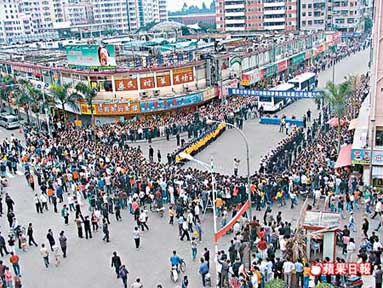
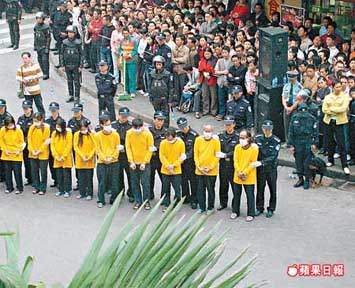
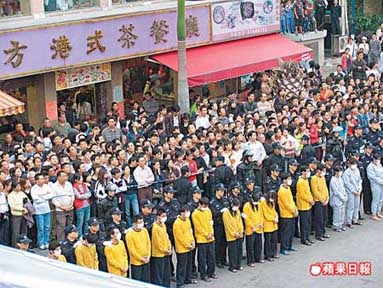
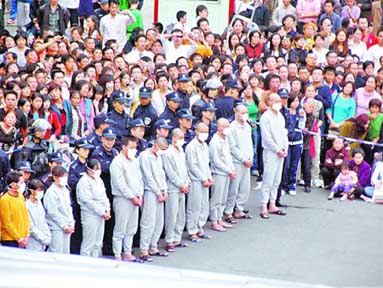


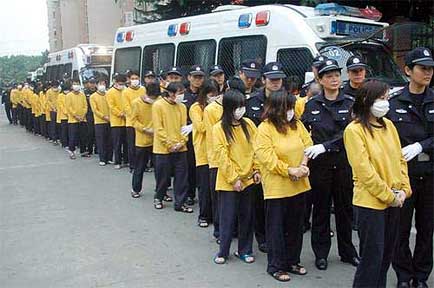
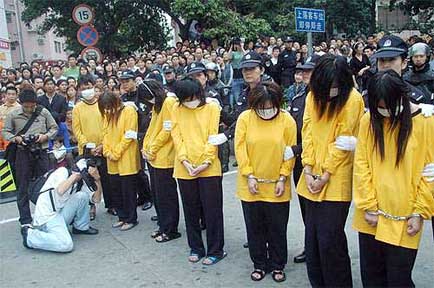

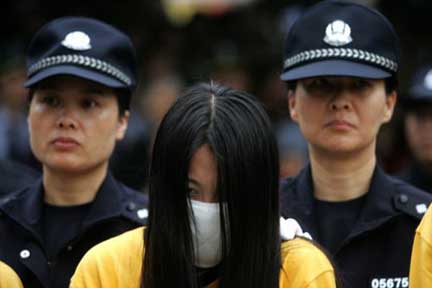
Over the past three weeks, the public security bureau had been sweeping
through the karaoke bars, discos, saunas and barbers. They arrested
more than 200 prostitutes and patrons, including a number of Hong Kong
residents.
Yesterday afternoon at 3pm, the Futian public security bureau roped off the
busy intersection in Shangsha and Xiasha villages for the trial. The
wide banner read: "Futian Public Security Bureau strike at and clean up
pornographic crimes in public meeting." At around 430pm, about
fifty men and women were brought in by buses. The public security
bureau director then read off the crimes of each individual, while reading
out their information (names, date of births and address). Each person
was then sentenced to 15 days in administrative detention. Five men
were separated out for special treatment -- "The following five are
from the Hong Kong Special Administrative Region." These men had
their names read out and then sentenced to 15 days in administrative
detention as well. By the way, some of the men had their heads shaved
immediately upon arrest.
Human Rights Monitor in Hong Kong said that this public trial clearly
violates the international human rights treaty against cruel, inhumane
and/or insulting treatments/punishments.
Relevant Link:
Wrong
To Shame "Chickens", Won't Scare Monkeys Survey
Jonathan Ansfield, China Digital Times
'Public
shaming' in Shenzhen Tim Johnson, China Rises
Public
Shaming of Prostitutes Misfires in China Edward Cody,
Washington Pos
Shenzhen's public humiliation of sex workers provokes a backlash
Howard W. French, The New York Times.
Video:
[114] An Example of Bad Reporting Etiquette (11/29/2006) In Comment 200611#113, the validity of the list of bad Chinese reporters was doubted. As for the female Southern Weekend reporter Wu Yuehua involved in The Media Story of the Soccer Commentator, it is known that Fang Zhouzi who personally placed her on that list. What did the reporter do? At Xinyusi, Fang Zhouzi quoted what the reporter allegedly said about him after interviewing him and publishing an unfavorable report.
做芳粥子???!!!也就我们杂志想得出这样馊的主意!还说他是公共知识分子,在我看来公共厕所还差不多! 嘴脏得不行,智商也有问题。是我,早就他妈地骂丫傻逼了。至蠢,瞧他说的那些话,什么二奶的,他知道什么是二奶吗? 死蠢的猪(这几话不代表我们杂志说,是我个人意见)。去了美国脑袋都变成转基因的了。
我曾经造谣:一,方舟子的乳房是义乳;二,方舟子生的孩子因为转了基因没屁眼. 这个事情说我造谣我也不大承认,第一,方舟子确实没有让人看过他的乳房,第二,方舟子确实没有让人看他孩子的屁眼.
[in translation]
"Interview Fang Zhouzi???!!! What a stupid idea that our magazine came up with! Even though they call him a public intellectual, he is more like a public toilet! He has a filthy mouth and his intelligence quotient is suspect. If it was up to me, I would have f**king cursed out this stupid c**t. He is stupid for saying those things. He talked about mistresses, but what does he know about mistresses? Damn stupid pig (These are my personal thoughts, and do not represent our magazine). When he got to America, the genes in his brain must have been mutated.
"... I started some rumors. First, Fang Zhouzi's tits are fake. Second, Fang Zhouzi's child was born without an anus due to genetic mutation. Now I would dissent if you accuse me with starting rumors. First, Fang Zhouzi has not let anyone see his tits. Second, Fang Zhouzi has not let anyone see his child's anus."
[113] The
List of Bad Chinese Reporters (11/29/2006) In The
Media Story of the Soccer Commentator, former CCTV soccer commentator
Huang Jianxiang complained about the story in Southern Weekend on him.
Huang denounced the female reporter and then pointed to her presence on the
list of bad Chinese reporters as proof of her bad reputation.
What is this list of bad Chinese reporters? This list was published at
Fang Zhouzi's Xinyusi
website. The slogan of the list is "Beware of fire, beware of
thieves, beware of bad/harmful reporters." The reporters are
listed by name, organization and specialty (such as rumor mongering,
blackmail, fraud, hack, plagiarist, hired gun, rogue, etc).
Where did this list come from? Was the basis by which someone is
selected? There is no explanation. Therefore, this list may be a
good laugh but it has no validity. So maybe Fang Zhouzi or his
contributors were mad at one time or another about something that they
wrote, but this is surely more like personal quarrels rather than a
scientifically compiled listing.
The
[112] Taiwan By The
Numbers (11/29/2006)
(ERA
TV) (1,068 voters age 20 or older in Taipei city were
interviewed on the evenings of November 26-27. The sample was
initially drawn randomly from the telephone directory in proportion to the
population size by administrative district. The last two digits of the
selected telephone numbers were then randomized)
(changes from 11/25 survey are in parentheses)
Hau Lung-bin (KMT): 41% (+1%)
Frank Hsieh (DPP): 20% (-1%)
James Soong (IND): 8% (+1%)
Li Ao (IND): 2%(-1%)
Clara Chou (TSU): 1.1%(-0.7%)
Ke Tze-hai (IND): 2.2%(+0.3%)
Don't know/undecided: 26%(+1%)
(ERA
TV) (1,069 voters age 20 or older in Kaohsiung
city were interviewed on the evenings of November 26-27. The sample
was initially drawn randomly from the telephone directory in proportion to
the population size by administrative district. The last two digits of
the selected telephone numbers were then randomized)
(changes from 11/25 survey are in parentheses)
Huang Jun-yin (KMT): 41% (-2%)
Chen Chu (DPP): 26%(-1%)
Lo Chih-ming (TSU): 3%(+1%)
Don't know/undecided: 30%(+2%)
(UDN)
(932 voters in Taipei city were
interviewed on the evenings of November 24-25. The sample was
initially drawn randomly from the telephone directory. The last two digits of the
selected telephone numbers were then randomized)
(changes from 11/19 survey are in parentheses)
Hau Lung-bin (KMT): 42% (no change)
Frank Hsieh (DPP): 19% (-1%)
James Soong (IND): 8% (no change)
Li Ao (IND): 3%
Clara Chou (TSU): 1%
Ke Tze-hai
(IND): 1%
Don't know/undecided: 27%(no change)
(UDN) (901 voters in Kaohsiung
city were interviewed on the evenings of November 24-25. The sample
was initially drawn randomly from the telephone directory. The last two digits of
the selected telephone numbers were then randomized)
(changes from 11/19 survey are in parentheses)
Huang Jun-yin (KMT): 38% (-1%)
Chen Chu (DPP): 29%(+3%)
Lo Chih-ming (TSU): 3%(+1%)
Don't know/undecided: 29%(-3%)
[111] Chairman Hu Jinzhu (11/29/2006) (Apple Daily) On November 21, 2006, Xinhua released a news reporter about Chinese national chairman celebrating the friendship between China and India. There was a huge error in that the name of Chairman Hu Jintao (
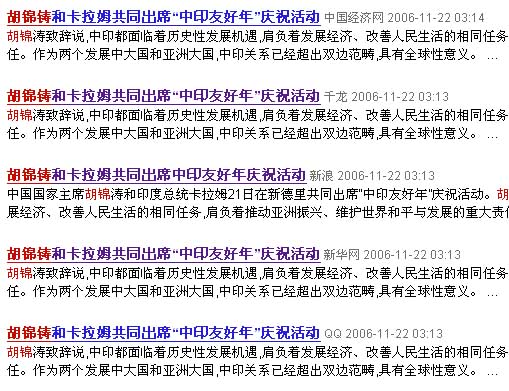

[110] Hidden Rules (11/28/2006) (Southern Metropolis Daily)
[in translation]
Recently, the most popular person on the Internet must be Zhang Yu. There is one theory: if "hidden rules" exist in the film/television industry, then there must be reasons for their existence. Thus, there are reasons for them to exist; if you break the "hidden rules," then you are wrong.
That is an interesting theory. It is even more interesting to note that there is a market for this theory.
According to this theory: if you want to get a film role, you must offer your body because that is the "hidden rule." If you want a job promotion, you must pay bribes because that is the "hidden rule." If an actress wants to perform in film without offering sexual favors, then she is breaking the "hidden rule." If an official wants to stay clean and uncorrupt, then he is breaking the "hidden rule." From there on, we infer: weak women are destined to be abused, because that is the "hidden rule." Obedient citizens are destined to be bullied, because that is the "hidden rule." If the weak women object to the abuse, they are breaking the "hidden rule." If the obedient citizens refuse to be bullied, they are breaking the "hidden rule."
How can there be so many "hidden rules"? No wonder people keep saying that the Chinese people are tired and bitter.
[109] The
Windows Live Blog Report (11/28/2006) (Ming
Pao) In August-September, the MSN portal conducted an online
survey of 25,000 persons in seven Asian markets, including Hong Kong, South
Korea, Malaysia, Singapore and Taiwan.
About 1,000 persons were interviewed in Hong Kong, of which half of them
kept blogs. 62% of the bloggers are female; almost 60% are under 25
while more than 30% are between the ages of 25-34.
Concerning the favorite blogs, 86% named the blogs of friends and
relatives. Next in the popularity list are actors, singers and
athletes. Business leaders and politicial figures are less popular at
only 10% and 8% respectively. The most popular blog themes are travel
(23%) and music (18%).
What is a good blog? Or bad blog? The respondents believe that a good
blog must be frequently updated. Next, the writing has to be fluid and
the photographs have to be elegant. Conversely, the respondents don't
like blogs that do not get updated, or have boring subjects, or have dubious
content.
According to MSN's Hong Kong director, the company will not filter the blogs
of its users. Periodically, the company receives complaints from
Internet users such as about pornograhic photographs. The company
follows through to delete the photographs and contents. So far there
has not been any criminal cases.
Addendum: Over
The Rainbow
(a) There are more than 4 million Internet users in Hong Kong, of which 56%
write blogs
(b) 62% of bloggers are female
(c) 70% of bloggers write blogs in order to share diaries and photo albums
with friends and families; 56% use blogs to keep in touch with friends and
families (and this is higher than the overall Asian level of 43%)
(d) 47% of Internet users think that blogs are just as trustworthy as
traditional media
(e) 80% of bloggers spend less than 5 hours per week reading or updating
blogs; the favorite blog subjects are travel (23%), music (18%), IT(6%),
news (6%), movies (6%). The favorite blogger types are singers (33%),
actresses(28%), business leaders (10%), politicians(8%), athletes(6%)
(f) 82% of bloggers said that at least 20 people view their blogs each week.
[108] More
Than 80 Reporters Arrested In Shanxi (11/28/2006) (Ming
Pao) In Linfen city, Shanxi province, there was a gas
explosion in a coal mine resulting in the deaths of 24 miners. At the
time, there was an electricity blackout down in the mine. Since the
ventilator was not working, gas became to accumulate. Afterwards, the
mine owner was arrested while the manager has fled.
Shanxi has many coal mines, and therefore many industrial accidents.
This has made the place a very popular destination for reporters. In
one coal town, more than 70 teams of reporters came through in 2005, from
national media to individual fake reporters. These reporters were paid
NOT to report on the conditions. Some of them demanded several
thousand RMB, while others were satisfied with a gasoline fill-up of their
cars.
In Luliang city (Shanxi), the government set up a special task force
consisting of members from 15 departments. In less than 100 days, they
found more than 80 fake reporters. 44 of them have sent to law
enforcement agencies for prosecution.
[107] The
Harvard Graduate in Kunming (11/27/2006) (Yunnan Information
News via 6Park)
a young man came to the police station in Kunming (Yunnan province) seeking
help to establish his identity because he has lost his documents (passport
and travel pass).
The young man wearing brand name clothes and accessories walked into the
reception room and said "Hello" to the officer and continued to
speak in English. The officer on duty was fluent in English and
carried on the conversation. But the young man then quickly switched
to putonghua.
The young man claimed that he is from Hong Kong and his address is Kowloon
International Center Number 132. He is the son of the chairman of an
international investment firm in Hong Kong and his English name is
"Star."
He said that he attended school in Venice (Italy) when he was four and he
studied overseas for many years. He has a business administration
degree from Harvard University. He said that he had lost his documents
at a local tourist spot. So the police officer gave him a form to fill
out. When the form was completed, the police officer was shocked at
the number of errors, including answers that were completely irrevelant to
the questions.
So the police officer carried out this Q&A:
Q: Which city is Harvard located in America?
A: It is in a city in America!
Q: Is it Washington DC?
A: Oh, ye, ye, ye! Harvard University is in Washington DC!
Harvard University used to be known as Houston University.
Q: How do you spell Hong Kong in English?
A: "Hankou."
Q: Why don't you call your family so that we can confirm your status?
A: Oh, no, no, no! My parents are chief executives. They are
very busy. I don't want them to worry.
Q: Why don't you forget it? We know who you are already. Just
tell us the truth!
A: Oh! You are mistaken. My mom and dad will be flying over here
to take me back to Hong Kong!
But after the police read out the information that they had, the young man
confessed that he was really a local 17-year-old with only an elementary
school education. However, he moved into the a student apartment and
began to borrow money from the girls while claiming to be a son of a rich
Hong Kong man. He spent the money to buy more brand name clothes and
accessories in order to borrow more money.
So far, the police have found three female students who lent him almost
30,000 RMB in total. The list is potentially as long as 50 female
university students. What were the women thinking? Don't answer that question
...
[106] Interior
Decoration (11/27/2006) (The
Sun) This is a seemingly trivial domestic incident in Hong
Kong, but I found it interesting because it took me a while to figure why
the fight was inevitable. Everything can be explained through the
floor plan of the re-decorated apartment. A couple lived there, but
they have been estranged (but not yet divorced) due to infidelity on the
part of the husband (namely, he has a mistress in mainland China). The
apartment is in a public housing estate, although the husband has a reported
wealth of HK$100 million and could probably live in much better style.
However, the husband believes that his good fortunes were due to the fengshui
in this apartment and therefore he continues to live there.
Due to the estrangement, the couple live in separate rooms. The
husband lives in room A while the wife lives in room E. Previously,
both shared the living room (D), the bathroom (C) and the kitchen (B).
The wife has her own living room (F). There is an entrance area (G)
right behind the front door..
The husband then initiated interior decoration project #1. He hired a
contractor to seal the door from Room E to the living room, restroom and
kitchen. The wife was mad, but she could not make the contractor
stop. So the wife then initiated interior decoration project #2.
She hired a contractor to seal the door from the entrance area G to areas A,
B, C, D. So this means that the husband has no access to his own
room. Furthermore, nobody had access to the living room, restroom or
kitchen.

As I said, the fight was inevitable with their children taking different
sides. The police was summoned and they came and hauled everyone down
to the police station.
[105] Pundit
Accountability (11/27/2006) In Tom Friedman
In China, I was attempting to hold Tom
Friedman accountable for his statements on Iraq. They were mostly
wrong, but as an unelected and self-appointed pundit, he is not being held
accountable. What is accountability? It means that at a minimum
Tom Friedman's predictions on any other sujbect ought to be taken with less
confidence.
I am not picking on just Tom Friedman. There are plenty of other
unelected pundits who are not being held accountable, including Chinese
ones. For example, the following quotations come Jiao Guobiao from his
book: Flagrant Remarks From My Conscience. The title of the
essay is Three Essays on Iraq, and is dated around early 2003.
On January 27, 2003, the Turkish premier said that the Americans have informed him that they can conquer Iraq militarily in fifteen days. I believe it. When the war in Iraq begins, the entire country will be rapidly pacified. Once the Saddam government falls, the embryonic form of a modern democratic government will quickly come into being with the support of America in the area of the two ancient rivers. Within five years, this newborn Iraq will stand proudly in the world. This is what I say. You just wait and watch for it.
Okay, so maybe it has only been 3-1/2 years and there is still a chance that the prediction will come true. But of the three options (1) double the bet, as in I know it will happen because what you see right now is transitory; (2) pretend I never wrote this and hope that no one will bring this up; (3) acknowledge that I was wrong and I will try to analyze where I went wrong -- which do you think will happen?
Here is more stuff from Jiao Guobiao in praise of the "public order disturbances"/"mass incidents" after Iraq was overrun by the Coalition forces:
In recent days, the Iraqis have been looting the public institutions, including government offices and foreign embassies as well as the national museum. The media have condemned the American and British troops for failing to stop the looting. I believe that this is the way by which the Coalition wants to "tame the people."
The Iraqi looters are like people attending a carnival. They are like farmers at the harvest celebration, who are trying to reap as much wheat as possible. This is a release from a longtime repression, a re-possession after a longtime exploitation.
The Coalition should give the Iraqis a suitable period to release their feelings. If they had watched them over closely just like the former Saddam regime, then the Iraqis would think that one Saddam has been replaced by another Saddam and nothing has changed. If the old things continue to exist, then what hope is there in life?
Therefore, I believe that the media are wrong to use "looting" and "robbing" so persvasively. Looting and robbing must have identifiable victims, such as homes being robbed. Here, the "looting" is only for materials without any owners and this is different from robbing someone's possessions and maybe even hurting the owners.
... The looting by the Iraqis is like the Beijing people looting the Summer Garden back then. They cannot go near the place in ordinary times, because they were treated as the enemies by the authorities. Alas, here came a day when they could go and rip the place apart. So what were they waiting for?
"Looting" is a form of robbery and is not a good thing. The comforting thing is that it will be over quickly. For one thing, the Coalition forces and the people of Iraq will undertake the joint task of maintaining public safety. For another thing, this was just looting without real robberies. In 1998, Indonesians rioters robbed the Chinese of their properties and abused their women. Now that is real robbery.
In reviewing the entire process of looting by the Iraqis, this was just a happy celebration among the people. There were no riots created by violent rioters. The participants were just the good citizens of Iraq.
[104] Taiwan
By The Numbers (11/27/2006)
(China
Times) (600 Taipei city residents interviewed November 22-24
using the telephone directory as the sampling frame)
Q1. If the Taipei city mayoral election were held today, who would you
vote for?
Hau Lung-bin (KMT): 49%
Frank Hsieh (DPP): 18%
James Soong (IND): 6%
Li Ao (IND): 2%
Clara Chou (TSU): 1%
No opinion: 24%
Q2. If the pan-blues require vote consolidation to win, who would you
vote for?
Hau Lung-bin (KMT): 64%
James Soong (IND): 11%
Li Ao (IND): 4%
No opinion: 21%
Q3. What is the most important attribute for your ideal Taipei city
mayor?
Governing ability: 46%
Uncorrupt/ethical: 32%
Administrative experience: 11%
Party affiliation: 2%
No opinion: 9%
Q4. As a Taipei city resident, what is the most urgent issue for you?
Public security: 37%
Education: 28%
Transportation: 21%
Environment protection: 6%
No opinion: 6%
Q5. Who do you think is favored to win in this mayoral election?
Hau Lung-bin (KMT): 59%
Frank Hsieh (DPP): 15%
James Soong (IND): 3%
Li Ao (IND): 1%
Clara Chou (TSU): 0%
No opinion: 22%
(China
Times) (576 Kaohsiung city residents interviewed November 22-24
using the telephone director as the sampling frame)
Q1. If the Kaohsiung city mayoral election were held today, who would you
vote for?
Huang Jun-yin (KMT): 46%
Chen Chu (DPP): 29%
Lo Chih-ming (TSU): 2%
No opinion: 23%
Q2. Did Taichung mayor Jason Hu's auto accident change your vote?
Yes, for
Huang Jun-yin (KMT): 1%
Yes, for
Chen Chu (DPP): 0%
Yes, for
Lo Chih-ming (TSU): 1%
No: 94%
No opinion: 4%
Q3. What is the most important attribute for your ideal Kaohsiung
city mayor?
Governing ability: 46%
Uncorrupt/ethical: 29%
Administrative experience: 11%
Party affiliation: 3%
No opinion: 11%
Q4. As a Kaohsiung city resident, what is the most urgent issue for you?
Public security: 43%
Education: 22%
Transportation: 15%
Environment protection: 8%
No opinion: 23%
Q5. Who do you think is favored to win in this mayoral election?
Huang Jun-yin (KMT): 46%
Chen Chu (DPP): 28%
Lo Chih-ming (TSU): 2%
No opinion: 24%
[103] Politics
as Entertainment (11/27/2006) Comment
200611#100 simply stated that "Politics
is just like entertainment, and the media is increasingly becoming
entertainment." But where is the empirical proof? Where is
the beef, as it is?
In Corruption
Scandal at Top Tests Taiwans Democracy by Jim Yardley (New York
Times), "One way that some Taiwanese have reassured themselves is to
note that none of this a public demonstration against a president, an
indictment against the first family could have happened across the
strait in non-democratic China. Indeed, that point has been made by a
handful of bloggers in China who have watched Taiwans democratic
convulsions not with disgust but with admiration."
But there are actually deeper technical issues that are covered by a number
of posts/comments at this weblog. In The
Media Story of the Soccer Commentator, there was a question about
whether the resignation of soccer commentator Huang Jianxiang from CCTV was "a blow to the
system," "defense of freedom" and "pursuit of
individuality." On the whole, the affair sounded much more like yet
another entertainment news item rather than a political revolution.
Meanwhile, the two major political issues in Taiwan on this weekend is about
President Chen Shui-bian's son going to the French restaurant Daniel in New
York City in a Mercedes=-Benz with his wife wearing a fur coat (Comment
200611#097) and Taipei city mayor Ma Ying-Jeou's dog getting a
haircut/shampoo (Comment
200611#101). The lesson
for the mainland Chinese, if they are paying any attention, is that they
would not want their political choices be determined by what family members
of famous politicians are doing. For example, the major political
choices in Taiwan are about electing the mayors of Taipei and Kaohsiung
cities. The voters ought to choose whomever they believe to be best
persons. Why should Ma Ying-jeou's dog matter? Or where
President Chen's son dined on the day before Thanksgiving?
Nevertheless, these other factoids are popping up because the media are
chasing after politicians' family members and pets as if these are matters
of public interest or as if they are entertainment celebrities such as Faye
Wong, Jay Chou and Jolin Tsai. No, they really are not! While it
is boring and much less sexy to talk about platforms and policies, that is
actually more relevant and meaningful!
More precisely, I am stating that I dislike the November 2006 elections in
the United States because they were positioned as mid-term elections that
are a test of support for the President. For crying out loud,
President George W. Bush is not up for re-election. If I am going to
vote for my Congressional representative, I ought to vote for the best
person out of all the candidates on the ballot, regardless of party
affiliation. Why would I vote for some inferior person solely in order
to spite the sitting president? I will have to live with this person
as my representative even though I was fully aware of his/her flaws now.
In like manner, I just find the fluctuating fortunes of the mayoral
candidates in Taipei and Kaohsiung to be weird and irrational. Why
should the numbers bounce on account of the indictment of the President's
wife for embezzlement or the KMT party chairman's problems with the special
funds being allocated partially to pay for the living expenses of his
dog? The voters are supposed to be electing the best candidate to
serve as the mayors for their respective cities. It is a serious
mistake to think that they are voting on the presidency (either the current
one or the prospective 2008 one). This is a lesson that I hope that
United States and Taiwan can learn now, and that someday mainland China can
learn based upon these examples.
In any country, politics is dead on arrival if there is a polarization into
one or the other party. For example, if people are always divided into
a majority fraction and a minority fraction along party lines, then
democratic voting will always result in the majority winning. This is
a deadly outcome! In the United States (as well as Taiwan), the saving
grace is that there exists a sufficiently large independent faction who will
not vote automatically along party lines and will evaluate their votes on a
case-by-case basis. I assert that the degree of democracy in any
country is the size of this independent faction.
[102] Positive Feedback Systems (11/27/2006) (Taipei Times) Chinese Nationalist Party (KMT) Chairman Ma Ying-jeou (

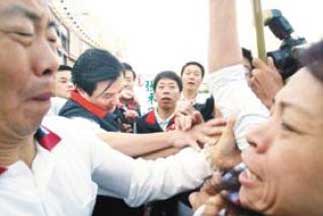
Why does this type of thing happened? Blame the media!
Phase 1: A physical confrontation takes place when a previously
unknown minor candidate attempts to assault a well-known politician.
Phase 2: Regardless of whether the assault had any effect, the media
will give national exposure to the event and the attacker. This is
positive reinforcement and will encourage others to imitate because only
good (=publicity) and nothing bad (=penalties) ever come out of this
type of thing ...
P.S. (ETToday via Yahoo!
News) Chang Ho-yi came back for more the next day at a Kaohsiung
rally. The police assigned female police officers to look after
her. In the photograph, Ms. Chang has her hand on the neck of the
female police officer, who was under strict orders to never talk or fight
back.
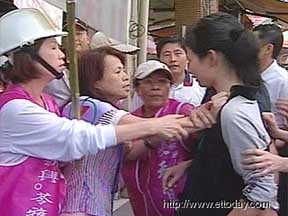
[101] Ma Ying-jeou Junior (11/26/2006) Taipei mayor and KMT party chairman Ma Ying-jeou is embroiled in his own version of special funds scandal. One of the concrete evidence is a stray dog that he adopted seven years ago. The initial medical examination was paid for with special funds, and so is a monthly allowance. But there is a more fundamental question: Does the dog (named Ma Ying-jeou Junior

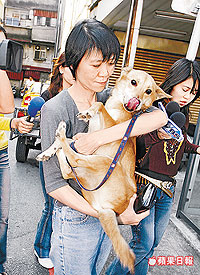
[100] Politics = Entertainment? (11/26/2006) The story about President Chen Shui-bian's son Chen Chih-chung (see Comment 200611#097) reminds me about this blog post by the Hong Kong blogger Miss Taipo. So here is the belated translation of the blog post titled Hong Kong has no politics, just entertainment dated October 14, 2006.
... I was a graduate from the Department of Journalism, so I logically became a journalist. I did that for seven years. During my seven years as journalist, I worked in investigative journalism, crime reporting and then I became a political journalist. When I stepped into politics, my eyes were opened up. Government, public servants, political parties, politicians, businessmen -- how various people betray their allies, distrust each other, refuse to share the wealth or spread around their misfortunes! How many of those people have a conscience? If I tell you that Doctor Woo who told you to eat "dog biscuits" is actually a person who spoke the truth from his heart, my readers would say "Huh?" If I said that you shouldn't believe Anson Chan even if she swore that she was telling the truth, my readers would say "Huh?" too. Not everybody can accept the truth. In this case, the politicians think that they are politicians but they are just nobodies, whereas the reporters are small politicians.
... Lau Kong-wah said correctly that there is no politics in Hong Kong. There is only entertainment.
Politics is just like entertainment, and the media is increasingly becoming entertainment. How many political news reports show the media style? The media company bosses only want to make money and they want exposés and scandals. Social responsibility and public trust have become decorative already. When the news products are not respected, what becomes of the reporters? Their positions and wages deteriorate from day to day. As time goes by, only novices would want to do this laborious but unrewarding job. Such is the sorrow of this occupation, as well as society as a whole. Without these experienced and perceptive reporters, how shall the readers expand their vistas and how shall the media fulfill their functions? So the media become the tools of the rulers, just as Chairman Mao, the government, the politicians and the advertisers wish.
But apart from all this, the media workers are still worthy of respect. Their rewards are not commensurate with their efforts. Sometimes, they put in not only their sweat and time, but also their emotions and ideals.
[099] Li Datong On
The State Of Chinese Media (11/26/2006) (Boxun)
According to Reporters Without Borders, 139 reporters are detained around
the world, of which 32 of them are in China (including Zhao Yan, Shi Tao and
Ching Cheong).
Former China Youth Daily's Freezing Point weekly magazine chief editor Li
Datong said that this list does not directly reflect how the Chinese
government controls the media. The government does not have to resort
to detaining reporters in order to achieve their objectives.
Li Datong said: "About the detentions themselves, it is for certain
that this is not set government policy . The Chinese system does not require
direct oppression of reporters, because reporters do not have the right to
conduct independent investigations and issue independent reports. The
authorities only have to control the chief editors. This is the basic
characteristic of Chinese media. The chief editor is supposed to be a
media worker, but he is not. He actually has oversight
responsibilities on news reporting . The daily job of the chief editor is to
determine what cannot be published. The sickness in Chinese media is
about what cannot be expressed."
Media control in China is a top-down system. Li Datong said that the
fact that very few national-level or major provincial-level media reporters
have ever been detained or jailed means that the Chinese government does not
have to go after individual reporters in order to control the media.
As for the cases of Shi Tao and others, Li Datong explained as follows:
"I think that they want to use this method to go after some
people. But I don't think that they are so stupid in general because
this is legally tenuous. They have found out about this. Besides
it arouses public anger. I think that it is unlikely that they will
come after you on account of your reporting. The case of Ching Cheong
is basically confusing. Even now, I still have no idea what it is
about."
[098] The
Chinese-language Signs (11/25/2006) (Wenxue
City) Here are three images that have been circulated widely
in China for some time. These refer to Chinese-language signs that
appear at certain famous overseas tourist sights.
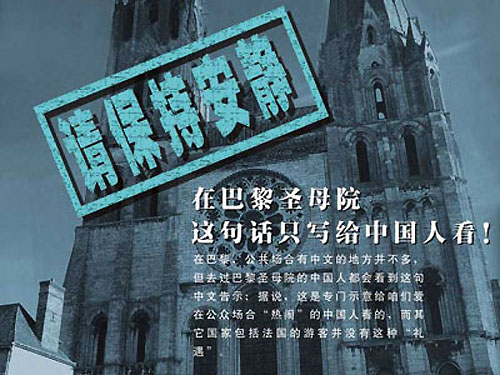
In Notre Dame Cathedral (Paris, France): "Please keep quiet"
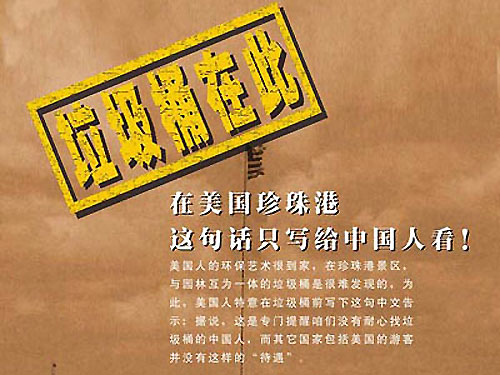
In Pearl Harbor (Honolulu, USA): "Trash Bin Is Here"
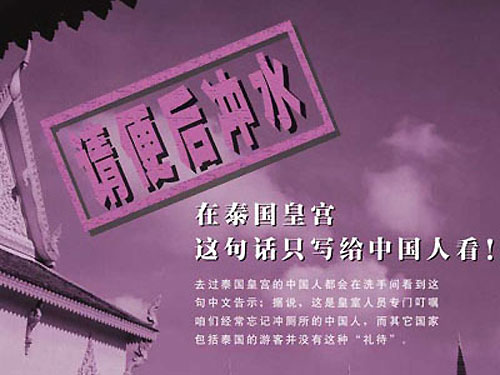
In the Royal Palace (Bangkok, Thailand): "Please flush toilet after
use"
(in translation)
These signs have been the subject of discussion at many Chinese media (People's Daily, Xinhua, Yangcheng Wanbao, Sichuan Daily, etc). It is even included in a high school exam.
A Southern Weekend article titled "Uncivilized behavior of Chinese tourists overseas has shocked senior officials" began this way: "'Chinese persons, please flush toilet,' 'Please keep quiet,' 'Please do not spit' ... these warning signs written in simplified Chinese characters appear frequently in the major destinations for Chinese tourists overseas: France, Germany, Japan, Thailand, Singapore, etc. At a time when tourists are becoming the latest export from China, 'Chinese people' have come to stand for uncivilized and rude behavior."
The story is a hoax. To quote from the United Nations Declaration on the Elimination of All Forms of Racial Discrimination: "the United Nations is based on the principles of the dignity and equality of all human beings and seeks, among other basic objectives, to achieve international co-operation in promoting and encouraging respect for human rights and fundamental freedoms for all without distinction as to race, sex, language or religion."
If any country work on the basis that certain individual Chinese persons had engaged in uncivilized behavior and then promptly issue these signs directed against the entire "Chinese people," then this is racial discrimination. In China, we have seen that signs such as "Resolutely combat the criminal organizations from Henan" and "Beware of Xinjiang pickpockets" being denounced and removed after nationwide public outcries. So could it be that developed countries like France and the United States would allow these kinds of signs that exhibit clear racial discrimination? How likely is that? Do the Chinese media have brains?
[097] Chen Chih-Chung
Talks Back (11/25/2006) Chen Chih-chung is the son of
President Chen Shui-bian. He is presently living with his expectant
wife Huang Jui-ching in New
York City. As such, he is the target of the paparazzi from Taiwan.
(China
Times) After a long period of surveillance, the electronic
media finally caught sight of Chen Chih-chung and Huang Jui-ching. She
was wearing a luxurious fur coat and holding a brand name Denim handbag as
the couple came out of an upscale French restaurant and went into a black
Mercedes-Benz sedan.
Chen and Huang left Taiwan in mid-October for New York City. The
investigator Chen Rui-jen in the state affairs fund investigation wanted to
interview Chen Chih-chung but he missed his chance.
According to the media, the couple is currently living in a luxury apartment
in the exclusive Upper West Side area. The building has a gymnasium
and a swimming pool. The room has a great view of the Hudson
River. The monthly rent for the two-bedroom apartment is at least
NT$250,000. Many celebrities live in the building.
The media also followed the couple to the French restaurant Daniel on Thanksgiving
Day. This is the top French restaurant in New York City. The
cost per meal is at least NT$5,000. The most expensive red wine in the
restaurant costs NT$180,000.
According to the media, Chen Chih-chung does not work or attend school in
New York City. They seldom go out and when they do, it is usually to
eat or shop, sometimes for baby products. They seem to be waiting for
Huang to deliver her baby.
Well, you got that? But here is Chen Chih-chung's public statement on
the media coverage:
1. The so-called luxury apartment is a small two-bedroom small-family apartment measuring just over 600 square feet in area. It faces the building across the street, not the Hudson River. The building has a small gym, but no swimming pool. The residents are middle-class American families. The apartment is also far away from Central Park, so any claim of park views is absurd. So too is the claim that the rent is NT$250,000 per month.
2. On the day before Thanksgiving, we went to dinner at a French restaurant with friends. The Mercedes-Benz is not ours. My friend called a car service in consideration that my wife is pregnant and it was cold in New York City that night. When we go out, we usually hail yellow taxi cabs in the street.
3. My wife's fur cape was purchased by her mother many years ago. Her mother told her to bring it along this time because it is cold in New York City. There is another fur coat that my wife bought on our wedding anniversary for NT$30,000 plus.
4. Since graduation, I have been on an internship in an American law office in Manhattan. In early September, I went back to Taipei to visit my ill mother, and I delayed my return in consideration of her poor health.
5. Finally, I thank everybody for their concern. But I wish you would respect my privacy and not intrude into our normal lives. If anyone should distort the truth or make exaggerated claims to smear our reputations, we will take the necessary legal actions.
[096] Taiwan By The
Numbers (11/25/2006)
(ERA
TV) (807 voters age 20 or older in Taipei city were
interviewed on the evenings of November 20-23. The sample was
initially drawn randomly from the telephone directory in proportion to the
population size by administrative district. The last two digits of the
selected telephone numbers were then randomized)
(changes from 11/10 survey are in parentheses)
Hau Lung-bin (KMT): 39% (+5%)
Frank Hsieh (DPP): 19% (-1%)
James Soong (IND): 9% (+1%)
Li Ao (IND): 4%(+2%)
Clara Chou (TSU): 0.6%(+0.2%)
Ke Tze-hai (IND): 0.7%(-0.6%)
Don't know/undecided: 23%(-6%)
(ERA
TV) (825 voters age 20 or older in Kaohsiung
city were interviewed on the evenings of November 20-23. The sample
was initially drawn randomly from the telephone directory in proportion to
the population size by administrative district. The last two digits of
the selected telephone numbers were then randomized)
(changes from 11/10 survey are in parentheses)
Huang Jun-yin (KMT): 39% (+3%)
Chen Chu (DPP): 28%(-3%)
Lo Chih-ming (TSU): 3%(+1%)
Don't know/undecided: 30%(-1%)
[095] 'Beijing
Automotive Exhibition' Controversy (11/24/2006) (People's
Daily) The 2006 Beijing International Automotive Exhibition
opened on Sunday, displaying 572 cars and car parts from 1500 manufacturers
in 20 countries and regions. It is estimated that about 500,000 people
attend the Exhibition over the nine days.

It is customary for the automotive manufacturers to hire pretty female
models to pose next to their products.

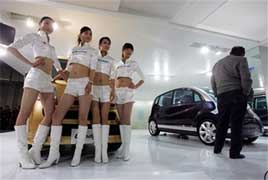

Why? (Racerchicks.com)
国展车模被看客盯骚 yWeekend... Do scantily-clad women actually increase sales in the automotive industry? There is no simple answer. Given the number of bikinis hovering over street rods, hot rods and import racers at the 2005 SEMA show, you might think the answer was a clear Yes. One of the exhibitors, Drew Heitner, owner of M&D International, expressed his thoughts on the matter succinctly: "A woman judges her man by the car he drives, but a man judges his car by the women it attracts."
... It served as a reminder that tasteful and tasteless are two different approaches to marketing, but whichever strategy you choose, you have to remember the fundamentals.Rule No. 1: Know your product. If there is a demand and the quality is there, your product will sell.
Rule No. 2: Know your customer. If the testosterone crowd is your buyer and you want to ignore the rest of the population, then go for it. But never underestimate the female buyer we play an important part in automotive decisions and are the fastest growing sector in the auto area.
I am not a feminist. I am a female car enthusiast. My argument is not to sever that century-old partnership of beautiful women and beautiful cars. But I do want companies to use some taste and discretion when placing the two together.
(The Sun) At the Chang'an Motor exhibit, a tall and lovely model was being harassed verbally by a man who reeked of alcohol. "Miss, why are you standing here? Are you tired?" The model ignored him while continuing to smile. The man persisted: "Miss, you are really sexy!" as he attempted to sidle up to her. Meanwhile another man was taking photographs of the models at the Shanghai People exhibit, but his camera was focused on the breasts and buttocks. When asked, "Why are you photographing pretty girls but not the cars?" he said: "If I want to buy a car, I would have gone to the auto dealer. Why did I come here? To check out the girls. It is visually enjoyment and my wife says its okay."
There is also an Internet forum debate at ChineseNewsNet. The title of the post is "The World Is Watching China, But What Is China Watching?" and contains three photographs but no text. From the foci of the cameras, the photographers seemed to have no interest in the cars.
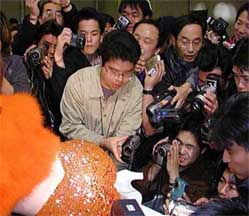

Does this prove the low quality of the Chinese people once again? Well, before you can even think about this question, you need to be aware that the commentators assert that these photographs came from Japan. As proof, they said that the steering wheel in the car in the background of the third photograph is on the side opposite to the Chinese way. So the first question is, What kind of person would use photographs of Japanese cameramen in a post titled "The World is Watching China, But What Is China Watching?" The second question is that notwithstanding these photographs, do you believe that such behavior are commonplace in China? The third question is that if such behavior is commonplace in China, then is anything wrong with it? After all, the behavior is just as common in Japan and the United States. The fourth question is that having dealt with all the preceding questions, what is the proper title for that post?
Related link (in Chinese):
[094] Con Games in
China (11/24/2006) (Xinhua)
In Zhongshan city (Guangdong province), citizen Li was swindled out of more
than 1 million RMB. The con men were two West Africans who told Li
that they had smuggled US$250,000 from their own country. But in order
to move such a large sum, they had to dyed the bills with black ink.
For demonstration, the two men took out a stack of black paper and let Mrs.
Li draw some at random. Then they took out a bottle of liquid in which
they soaked the pieces of black paper. Several minutes later, the ink
washed away from the two US$50 and one US$100 bills. The Li's were
able to verify at the local bank that these were genuine bills. In the
next phase, the two men explained that they didn't have enough money to buy
the liquid to clean up their entire US$250,000 stash. Therefore they
needed a bridge loan (with a sizeable reward). Li personally brought
1.05 million RMB to Beijing. The two took the money and said that they
were proceeding next to purchase the liquid from ... you get this ... the US
Embassy! A short while later, the two called to say that they have
been "detained at the US Embassy." At that point, Li thought
that he might be the victim of a scam. So he called the police, who
arrested the two men.
(ChinaFotoPress via 163.com)
In Foshan near a hospital, scam artists approached an old man. They
claimed that there was a family medical emergency and they needed
money. However, they only have foreign currency and it is impossible
to get it converted to RMB quickly enough at the local bank.
Therefore, they asked the old man to advance them the money in exchange for
a reward. At that point, they produced a stack of foreign
currencies. The old man was unsure. Then someone else
showed up and claimed to be in the Trust Department at a bank, with an
appropriate worker identification card. The banker confirmed that the
foreign currency bills were genuine. So the old man went to the bank
and withdrew his lifetime savings of 120,000 RMB to give to the scam
artists. However, the police had been watching these people for some
time. They followed the suspects' car and blocked its progress.
When the suspects attempted to flee, the police fired warning shots into the
air and apprehended them. Here are the photographs.
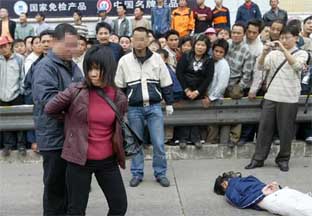
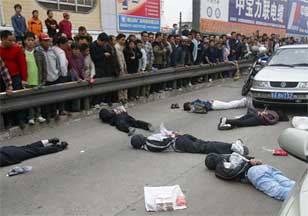
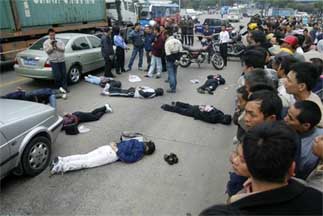
(Oriental Daily)
In Hong Kong, a 46-year-old woman named Wong working at a food market has an
8-year-old son with a hearing impairment. Three women in a
"prayer" (
[093] Website Owner
Gets Life Sentence In China (11/24/2006) (First Finance Daily
via 163.com)
The case is described in detail at The
Number One Internet Porn Case in China.
According to verdict just announced, the lead defendant Chen Fei has been
sentenced to "life in prison with deprivation of political rights for
life, plus confiscation of 100,000 RMB in personal assets." The
crime is "distribution of pornographic materials for profit."
This particular crime was included in the Criminal Law Code in 1996.
It has seldom been invoked, because these large-scale cases are rare.
Chen Fei could have been given the minimum sentence of ten years in
jail. Instead, he was given the maximum sentence. In theory, the
law defines the sentence in terms of certain thresholds. For example,
Chen's websites had registered 619,611 members, distributed 44,812 obscene
photographs and earned more than 100,000 RMB in profits. While the
numbers for the people, exposures and contents exceeded the thresholds, the
threshold for earnings was supposed to be 250,000 RMB. However, the
law sets the decision based upon whether people, exposures, contents OR
earnings exceeded the threshold. Chen Fei will probably appeal the
verdict.
[092] Taiwan By The
Numbers (11/24/2006)
(China
Times) (711 Taipei City adults interviewed by telephone on November
22. The initial was drawn randomly from the Taipei telephone directory
and then the last two digits of the selected telephone numbers were
randomized)
Taipei city mayoral election:
Hau Lung-bin (KMT): 45% (-2%)
Frank Hsieh (DPP): 21% (+3%)
James Soong (IND): 8% (no change)
(China
Times) (711 Kaohsiung adults interviewed by telephone on
November 22. The initial was drawn randomly from the Kaohsiung
telephone directory and then the last two digits of the selected telephone
numbers were randomized)
Kaohsiung city mayoral election:
Huang Jun-yin (KMT): 41% (-5%)
Chen Chu (DPP): 29%(+6%)
Lo Chih-ming (TSU): 2%(no change)
[091] Shaolin Monks
Disturb Public Order (11/24/2006) (NorthEast
Net) According to Chengdu TV channel 33 reporter Lu Ji'an,
they received a citizen tip that several dozen self-proclaimed Shaolin monks
had set up a big canopy in the street to perform martial arts in the name of
charity but actually for profit. So the reporters went to the location
under cover. There, they were asked to pay a 10 RMB admission fee even
though this was a free performance. Afterwards, the reporters
identified themselves and wanted to interview the group leader about whether
the group had the necessary permits to perform in public space.
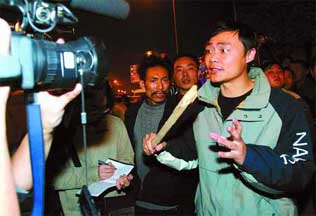
Instead, the group leader blew on a whistle and suddenly more than a dozen
bald-headed men wearing yellow robes and wielding sticks attacked the
reporters. One of the reporters managed to run off, but the other
reporter took a few blows in the head, face and shoulders because he was
trying to shield his camera. The police were called and a vehicle
carrying militia police arrived quickly at the scene. The men
surrounded the police car and banged on the exterior with their
sticks. The militia police in the car summoned for help and the area
was soon swarming with more than one hundred police officers.
When the newspaper reporter arrived at the scene, he heard two loud sounds
-- "Bang! Bang!" He saw that a militia policeman had just
fired two warning shots into the air with his gun. Meanwhile about a
dozen policemen tackled one bald-headed men who was resisting arrest.
Meanwhile there was a bus surrounded by people. Inside the bus were
dozens of bald-headed men in yellow robes. Eventually, the men on the
bus were removed and taken down to the police station for questioning.
In reference to the discussion in Statistics of Mass Incidents,
is this a 'mass incident' or a 'public order disturbance'? Answer: the
latter.
[090] The Source (11/23/2006) (Ming Pao via Hong Kong Media Workers Forum)
[in translation]
Singapore Strait Times special correspondent Ching Cheong has been detained in mainland China for over a year, and his wife Mary Lau has been working very hard for his release ...
Yesterday Mary Lau and the Hong Kong Journalists Association held a press conference to defend Ching Cheong. The reporter from Sing Tao Net asked Mary Lau whether her criticisms of the court charges implied that she has accepted that the verdict document on the Internet was authentic. Mary Lau snapped back: "You are going to have to ask your webmaster! SingtaoNet was the first to publish this verdict document. Why is the Chinese government not after the Sing Tao people responsible for this? We have consulted with knowledgeable people and they tell us that leaking state secrets leads to three years in jail. But I have no reason to call for the Chinese government to cause trouble for you."
What are possible scenarios?
(1) Sing Tao obtained the documents surreptitiously. Then they have broken Chinese law.
(2) Sing Tao obtained the documents from a verified official source (subject to non-disclosure of the identity of that source) who did so in order to serve an unstated purpose (e.g. establish criminality). You would think that Sing Tao is ethically required to disclose the circumstances so that their readers can exercise care.
(3) Sing Tao obtained the documents from an unverified source (e.g. an anonymous email showed up in the editor's inbox and the attached document seemed 'real'). You would think that Sing Tao is ethically required to disclose the lack of verification.
Sing Tao has said nothing about the process. You can flip a coin among (1), (2) or (3). I lean towards (2) with the suspicion that parts of the documents could have been edited. This is a personal opinion. You must forgive me for speculating -- What else can I do when Sing Tao provides no further information?Related Link: The Ching Cheong Verdict Joel Martinsen, Danwei.
[089] Shoot the
Messenger (11/23/2006) The following public opinion was just
released.
(United Daily
News) Taipei city mayor election support rates (11/19 survey
with changes from previous 11/04 survey in parentheses)
Hau Lung-bin (KMT): 42% (-2%)
Frank Hsieh (DPP): 20% (+5%)
James Soong (IND): 8% (-3%)
Here was James Soong's reaction at FTV (via Yahoo!
News). James Soong spent yesterday visiting a kindergarten to
explain his policies about young children. He told the press that he
was angry because United Daily Press used a fake public opinion poll to
pressure him to quit.
Not to fear, for here is some good news from the TVBS public opinion
poll. It places him at 10% (-2% from the 10 days ago).
(TVBS)
(844 persons age 20 or over in Taipei City interviewed by telephone on the
evening of November 20. The sample was originally drawn from the
telephone directory and then the last four digits were randomized)
Hau Lung-bin (KMT): 49% (0%)
Frank Hsieh (DPP): 18% (+1%)
James Soong (IND): 10 (-2%)
Li Ao (IND): 3%(-1%)
Clara Chou (TSU): 1%(0%)
No opinion/undecided: 18% (+2%)
The TVBS has a 95% confidence of plus or minus 3.4%, which covers the UDN
estimate of 8%.
This is what politicians do with polls (which are generally consistent with
each other unless something is really wrong). When the poll results
are unfavorable, you call them fake polls; when the poll results are
favorable, you say "I told you so." This is not how
reality works -- the polls are either fairly accurate and if they are
rubbish, you will find them within a couple of election cycles. Based
upon past poll results, what are James Soong's chances?
[088] Weapons of Mass
Destruction (11/22/2006) (Next Weekly, 11/23/2006) Last
Thursday in Hong Kong SAR, Mongkok police deployed secretly around a 53-year-old sports
equipment shop as they waited for the arrival of the boss -- a 72-year-old
man. At 1130am, the police raided the shop armed with a search
warrant. The police rummaged through the shop and hauled away a total of
643 nunchakus, 3 bows, 43 machetes, plus more than a thousand flying
darts, iron lotus spikes, ring knives and nine-link steel whips. The boss was arrested at
the scene. The police believed that the location was selling illegal weapons.

And then came the anti-climax. The boss was bailed out on HK$20,000
bond. And most of the seized weapons (including knives and bows) were
returned to the shop the next day. The only items held were a pair of
nunchakus which once belonged to the legendary Bruce Lee plus some of the flying darts.
When interviewed by the reporter, the boss complained: "The police
didn't explain anything. They only said that they will think about whether
these were offensive weapons. I have been running this Mongkok sports
equipment shop for more than 50 years and I have been selling the same
stuff. I know those policemen in at the Mongkok station. They come here to buy
football jerseys and order sports banners and trophies. I didn't
expect that I would end up being arrested after I got past the age of
70. Many of the customers are foreigners and Japanese who buy the
Chinese kungfu equipment as souvenirs. The Japanese particularly like
Bruce Lee. So if a Japanese guy buys a nunchaku here and he walks out
into the street, should he be arrested?"
The case has also drew a great deal of attention at the martial arts BBS's
in Hong Kong. Here are some comments: "Which triad members fight with
nunchakus in the street?" "Glass bottles, fruit knives and
iron water wipes are said to be illegal weapons too ... are they going to
arrest the people who sell sodas and fruits?" "Are you going
to go rob someone at night with a nine-link steel whip and a set of flying
darts?"
Here is the legal advice:
- If you carry offensive weapons in the street, you are guilty of
breaking public security regulation article 33.
- Even if the police did not take action against the shop for the past five
decades, it does not mean that the shop was not breaking the law. In
fact, admitting that they have been selling the same stuff for several
decades already will bring a heavier sentence!
- As long as you have weapons in your home without a reasonable explanation,
you are breaking the law even. Claiming that you idolize Bruce Lee is
not good enough! If you say that the place is a kendo school and your
sword blade is not sharpened, then you may have a chance.
[087] Continental
Shift (11/21/2006) In the past, I have translated a number of
blog posts from the Chinese blog known as Lian Yue's Eighth Continent hosted
at MSN Spaces. Conversely, Lian Yue has even reciprocated by referring
to the English-language EastSouthWestNorth blog. For BlogShares, Lian
Yue's blog was actually the top-ranked incoming link because he had more
than 3,000 incoming link himself.
But all that is in the past, as the MSN Spaces blog is now totally
inaccessible from China. To my mind, this is somewhat peculiar since
many of Lian Yue's blog post come from his column at Southern Metropolis Daily. I read the last few blog posts at MSN Spaces and I don't find
anything especially prickly, unless someone holds a grudge against Imre
Nagy. But now there is a new location at Blog.com.
Here is my translation of his statement about the new blog.
I have been writing over at MSN Spaces for several years.
I thought it was not bad, because there was no web administrator jumping in to delete stuff.
But it is over. Last Saturday, it died totally.
In this nation with the most free Internet, this is actually a common event.
Of course, starting a new blog is a very simple matter.
This sort of thing can go on repeatedly, because the costs for both sides are low.
But it is a nuisance for everybody to update their links.
...
So it is not a big deal or loss to move elsewhere.
I am not going to move the original blog posts here, because I am too lazy and beside, I don't see the need.
You should read the latest and most interesting things.
The new location is probably just like MSN Spaces. It'll be a bit slow, and it does not look like an authentic Chinese-language interface.
But they probably will not be deleting your blog posts every couple of days for the sake of their survival.
The imperfect thing is that it does not provide blog links,
and it has some ads on the right-hand column (I get nothing out of it).
I insist on the following ideas for blogs:
It should be freely accessible to the public, because proxy services are suitable for just a few people;
I will try to make it survive as long as possible;
I will write and link to whatever I want and I will not accept any debate under censorship (or else I shouldn't bother to get on the Internet).
[086] The Sadistic
CCTV Host (11/21/2006) (Sohu.com)
In 2004, there was a legal case between famous CCTV host Zhao Zhongxiang and
his mistress Rao Ying. But more recently, the case has heated up again
when Rao Ying began publishing her diaries at a fairly obscure website known
appropriately as Gouzai Net (=Paparazzi Net). The sales pitch:
"Details of sadistic sexual abuse will be revealed."
Apparently, Rao Ying intends to publish a book with the tentative title:
"From Rape To Sexual Torture: The Unknown Details Between Zhao
Zhongxiang and I." The online diary entries are piling up
hundreds of thousands of page views.
Here are some translated excerpts:
(Part 1) ...
The third time that I saw him was in September 1997. That afternoon, I
went to the East Gate at CCTV as arranged. I called to ask him where I
should meet him. He said nonchalantly: "You come to my
home!" Following his instructions, I arrived at the dormitory
building ... After a while, he stood up from the chair. I thought that
he wanted to go out. At that moment, he shoved me and I fell down on
the bed. He got on top of me and put his body on mine ... I wanted to
resist, but I had no strength. Afterwards, he got up and helped me to
sit up. I was furious that a man that I admired could do something
like that to me. I got my clothes and I was about to leave. But
he held me and used his magnetic tenor voice to say: "The first time
that I saw you, I thought that you are very pure. There are too few
people like you, maybe none ... You and your body are very pure. In
this complex society, I don't think it is so easy to remain so pure. I
will really love you." His eyes looked so kind.
(Part 2)
... In November 11, 1997, I found out that I was pregnant. At the
time, I was not having sex with my husband. I told Zhao
Zhongxiang. ... I asked him what should I do. He was noncommittal, but he said: "Didn't you say that you want to become a
better doctor? So you should not let anything else interfere with
you." I asked him what I should do with the growing fetus.
He said: "I also f*cking want to have eight or ten children, but this
is against policy in China. You don't think that I want my own
child?" No matter how I phrased it, he would not provide a
concrete answer and he was displeased with the pressure. "This is
the woman's business that she should deal with herself. There is no
need to tell the man." When I looked unhappy, he embraced me and
said: "Baby, when you go, please call me. I will quietly pray for
you." ... So I did not say anything. I went by myself to
the hospital to get an abortion.
(Part 3) ...
Then he began to torture me physically. Several times when we were
together, he used a knife to cut my arm. Then he used a needle on
which he put some saliva on then he pricked my vagina with it. He said
that it was for disinfection purposes. I was screaming from the pain,
but he was ecstatic. He said: "Baby, you don't know how happy I
get when you do that. Let me prick you." Zhao Zhongxiang
was a sadist. He made me have intercourse even if I was
menstruating. If I refused, he would beat and scold me until I
succumb. ... In 2000, the death of Zhao Zhongxiang's sister cast a
shadow into his heart. He told me once: "Members of my family do
not live long. I am 60 years old. I am afraid that I won't live
too long." Therefore, he had to engage in sadism in order to
enjoy himself in time.
[085] Taiwan By The
Numbers (11/21/2006) (United
Daily News) (822 Taipei city voters (with 92 refusals) and 806
Kaohsiung city voters (with 121 refusals) interviewed by telephone on
November 19-20. The samples were drawn initially from the residential
telephone directories and then the last two digits were randomized.)
(United Daily
News) Taipei city mayor election support rates (11/19 survey
with changes from previous 11/04 survey in parentheses)
Hau Lung-bin (KMT): 42% (-2%)
Frank Hsieh (DPP): 20% (+5%)
James Soong (IND): 8% (-3%)
No opinion/undecided: 27% (+4%)
(three other candidates have low support levels)
(United Daily
News) Kaoshiung city mayor election support rates (11/19 survey with
changes from previous 11/04 survey in parentheses)
Huang Jun-yin (KMT): 39% (0%)
Chen Chu (DPP): 26%(+2%)
Lo Chih-ming (TSU): 2%(-1%)
No opinion/undecided: 32%(0%)
[084] Bigger Is Better (11/21/2006) (SCMP)
It has been ridiculed by cynics as the Central Polling Unit for its intensified public opinion survey programme. But the Central Policy Unit has acted to bolster its policy research team to function as the government's "think-tank" on both policy options and public opinion analysis.The CPU has recently invited applications for the post of senior research officer and two research assistants. Its research team presently comprises four senior researchers and four research officers.
CPU head Lau Siu-kai said: "We have the biggest research team to conduct trend studies about political, social and economic developments of Hong Kong and the mainland. Tracking public opinion is an integral part of governance. With that, critics have second thoughts when they want to claim public opinion is on their side."
[083] Two Personal Views of Nancy Pelosi (11/21/2006) Nancy Pelosi will be the new speaker of the US Congress.
(Apple Daily) By Yu Jie, independent Chinese writer
The first time that I heard the name Pelosi was in the year after the tragedy at Tiananmen Square. At the time, I heard this piece of news on VOA: this 50-year-old Congresswoman did something courageous by displaying a banner that read: "Dedicated to the martyrs who died for democracy in China" right there in Tiananmen Square. The result was obvious: she was immediately tackled by a bunch of military police men and then expelled from China. For the past 16 years, this photograph is prominently displace in Pelosi's office. Every year when the Chinese democrats attend the 6/4 memorial service in front of the Chinese embassy, Pelosi can often be seen.
This past May, I was attending the Forum On Religious Freedom and Law in Washington DC. During the time, I also attended a forum of the Laogai Foundation and I met Ms. Pelosi. She was invited to give the opening address. She wore a light dress with a bright scarf, and she looked elegant. By comparison, another "strong woman" of about the same age is Chinese vice-premier Wu Yi, who is stiff, bloated, old and feeble.
Looks and style are connected to the political system and cultural environment: Pelosi's dashing energy reminds people of "freedom" whereas Wu Yi's lack of gender characteristics reminds people of "autocracy."
(Chuiyung) Suzanna Cheung Chui-yung, free-lance reporter from Hong Kong
Those reporters on the China-US beat will know Pelosi. When I was covering Hong Kong-US and China-US news in Washington DC more than a decade ago, Pelosi is the congresswoman whom the Hong Kong reporters have the most contact with. She often speaks about Hong Kong issue in Congress. ...
Some Hong Kong reporters may think of Pelosi as an old friend. For me, she is too political because she is only counting votes in her heart. At least when I dealt with her, I could not sense any "genuineness" in her at all.
First, let us examine her congressional district and we will know why she speaks about Hong Kong actively. Pelosi's 8th district covers most of San Francisco city, including the Chinese community. ... Faced with several hundred thousand Chinese voters, Pelosi obviously has to include the issues that these Chinese care about. Yet, in terms of what a politician should do within a democratic system, Pelosi's speeches are too empty and showed that she does not know much.
One should not assume that since she is a Democrat who chants "Long Live Democracy" that she must be a human rights fighter. Actually, she is no different from Hillary Clinton as both are equally experienced and astute. You listen to their speeches on the Israel-Palestine problem and you realize that they are thoroughly politicians.
There is a big Jewish lobbyist organization known as AIPAC in Washington DC. The board of directors are all political and business heavyweights and Pelosi is very friendly with them. Pelosi takes part in their events where she gives speeches to support Israel's "occupation" policies. The double standards of politicians are clearly revealed here.
[082] The Kidney Theft Ring of Guangzhou (11/20/2006) (YCWB via Sina.com) A Chinese netizen has been sent to jail for exercising his freedom of speech. On October 30, a man named Zhu from Yongqing county (Hunan province) went on a certain well-known web portal and posted under the nickname "hao
At Guangzhou University, it is a tradition to celebrate after the mid-term examinations. This male student attended the party on a Saturday night. He felt very happy, he drank a lot of wine and then some girls were interested in him and invited him to attend another party. So he went with them in a taxi to another apartment. They continued to drink and he took some drugs.
When he woke up, he found himself naked in a bathtub filled with ice. He looked at his chest, and the letters "Call 110 or you will die" had been written with red lipstick. There was a phone next to the tub. He called 110. He told 110 about his situation and that he had no idea where he was. 110 advised to get out of the tub and check himself in the mirror. He did and saw nothing unusual. 110 then told him to check his back. He saw two 9-inch long openings on his lower back. 110 told him to get back into the tub immediately and wait for the emergency team. The doctors found out that his kidneys had been stolen! In the black market, a pair of kidneys are worth 300,000 RMB! ...
The real crime committed by Zhu might just be plagiarism or lack of originality. The kidney theft story is an urban legend that goes back to 1996 (see Snopes). Zhu did not even attempt to modify the story except to translate the location from Texas to Guangzhou.
[081] A Traffic Accident in Taiwan (11/20/2006) (China Post)
Taichung Mayor Jason Hu's wife Shao Hsiao-ling, who was seriously injured in a car accident on Saturday night, remained in critical condition as of press time, having to rely on medication and life support after having her left forearm amputated and her spleen removed in hours of emergency treatment at Chi Mei Hospital in the southern county of Tainan. Hu himself suffered a minor concussion and lacerations to the face.
The accident took place at 7:51 p.m. on a north-bound lane of the second national freeway, at around 325.3 kilometers south of Taipei, where the van carrying Hu, Shao and close sides was slammed by a small sedan. The van rolled over a few times after hitting the car, the police said.
There is now a media-related story (United Daily News):
[in translation]
Yesterday, Apple Daily showed the bloody photograph of Taichung Mayor's wife Shao Hsiao-ling on the front page. Government Information Office Minister Cheng Wen-tsang angrily criticized the newspaper for violating the integrity and right to privacy of Shao. He has called the Taipei city information office director Lo Chih-cheng and asked Apple Daily to be punished. He emphasized, "If the Taipei city government won't deal with it, the Government Information Office will step in."
The Taipei city Information Office believes that Apple Daily violated that "child and youth welfare laws" and has referred the case to the Social Welfare Department. They will hold an interdepartmental meeting to determine the most effective approach based on the existing laws.
But the Social Welfare Department director Chang Shu-wen said that in the absence of specific complaints to show that children or youth were actually negatively affected by the news photographs, the department cannot impose any penalties.
Apple Daily chief editor Chen Yu-hsin responded that Cheng Wen-tsang had overstepped in his criticism which Apple Daily cannot accept. Chen Yu-hsin said that the photograph in Apple Daily was taken in an open public space before Shao Hsiao-ling was taken to the Chi Mei Hospital. Furthermore, this traffic accident is an important event that has drawn the attention of the national public. Apple Daily dealt with this case in no way different from any other traffic accidents in the past.
Here is the front cover of Apple Daily (the full photograph is here).
Indeed, here is today's Apple Daily bloody traffic accident photograph in Nantou county (see link).
P.S. (SCMP) Apple sorry for using picture of politician's injured wife. By Lawrence Chung. November 21, 2006.
The Taiwanese edition of Apple Daily apologised yesterday for printing a front-page picture of the wife of a popular Taiwanese politician covered in blood after being critically injured in a car accident.The apology came after sharp criticism from the island's media regulator, the Government Information Office, that it was highly improper to publish such a picture without taking into account the victim's right to privacy.
In a statement issued in Taipei, Apple Daily said it had merely hoped to use the picture to present the actuality of a news scene. "We apologise if readers disapprove or feel uncomfortable about the photograph we published," it said.
(Apple Daily) November 23, 2006.
[in translation]
Apple Daily declares that the traffic accident was an issue that the people were concerned about and the photograph was taken in a public place, therefore the decision was made to publish the photograph. In respect to the principal, portions of the photograph were masked. Apple Daily states that it will listen humbly listen to criticisms from readers and apologizes to the principals and readers. In the future, we will be more careful about the selection and handling of traffic accident photographs. We welcome continued reader feedback.
[080] Taiwan By The
Numbers (11/20/2006) (China
Times) (1,122 persons interviewed on November 15-17 using the
telephone directory as the sampling frame)
Q. Should Taipei city mayor Ma Ying-jeou resign immediately due to the
special funds scandal?
Yes 18%; No 73%; No opinion 8% [breakdown by politics: pan-blue no 84%;
pan-green no 55%]
Q. Are you satisfied with Ma Ying-jeou clean governance?
Very satisfied 28%; somewhat satisfied 42%; somewhat dissatisfied 15%;
very dissatisfied 7%.
Q. What type of responsibility should Ma Ying-jeou bear?
Administrative and criminal responsibility 34%; Administrative
responsibility only 28%; Criminal responsibility only 2%; Neither 24%.
Q. If Ma Ying-jeou should be formally charged, what should his political
responsibility be? (Multiple choices allowed)
Wait until the outcome of the first trial 35%; resign from the mayorship
22%; resign as KMT Party chairman 13%; announce that he won't run for
president 9%; retire from politics 6%; none of the above 11%; no opinion 5%.
[079] The Exclusive
MPW Interview (11/19/2006) This is a media
story that appeared in issue #1984 of Ming Pao Weekly. The original
exclusive interview with actress Elaine Ng appeared in issue #1614 (October
1999).
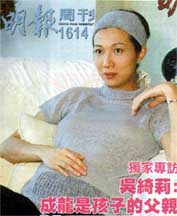
At the time, Elaine was single and six months pregnant.
Rumors were swirling around about the identity of the father and the
paparazzis were camped out outside her apartment. So Elaine had
basically locked herself in and refused to come out. MPW reporter Wong
Lai-ling was able to obtain permission for an exclusive interview. She
recounts that event in the most recent issue of MPW.
At first, Elaine Ng was tense and evasive. Her answers were vague and uninformative, and it took a while for her to relax.
Elaine found out that she was pregnant more than two months in. Her
first reaction: "I don't know what to do. This was an
accident." Who was the first other person to know?
"The child's father." How did he react? "Ha, ha,
ha." She laughed dryly and said nothing for a while. The
question was repeated. Finally she replied slowly: "It was not a
good reaction." Did he ask her to get an abortion?
"Perhaps we have different views about a life!"
Did she change her own mind once she found out how the other party
felt? "I struggled for a while. I talked to my mom.
She is a Christian and a traditional woman. She said: 'This is a
living person. You must act responsibly as a result of your own
actions. You may find it difficult, but you are responsible.' I
thought about it again. If I were only seventeen, I might have been
stuck. But I am already twenty-seven and I can deal with a new life
coming into the world."
Will the child's father be responsible for paying the living expenses of the
child? "He said that it was none of his business. I will
bring up the child. This is my daughter. She shall have my last
name, Ng." How did she feel towards him? Love or
hate? "It is just ordinary. No love, no hate. If I
told you that I was never angry at him, I would be lying. But all that
is in the past."
Then came the crucial question from the reporter: If you claim that you will
act responsibly towards the child, then why can't you deal with the big
question of "Who is the father? Is Jackie Chan the father of your
child?" At that moment, Elaine made a resolution and said firmly:
"Yes. It is true. But I hope that people will not ask me
again. This will be the only time that I answer this
question." Later on, Elaine was interviewed on television and her
response to the same question was a wordless nod.
So that was the substance of the story. Now for the media story.
Because this was an explosive exclusive, the editors decided to increase the
print run by 30,000 copies. The content had to be kept confidential,
especially about the identity of the father. In order to ensure that
that were no leaks, the photographs had to developed and chosen while no one
else was around. The article was written by Wong Lai-ling at home and
then brought back to the office after midnight when no one else was around and
then entered into the computer system.
So Wong Lai-ling worked late that night and went back home early in the
morning to sleep. Meanwhile, the magazine had appeared on the
newsstands. When Wong woke up, she spoke to Elaine Ng, who asked her:
"Were you under so much pressure that you did not dare publish that
sentence?" What!!!??? Wong Lai-ling rushed out to obtain a
copy of the magazine and then saw that only about half the text was printed
-- that most important dialogue was absent! Late in the previous night,
Wong Lai-ling had been unsure about typesetting and forwarded the files (texts
and photographs) to a colleague in the Art Department. In her email
attachment, she omitted the file that contained the important
dialogue. This was the biggest mistake in the history of Ming Pao
Weekly over several decades!
[078] Two Ways Of
Writing A News Report (11/19/2006)
(The
Sun) Yesterday, Chinese Foreign Minister Li Zhaoxing was asked
whether the case of Singapore Strait Times top reporter Ching Cheong has
received attention. But Li Zhaoxing asked the reporters instead: Who
is Ching Cheong? When the varying answers of "a Hong Kong
person" and "a Chinese person" were received, this veteran
diplomat immediately asked the reporters to figure out the status of Ching
Cheong first.
(Apple
Daily) Foreign Minister Li Zhaoxing was at the breakfast
meeting between President Hu Jintao and HK SAR Chief Executive Donald Tsang,
and was therefore asked whether the case of Ching Cheong came up.
Instead, Li asked the reporter: "Who is Ching Cheong?" When
one reporter said that he was a special correspondent for Singapore's Strait
Times, Li asked: "So is he a Chinese citizen or foreigner?"
When he heard one reporter say "a Hong Kong person" and another
reporter say "a Chinese person," Li immediately asked the
reporters to figure out the status of Ching Cheong before asking. Then
he left the scene without answering the question. Since Li was present
at the Hu-Tsang meeting and he asked the reporters, "Who is Ching
Cheong?" this makes one wonder if Tsang brought up the case of Ching
Cheong at the meeting.
[077] Taiwan By The Numbers (11/18/2006) (ERA TV) (836 persons age 20 or over interviewed by telephone on the evening of November 16. Sample was drawn using the residential telephone directory with the last two digits being randomized)
Q1. Taipei city mayor Ma Ying-jeou said that he was unaware of the falsified receipts used to claim special funds. Do you believe Ma Ying-jeou is innocent?
Yes 41%; No 27%; Don't know/refused 32%
Q2. Taipei city mayor Ma Ying-jeou is embroiled in this special fund business. Are you satisfied with his crisis management?
Yes 34%; No 36%; Don't know/refused 30%
Q3. Do you believe that Taipei city mayor Ma Ying-jeou should resign as a result?
Yes 17%; No 58%; Don't know/refused 25%
Q5. Comparing the case of President Chen Shui-bian's state funds and Ma Ying Jeou's special funds, which of these cases have a greater impact on the city mayoral elections in Kaohsiung and Taipei?
Chen Shui-bian 50%; Ma Ying-jeou 10%; Same 16%; No impact from either 4%; Don't know/refused 20%.
(China Times) (1,019 persons interviewed by telephone on the evenings of November 15-16. Sample was drawn using the residential telephone directory with the last two digits being randomized)
Q. Do you believe that the Democratic Progressive Party is clean and uncorrupt?
Yes 14%; No 68%
[in June 2006, the same question had Yes 13%; No 56%]
Q. Do you believe that the KMT is clean and uncorrupt?
Yes 23%; No 53%
[in June 2006, the same question had Yes 16%; No 49%]
Q. Which of the four major political parties do you trust to rule?
KMT 45%; DPP 11%; PFP 3%; TSU 2%; None of them 20%.
[076] Zhang Yu's
Videos (11/18/2006) Actress Zhang Yu has been going around for
years complaining against certain directors and producers for demanding
sexual favors in exchange for acting assignments. So what?
Everybody knows about that, beginning with the Hollywood casting
couch. After a while, all this talk gets boring even though Sina.com
devoted a special section to her.
So Zhang Yu has just upped the ante. In a blog
post, she announced: "I will not be a silent woman
anymore. I will show everything." She then links to a video
hosted at YoQoo.com.
That video has been viewed more than 300,000 times already within 12
hours. Here are some screen captures.

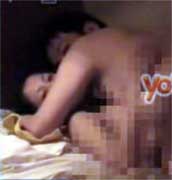
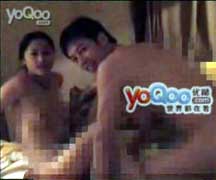
Zhang Yu claims that this will just be the first of many more
episodes. At what point will the "authorities" step in?
[075] They Hold
Elections (11/18/2006) Female writer Tie Ning has just been
elected as chairman of the China Writers Association. Here is Jiang
Xun's description of the process in Yazhou Zhoukan (Asia Weekly; November 26,
2006, p.48-49).
The China Writers Association has 7,690 members. In its more than
fifty years of history, there has only been two chairmen: Mo Dun and Ba
Jin. The previous chairman Ba Jin passed away a year ago. At
this year's conference, 953 representatives got together to elect 199
national committee members. In this vote, one can vote for as many
people as one likes. Among all the vote-getters, Tie Ning came in dead
last. Everybody in the new national committee received more than 800
votes whereas Tie Ning got 790+.
In the next phase, the chairman was to be elected. Again Tie Ying
received the lowest number of votes at 161. So how did Tie Ning wind
up as the chairman whereas all the other vice-chairmen got more than 170
votes? Why even pretend to have an election when the outcome was
fixed?
During the discussion of the list of candidates, the major figure was then
China Writers Association vice-chairman Wang Meng. But a group of
veteran writers wrote to state their objection. So the final decision
was this -- anyone older than seventy years old will be excluded from the
national committee. Thus Wang Meng and eight others became 'honorary'
vice-chairmen of the national committee and 117 persons were 'honorary'
members of the national committee.
Related Links:
Writer
Tie Ning becomes first female chairman of China Writer's Association
David Bandurski, China Media Project
China
Writers' Association: what good is it? Joel Martinsen, Danwei
[074] The South Route
007 (11/18/2006) (Taipei
Times) Back in July, legislator Chiu Yi had described Taiwan
businessman Chiu Ta-wei as the person who was conducting secret diplomatic
missions under project "South Route." According to Chiu Yi,
this project was a cover for the president's embezzlement of state affairs
funds. The case broke open when Chiu Ta-wei's wife Ligi Lee found out
her personal expenses had been turned over by her cousin Lee Bi-chun to the
First Lady in order to get reimbursement from the state affairs account.
(Apple
Daily) Yesterday morning at 130am, Ligi Lee brought along
about ten people to the place of a woman named Hsia. The group entered
the apartment through the unlocked door and found Chiu Ta-wei naked and Hsia
in her pajamas. Hsia said in terror: "Who are you people?
What are you doing?" Chiu dashed into the bathroom and locked the
door. Lee asked her companions to kick down the door and took
photographs. Lee looked at Chiu and said:
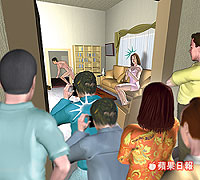
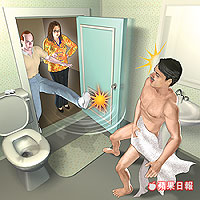
[073] The Sneak Smoocher (11/18/2006) (Apple Daily) The 24-year-old man who sneaked a kiss on singer Ella Koon (see Comment 200610#030; YouTube video at (
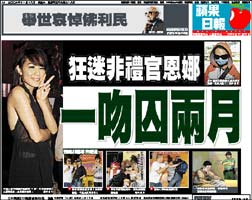

[072] The
Transvestite Prostitutes of Fuzhou (11/17/2006) (NetEase)
In Fuzhou, the police decided to run a sting operation against prostitutes
that evening. An undercover policeman showed up at the Guangminggang
park. Two "women" then approached him and propositioned
him. The militia police quickly charged in. When one of the
"women" was arrested, a wig fell off. The suspect quickly explained: "I'm a man." Although the two men looked and
sounded like women, their fake boobs fell off as soon as they pulled up
their shirts.
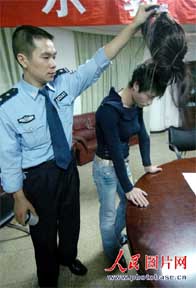
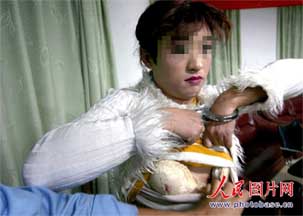
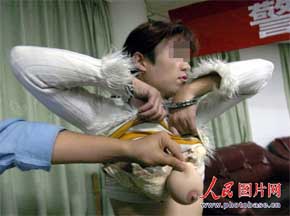
What were they doing there??? The police is investigating.
[071] How To Block An Intersection (If You Must) (11/17/2006) (Phoenix TV) In Nanchong city, Sichuan province, a taxi driver was stabbed by a robber for refusing to hand over his money. Other taxi drivers called 110 emergency police response When the police arrived, it was 30 minutes later and the victim had died. To show their dissatisfaction, the taxi drivers of Nanchong blocked the major intersections.
[070] Revised Statistics (11/17/2006) With respect to Statistics of Mass Incidents, I have received detailed feedback and the following revision has been made to distinguish between "mass incidents" and "public order disturbances."
A 'mass incident' refers to the incident (such as protest, demonstration or assembly) which usually involves large numbers of people (e.g. 10,000 people rioting at a university over their diplomas).
A 'public order disturbance' is an individual crime and the number of people do not come into it. There are 28 articles and 37 crimes written into the People's Republic of China Code of Criminal Law. The categories include provocation/troublemaking, gambling, running underworld criminal organizations, obstruction of official business, fighting with weapons in a mob fight, delaying the delivery of mail, holding mass orgies, computer hacking, making and selling fake police uniforms, forging ID cards, burning national flags, corpse desecration, etc.
For example, if I was caught selling fake police uniforms, then I am the sole criminal. This is a 'public order disturbance' (Article 281) because my action caused social mistrust of people in uniforms. The number of actual people who lost their trust is not known with any precision. As another example, if a group of five hackers went and crippled the People's Daily website, they would be guilty of "disturbing the public order" (Article 285 and Article 286 of the PRC Code of Criminal Law). This is one incident with five criminals. How would that be counted in the statistics? One or five? But the number of people affected is not known with any precision. Neither of these two examples may be considered "mass incidents" because the number of public members affected is not known to any precision.
It was therefore wrong to assume that "mass incidents" are a subset of "public order disturbances." No, these are in fact two different concepts that work on different bases.
[069] Another Internet Manhunt (11/17/2006) Late last month, a Beijing blogger Lao An published some street photographs at A Foreign Lady in Beijing about a foreign female bicyclist's argument with a Chinese driver over his presence in the bicycle lane. An update has been published at China Daily.
A Beijing driver who infamously threw aside the bicycle of a foreign woman who had blocked his way has apologized to her on television. The driver, surnamed Niu, apologized in response to a barrage of criticism after photographs of the incident were plastered on the Internet. "I must say sorry to the foreign lady. I acted too rashly at that time. I shouldn't have thrown her bicycle to the ground," Niu said on a popular Beijing TV programme.
The incident occurred after the woman confronted Niu, assuming he had been driving in a bicycles-only lane. Niu said he had not violated any traffic rules. Traffic police testified that he had been driving on a road of mixed traffic, open to both cars and bicycles.
The incident had hurt him and his family greatly, said Niu, noting he had changed his home phone number. Internet users had bombarded him with phone calls denouncing his behaviour of October 20.
... "All netizens please help find the identities of the driver and the foreign lady," said one posting. The much-read posting, written by popular blogger Mo Jie, also called on netizens to denounce the driver. "We must get him to realize that his behaviour is smearing the country's image and the face of Beijing," said the posting.
Netizens quickly answered the calls to name the driver, posting his home phone number and other personal information on the Internet. Some netizens said the foreign woman worked for an American company near the scene, but no further information about her was revealed.
"The incident shows two things," says one of the blog articles. "It shows the Chinese are self-reflecting people and readily accept positive criticism. It also shows the terrifying power of the Internet, its power to mobilize people and bare secrets."
How did it work? The photograph of the driver was published, for one thing.
While the blogger did not originally published the license plate number, he provided it to Southern Daily for their front cover story!
[068] They Complain (11/16/2006) "My Complaint About EastSouthWestNorth"
Letter #1: I kept my silence when EastSouthWestNorth announced he wanted to take over society's eyes, ears, mind, and spirit. I did nothing when he tried to take us over the edge of the abyss of mental serfdom. But his latest criticisms are the straw that breaks the camel's back. Let me begin by citing a range of examples from the public sphere. For starters, I believe in "live and let live". EastSouthWestNorth, in contrast, demands not only tolerance and acceptance of his sermons but endorsement of them. It's because of such careless demands that I insist that his attempts to leave behind a legacy of perpetual indebtedness everywhere are much worse than mere stoicism. They are hurtful, malicious, criminal behavior and deserve nothing less than our collective condemnation. Lastly, EastSouthWestNorth's constant whining and yammering is a background noise that never seems to go away.
Letter #2: I occasionally receive inquiries from people who have read my previous blog posts and want to know why I insist that I sincerely intend to exercise my franchise to reveal the nature and activity of EastSouthWestNorth's goombahs and expose their inner contexts as well as their ultimate final aims. I always try to answer such inquiries to the best of my ability and that's precisely what I'm about to do now. Wait! Before you dismiss me as infantile, hear me out. EastSouthWestNorth's more than viperine. He's mega-viperine. In fact, to understand just how viperine EastSouthWestNorth is, you first need to realize that he keeps saying that he is forward-looking, open-minded, and creative. For some reason, EastSouthWestNorth's hangers-on actually believe this nonsense. Although EastSouthWestNorth obviously hates my guts (and probably yours, as well), EastSouthWestNorth is locked into his present course of community destruction. He does not have the interest or the will to change his fundamentally dotty obiter dicta. I hope I haven't bored you with yet another blog post about EastSouthWestNorth. Still, this post was the best way to explain to you that I am highly critical of those who tolerate or apologize for people who work with EastSouthWestNorth.
Want more of the same? Do-it-yourself with Scott Pakin's automatic complaint-letter generator.
[067] Taiwan By The
Numbers (11/16/2006) (TVBS)
(928 persons age 20 or older interviewed on the evening of November 15)
Q: Approval rating of Ma Ying-jeou
43% (compared to 52% in October during the siege of the President's
Office)
Q: Is Ma Ying-jeou clean?
Yes: 63%; No: almost 20%.
Q: Do you believe in Ma Ying-jeou when he said that he was not corrupt
with respect to the mayor's special fund?
Yes: 57%; No: 27%
Q: On the problem with receipts, is Ma Ying-jeou the same as Chen
Shui-bian?
Different: 50%; Same 33%.
[066] Underwear MM (11/16/2006) My goal is to sit here and record the barriers of the Great Internet Firewall break down bit by bit. This is not about 'subversive speech' creeping in, but all the other social taboos being breached one after another. Following Wilhelm Reich, I never believe that there is a difference between political life and the rest of life. On this date, I note the emergence of the Underwear MM blogger (




[065] Free Newspapers in Hong Kong (11/16/2006) (Next Weekly; issue #871 November 16, 2006, p.54-56)
Here are the estimated daily operational details for am370:
am370 Headline Daily Metro Circulation 280,000 600,000 300,000 - 400,000 Distribution Points Distributed by hand outside MTR stations and inside KCR stations; placed at managements offices of housing estates Manually distributed at housing estates Sole rights to distribute inside MTR stations; also distribute by hand outside MTR stations Contents Targeted towards middle-class with focus on financial news and the Central Blogger and others looking for hot topics Large amount of local Hong Kong and entertainment news. Based its appeal on volume. Mostly local Hong Kong news, with some international news Ad pages 11 full pages; 16 half pages 17 full pages; 15 half pages 18 full pages; 15 half pages Ad rates (per page) HK$10,000 - 20,000 ~HK$40,000 ~HK$40,000 Net earnings Losing HK$1.6 million per month Losing money by in mid-year report, bringing down overall profit of Sing Tao down to $4.3 million Reached breakeven in 14 months, but no detailed information.
- Printing and paper (based upon HK$0.50 per copy and 280,000 copies per day): HK$140,000
- Editing, reporting and ad sales (40 editors/reporter and 10 ad salespersons at HK$15,000 per month): HK$37,500
- Shipping: HK$60,000
- Hand distributors (400 persons at HK$35 per hour for 2 hours per day): $28,000
- Other advertising fees (e.g. distribution inside KCR stations): $14,500
- TOTAL EXPENDITURES: HK$280,000
- AD SALES REVENUE: HK$200,000
- NET LOSS PER DAY: HK$80,000, which translates to 20 x HK$80,000 = HK$1.6 million per month.
[064] Ma Ying-jeou:
The Case for Moral Relativism (11/15/2006) Now it is the turn
of Taipei City mayor and KMT chairman Ma Ying-jeou to face questions about
misuse of "special government expenses."
There are two issues. The first issue is that some of his expense
allowance is directly paid into his personal bank account instead of being
used for public affairs. In other words, he is treating it as
additional income. In his own defense, Ma said that he is doing what
6,500 other officials (including Vice-President Annette Lu and Premier Su
Tseng-chang) are doing. "If I am corrupt, everybody else is
corrupt too." So that is the first example of moral
relativism. So it is not about the absolute right or wrong; it is
about common practice -- if everybody steals money, then it is alright for
me to do that too.
The second issue is one official has been falsifying documents in accounting
for the expenses. It seems that rather than dealing with a whole stack
of petty cash receipts (such as buying a box lunch, etc), this official
lessened his workload by submitting unrelated receipts in larger
amounts. The original receipts are all there, so this is not a case of
embezzlement. However, the city government admits that documents were
falsified, and that is a crime.
Will Ma's supporter resorts to a defense based upon moral relativism.
Previously, President's Chen Shui-bian's defenders have used moral
relativism, as in "Corruption was more blatant and extensive before
Ah-Bian became president, so why pick on Ah-Bian now?" So Ma's
supporters may say, "Ah Bian's underlings can falsify documents and
commit perjury, so why pick on Ma Ying-jeou now?" This has not
happened yet, but that would be very ugly.
Here is another piece of moral relativism used as political weapon. Ma
Ying Jeou is about to finish his term as Taipei city mayor. What if he
were to get up and say, "Someone in my office decided to take shortcuts
in filing paperwork without my knowledge. That is very wrong. As
the top city official, I own the ultimate responsibility. Therefore, I
apologize to the people and I step down from my job ahead of time. I
do this in the interest of sparing the government and the people from more
political squabbling. This will allow the government to get back to
its mission of serving the people. That is what matters most, not my
personal vanity." If the mayor of Taipei city can say that, why
can't the President?
[063] Fortune CSR Rankings (11/15/2006) (Southern Metropolis Daily)
[in translation]
The American magazine Fortune published its rankings of "2006 corporate social responsibility." China National Petroleum Corporation and State Grid took over the last two positions (#63 and #64). This is quite different from their rankings of #39 and #32 in the Fortune Global 500 list.
When we speak of corporate social responsibility, we immediately think about this incident: the contamination of the Songhua River from the explosion at the China National Petroleum Corporation. That did tremendous damage to the environment and disrupted the lives of millions of citizens. We can also recall the debate about how excessive pay for state enterprise employees from the story of "Electric meter reader gets paid 100,000 RMB per year." The consequence of the excessive pay are borne by the customers who have to pay higher rates. Therefore, neither company needs to defend or challenge why they are at the bottom of the rankings, because it is their shame!
But I always believe the problem with the state enterprises is one about the government and not the companies themselves. Without the protection of the government, wouldn't China National Petroleum Corporation be bankrupt as a result of the Songhua River contamination incident? Without the government, can the state monopolies (in electricity, tobacco, telecommunications, etc) be monopolies and so can they have the money to pay those amazingly high salaries to their employees?
[062] Gödel's
Incompleteness Theorem (11/15/2006) (Wikipedia)
Gödel's first incompleteness theorem is perhaps the most celebrated result in mathematical logic. It states that:
For any consistent formal theory that proves basic arithmetical truths, it is possible to construct an arithmetical statement that is true1 but not provable in the theory. That is, any theory capable of expressing elementary arithmetic cannot be both consistent and complete.
This comment has nothing to do yet another butchered/tortured interpretation
of Gödel's mathematical theorem. This is instead a statement about
how reality is perhaps unknowable in spite of the efforts of journalists.
The empirical case study is the personnel moves at the South China Morning
Post. Upon information and belief, certain members of the Sunday
Morning Post either left voluntarily or were dismissed. This caused
certain staff members to be dissatisfied and they took action by contacting
the Chinese-language media. The Chinese-language reports (in Apple
Daily and Ming Pao) were translated here at Comment
200611#049.
This is about what one can expect by interviewing one or more sources from
one side via telephone and asking what are believed to be the right
questions; meanwhile, the other side declined to comment. The
reporters referred to these conditions, but the reality is that the
information is asymmetric. In retrospect given other developments,
parts of the Chinese-language reports may be subject to misinterpretation.
A much more thorough job is done by Asia Sentinel at No Joking Please, Were Journalists,
because the reporter was able to interview five SCMP members and view all
the relevant documents (e.g. the mock-up SCMP front page and the Mark
Clifford email). If we compare the gap between the initial
Chinese-language reports and the Asia Sentinel report, then it leaves us
with uneasiness about everything that we read in newspapers. Which end
of the spectrum are we typically getting? We don't know because we are
not God (or Gödel). Most of the time, we will be left to our own
devices with our own "plausibility tests."
[061] I Have So Many Questions (11/15/2006) (Rose Garden)
[in translation]
I think that many of you know about the Sichuan story (note: Comment 200611#051). I saw the Internet public opinions and I visited the official news websites as well as other media outlets in order to read the various viewpoints. Since reports reflect the leanings of the respective positions of the sources, I wanted to find reports that are more neutral and complete.
So I read the official news reports. I got the idea that the child drank the pesticide at 16:40, he was brought to the hospital at 18:30 and he expired at 19:30. There was only a description of the clash with excessive action between the family members and the doctors. The mainland China mainstream media carried the standard report and they did not mention that this became a mass incident. Hong Kong and overseas media interviewed local officials by telephone to confirm the mass incident, but were told that no mass incident took place.
But certain details raised questions. For example, the local government said that the hospital was still functioning normally, but the non-mainland reporters found certain hospital workers (who did not want their names revealed) who said that the hospital was not providing outpatient services for the moment. So you can imagine and conjecture, and the question is, Who is lying about the present state of the hospital?
As for whether the hospital rendered treatment in a timely manner, the government formed an independent panel of experts who concluded that the cause of the death was the severity of the condition in spite of the hospital doing its best. The local newspapers therefore said that "one cannot speculate or spread rumors based upon subjective opinions, because it will mislead the public and disrupt social order."
At this time, my questions are: Why are such rumors so easily believed by the people? Why do most people here not trust hospitals? Could it that too much discontent has accumulated, so that it is all released in this moment? If so, then shouldn't the local officials responsible for overseeing medical and healthcare really reflect on their work?
Since the newspaper were publishing editorials about the case, this proves that the case was serious. I do not believe that a simple dispute about medical treatment requires newspaper editorials and an investigative panel of experts. Even if there was a mass incident, there was no need to cover it up. These days, the more someone tries to cover up, the quicker rumors will fly and things will get worse. Such examples have always existed in China. I remember the Songhua River incident last year. If the relevant departments had responded quickly and increased transparency, the matter would have moved in another direction.
But I still have another question -- if there really was a dispute, then why did it turn into violence? Faced with an assembly of citizens who are possibly emotional, the local officials are being tested for their administrative ability. If these officials cannot appropriately and correctly handle the situation, then shouldn't they be held responsible for the escalation into violence?
I do not believe that in each real clash, the socially vulnerable group is always right. If that is the rule, then this society is unhealthy. So that is why government officials complain about their situation because people always assume that they are wrong. The problem is whether the socially vulnerable groups feel that they have to resort to extreme methods because they have lost confidence in the judicial system and they have no other means to protect their rights. If so, then the government officials must ask themselves why they let the citizens live in such a social environment.
I do not believe that it is right to employ extreme methods to protect one's rights. But if these people lack any concept of the rule of law, then the government officials should create the right environment in which the rule of law works and explain to the people how it works. If people do what they do because they have no other choice, then the government officials need to reflect every time that a clash occurs.
[060] Video Clips From Gaza (11/15/2006) (Ah Q Weekly Magazine blog)
[in translation]
Just then, the television program "Appointment in Shangdong/Henan" showed a story about a Chinese war journalist in Gaza. I did not catch the episode title and therefore I skipped the name of the reporter. The story was shocking, so I will narrate some of the segments for you.
Segment 1: One day, the reporter was filming in the street. Someone tapped him from behind. The reporter turned out and saw a child. The child pointed at something in his hand and said, "This is a hand grenade." The reporter looked at it and said, "Hmm, I know." Then he turned out to continuing filming. The child tapped him once again and said, "This is a hand grenade!" Then the child stared into the questioning eyes of the reporter, pulled the safety pin and threw the hand grenade behind him. A loud explosion followed:
Segment 2: One day, the reporter was filming in the middle of the street. Someone behind him yelled: "Don't move! Raise your hands!" The reporter turned around and saw a child pointing a gun at this head. The reporter said: "I don't like people pointing guns at my head. Fake guns will do it." So he grabbed the gun from the child's hand. Then he realized that it was a fully loaded gun with the safety catch off ...
Segment 3: The reporter heard that Israel will surround and clean up a certain refugee camp. So he entered the refugee camp beforehand and tried to find a good spot to take photographs from. Two locals came over and said, "Hi, Japanese?" "No, Chinese." "Okay, let's come to my house and have a cup of coffee." This is the typical way to treat guests, so the reporter went with them. Once they turned around the corner, the two Palestinians turned around, pulled out guns and pointed them at the reporter's head. One of them said something in Hebrew. Later on, the reporter found out that the phrase was "Kill him." According to the reporter's analysis afterwards, they did not shoot because he had no idea what the phrase meant. The reporter then said: "Foreign languages are not good things. It is better not to learn them. Knowing putonghua is enough."
Aren't these segments fun? This is a true story that happened in our world ...
[059] EasyFinder
Strikes Again (11/14/2006) (Sohu.com via Wenxue
City) Even as EasyFinder has formally landed in court for the
Gillian Chung article, this week's issue was another one that made copies of
EasyFinder hard to find at Hong Kong newsstands.
The front page-cover story is an investigative report on Li Yapeng, Faye
Wong and their daughter with snoop photographs taken over several months in
Beijing and the United States.
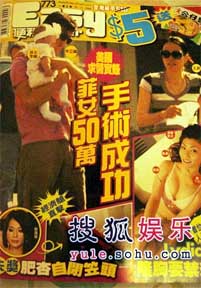
According to the EasyFinder reporter, this was their second trip. On
the first trip, they took pictures of the Children's Hospital where the baby
reportedly underwent surgery to repair her cleft palate, but they had no
real story otherwise. Then they saw the Sohu.com photo of Faye Wong
provided by an American netizen and so they decided to make a second
trip. They visited the restaurant at which the photograph was
taken. They used many means and they located the house where the
family was staying. On October 22, October 24, November 9 and November
11, the team took photographs of the family in the United States and
Beijing. Their boss was happy and issued them material rewards.
In reaction, Li Yapeng's agent said: "I was not there in the United
States, so I don't have an opinion. The text probably contains much
imaginary things and speculations." Then she laughed and said:
"They are quite 'professional' because they know enough to blur out the
baby's face." Then she said: "This affair has been going on
long enough, Can we put a stop to this and give Li Yapeng, Faye Wong
and the child some space to live quietly?" She hopes that people
would pay more attention to the "Cleft Palate Foundation."
[058] My Hiking Trip
(11/14/2006) Well, it never happened. But this is a
media-related question based upon my personal experience. On this past
Sunday afternoon, my plan was to take the #81 bus from Kowloon, get off at
the Shek Lei Pui Reservoir and then take a hike in the Kam Shan Country Park
trail. This would have an easy hike because most of it is on paved
road and covers many reservoir dams. So I stood at the Nathan Road bus
stop north of the Prince Edward MTR station and waited for the bus.
For more than half a hour, not a single bus (#81 or
anything else) came down Nathan Road. Along with many other angry potential bus riders, I
could see that all buses were being diverted off Nathan Road down at the Lai
Chi Kok junction. No bus was ever going to come. So I abandoned
my plans.
What else can I do on this Sunday afternoon? I decided to take a walk
up Cheung Sha Wan Road to the Golden Shopping Arcade to check out the
technology products (computers, games, etc). On the way, I found out
that the buses were being diverted because a street march was scheduled at
that time. Anyway, I went to the Golden Shopping Arcade and saw all
the ridiculously marked-up prices for Sony PS3 game stations that the
vendors probably did not really have. On the way back, I made the
mistake of hopping on a bus. I was stuck on this bus for more than
half an hour, because the march was now in progress and all vehicular
traffic was held up. Eventually, I asked the bus driver to open the
door and let me walk home. On the way, I observed that there were
major traffic tie-ups in all directions on account of this march. This
was on a Sunday, but the traffic tie-up was the worst that I have ever seen
(for example, all the way down Prince Edward Road eastbound as far as I can
see from the top of the pedestrian bridge).
So what? On the next day, I tried to read about this demonstration
march of thousands of people in all the online newspaper websites.
Thousand of people at this march means that the number was greater than some
of the "universal suffrage" marches widely reported by the global
media and definitely more than the four or five people of the "April
Fifth movement" charging official receptions with black paper
coffins. All of the aforementioned incidents were fervently covered
regularly by the local press. But there was
nothing whatsoever in the local media about this particular march: from Apple Daily to Ming Pao to Sing
Tao to Oriental Daily to Ta Kung Pao. Never mind the English-language
South China Morning Post or The Hong Kong Standard. And you know the
score: if it is not reported, it didn't happen!
I leave it as an exercise: Why did a thousand-person-strong street march
get totally ignored by Hong Kong media? If the media outlets advertise
themselves as reporting all the news that is worth reporting, then why was
this a universal exception? The answer should be obvious ...
Hint: If you lie often enough, nobody will ever believe you. More
precisely, if your first name is "truth" and your practice is
"lies," the media get disinterested.
[057] An Official Publication (11/13/2006) (He Weifang's Blog)
[in translation]
A few days ago, the telephone rang.
"How are you? Is this Professor He Weifang?"
"This is he. You are ..."
"I am XXX with the China Justice Administration magazine at the Ministry of Justice. I would like to discuss something with you."
I know about that magazine. I even attended one of their forums several years ago. "Please go ahead."
"It is like this. Our magazine would like to expand the list of our directors. You are responsible for the Peking University research center on the judicial system. We would really like to get your consent to list your unit as part of the board of directors."
"But ... what does a director have to do?"
"Oh, mainly to participate in the ordinary activities of our unit."
I was a bit dubious. Previously, this publication had organized some evaluation of the articles in the magazine, but I was invited personally to participate. How can my unit participate?
"That is to say, you will list our center in your magazine in order to show influence. Anything else?"
"Thirty thousand RMB per year."
I was suddenly delighted. As a director only in name while making 30,000 RMB, it is worthwhile to consider this because of the additional research funds.
"It is not a lot. But we need to organize some events through the year. Therefore, each director unit pays 30,000 RMB. That is not a lot."
Then I understood -- we had to give them 30,000 RMB. Oh, what a way to make money!
"Sorry, there is no need to say anything more. Please tell your boss that we will not participate in your so-called board of directors. Furthermore, what you are doing is really dreadful. Even if we have the money, we won't get you a cent! Bye!"
I hung up the phone and I was pensive. The official publication from the legal research center of the Ministry of Justice dared to gather money in such an open manner. The board of directors is in fact a list of donors. The Ministry of Justice is an organization that receives money from the state, so that its subsidiary organizations are adequately financed by taxpayer money. But this magazine is trying to make a profit on its own, so where is the legitimacy? Besides, this is a purely official publication without any theoretical depth and readable articles. It was no honor to be listed in the board of directors. It is amazing that the magazine could even dream up such a gimmick.
These days, state units are becoming more and more like private enterprises, while private enterprises are often like official units. This is a messy situation.
[056] It Was A Magnet
(11/13/2006) (Rednet)
In July 2006, a video clip appeared on the Internet in which an 84-year-old
man from Wuhan showed how to topple bricks with a wave of his hand from
several meters away. He could even move buckets of water from
afar. So was this the legendary qigong?

You can view a video
of a news program in which the 84-year-old does his thing.
So a news reporter contacted a magician and sought his advice. The
magician said that he can do that too, and it is as simple as embedding
magnets in the bricks and the water bucket. The brick trick is a
matter of getting a collaborator to turn on the magnet (which is timed by
the sound that the performer was making as he got ready). The bucket
trick is a matter of setting up a rail underneath the table and guiding the
magnet along the rail.
Based upon this information, the reporter went back and checked the
bucket. Yes, there was a piece of magnet. He then checked the
bottom of the table. Yes, there was another piece of magnet.
When confronted, the old man said: "Those were just performances.
There is not such thing as extraordinary powers in the world!"
[055] Purse Snatching in Beijing (11/13/2006) (Star Daily via Wenxue City)
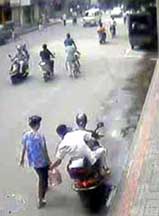

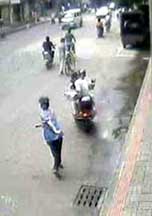
The screen captures were supplied by the Beijing police. But what good does this do? The two perpetrators were unidentified and the motorcycle had no license plate.
[054] Be My Guest (11/13/2006) (
《志雲飯局》)would air. The reply was: "No idea!" Since this was an opportunity to read the boss's mind beyond his regular column, it was strange not to remember the broadcast time. Either the person knows exactly what the boss thinks or else the person intends to utilize alternate means of viewing such as YouTube.(in translation)
Yesterday, I had lunch with a senior person at Apple Daily. By the way, I asked him about when the Jimmy Lai interview on the TVB Lifestlye cable channel program Be My Guest (
Unfortunately, I have not been able to locate the Jimmy Lai
interview on through any alternative media. Therein lies the problem:
YouTube is bottom-up through individual contributions and that means not every
television show will show up.
What is so important about this one cable television program with a miniscule
audience rating? It is not the audience size but the legendary statement
into the public record. This is the moment when Jimmy Lai, the chairman
of Next Media, made the statement with respect to Gillian Chung affair.
It does not matter how many people saw the actually show; the relevant number
is the number of media commentators who refer to this historical moment.
And I haven't seen it!!!
Related Link:
[053] French Poetry (11/12/2006) (NUBB; Forum China.com) When Shang Wenjie won this year's Super Girl contest, her Fudan University professor praised her being among the "top 5" of the best simultaneous French interpreters in Shanghai. On her blog, Shang Wenjie published this French poem:
L'inconnu!
Jouvris la fenêtre,
Et fut stupéfaite par létendue du nuage gris.Voilé de terre et de poussière détrempées,
Agonisa le ciel,
Isolé de loxygène.Surprise par un air lugubre, leau de mer se mit à tourbillonner, et soudainement,
Métamorphosée en cyclone, elle flécha le milieu du nuage,
A travers le creux duquel des lueurs de laube pénètrèrent.Le lendemain sannonca.
Already the bricks are flying around on the Internet. How many elementary school grammatical mistakes can be made in such a short poem? If this is the top five simultaneous interpreter in Shanghai, how does the French hope to communicate with the Chinese?
[052] Taiwan By The
Numbers (11/12/2006) (ERA
TV) (828 Taipei city voters age 20 or over interviewed on
November 8-10. The sample was drawn initially from the resential
telephone book, and then the last two digits were randomized)
Q1. Who do you support for Taipei city mayor? (the change from
October 20 survey showed in parentheses)
Hau Lung-bin (KMT): 39% (+3%)
Frank Hsieh (DPP): 20% (+2%)
James Soong (IND): 8% (no change)
Li Ao (IND): 2% (-1%)
Clara Chou (IND): 0.4% (-0.2%)
No opinion/undecided: 29% (-4%)
Q2. Who do you believe will become the Taipei city mayor?
Hau Lung-bin (KMT): 51%
Frank Hsieh (DPP): 13%
James Soong (IND): 4%
Clara Chou (IND): 0%
Li Ao (IND): 1%
Don't know/refused: 31%
Q3: Do you believe that Frank Hsieh should severe himself from President
Chen Shui-bian?
Yes: 51%
No: 14%
Don't know/refused: 35%
Q4. If the pan-blue/pan-green competition tightens up, who would you
support? (base: those who declared previous support for a pan-blue
candidate)
Hau Lung-bin: 82%
Frank Hsieh: 2%
James Soong: 7%
Li Ao: 3%
Don't know/refused: 6%
Q5. If the pan-blue/pan-green competition tightens up, who would you
support? (base: those who declared previous support for a pan-green
candidate)
Hau Lung-bin: 4%
Frank Hsieh: 83%
James Soong: 1%
Clara Chou: 0.4%
Li Ao: 2%
Don't know/refsued: 9%
[051] The Pests
(11/12/2006) There are "Four New Pests" in China, and they are
respectively (Message On Mao's Birthday):
1. Public security/procuratorate/court of law
2. National and local taxation
3. Doctors/teachers
4. Organized criminals
This story is about doctors. (Ming
Pao, Sing
Tao, Boxun,
Boxun)
In the home town of Deng Xiaoping (Guang'an city, Sichuan province), a
4-year-old boy named Xiong Honghui drank a pesticide and was rushed to the
Guang'an City Number Two People's Hospital on November 7. Because the
family did not enough bring money with them (800 RMB for admission), the
hospital refused to pump the stomach of the child until they got the
money. The child died two hours later.
On November 9, the parents played wreaths outside the hospital to
protest. The next day, more citizens joined in to surround the
hospital. Even the students from the nearby middle school came out en
masses. In the evening, the crowd charged into the hospital and
wrecked havoc, destroying medical facilities and equipment. Two
students and one police officer are dead and more than 20 people are
injured. The police arrested more than 20 people. Three police
cars were burned when citizens tossed firecrackers in them.
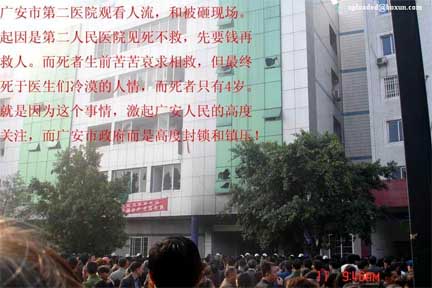
The Guang'an televised news claimed that the hospital rendered help to the
boy for five hours but was successful. The hospital ended up taking a
reduced fee for which the family was grateful. But on the next day,
the family was incited by unknown persons to bring the body to the hospital
and demand compensation. The hospital believed that it did not do
anything wrong and offered to pay 500 RMB as consolation. The hospital
also suggested litigation. The family found this unacceptable and the
clash began.
(ChineseNewsNet)
An independent investigation by four experts from Sichuan University Huaxi
Medical school, the conclusions were (1) the child Xiong Honghui diagnosed
as having died from poisoning by pesticide 3911; (2) the treatment of the
child at the hospital was timely; (3) the child died because of the severity
and progress of his condition. Furthermore, there does not exist any
"pay first before treatment" or "no money, no treatment"
problems. The hospital brought up the costs only after the child
expired (his dad paid 123 RMB when the actual charge was 639 RMB).
[050] Who Are The
Rats? (11/11/2006) So the ongoing discussion in Taiwan
is a constitutional challenge as to whether prosecutor Eric Chen could
interview President Chen Shui-bian during his investigation. If not,
then maybe the entire investigation is null and void, and it will all be one
big happy family again. No, it does not work that way because there is
something very, very obvious that nobody has pointed out. This is my
personal opinion and so you should not take it as truth.
In American law, there is the theory of the "fruit of the poison
tree." In the event of an illegal search, for example, a court will throw out the evidence that has been
obtained -- if the root of the evidentiary chain has been corrupted, the fruit of the search may not be used.
The question here is whether the prosecutor's case can stand on its own
without the evidence provided by President Chen Shui-bian. If you
don't know the background, please read The National Secret Funds Breakthrough,
Mister A, Chen
Shui-bian, Mister A and Mister B and The
Eric Chen Interview.
In the first interview with the prosecutor on August 7, President Chen indicated that a
Mister A was conducting secret diplomatic missions on behalf of
Taiwan. Disclosure of the identity of Mister A could mean that
"people may die." Therefore, President Chen did not say who
Mister A was. The President displayed the prosecutor three payment
vouchers and five sheets that summarized the work. This was a deadend for prosecutor Eric Chen because he
could not proceed any further on the basis of this information.
On August 1, the prosecutor interviewed the Presidential Office's former
bureau chief Tseng Tien-tsu, who said that on three occasions he met with
Mister A in front of the Taipei Number One Girls' School ahd handed a total
of NT$6 million to Mister A. On August 9, the prosecutor interviewed
the First Lady's friend Lee Bi-chun, who said that Mister A had turned over
receipts to her on multiple occasions either near her office or
residence. Both of them provided the
name Kung Kin-yuan for Mister A. Upon investigation, the
prosecutor found out that Kung was out of Taiwan on most of those dates on
which Tseng and Lee made the alleged personal contacts. The prosecutor held
back that information in his hands.
During the second interview (October 27), the President wrote down the name
of Kung Kin-yuan for the prosecutor. This is confirmatory, but it is
immaterial since the prosecutor already knew it. On October 31, the
prosecutor re-interviewed Tseng Tien-tsu and Lee Bi-chun. When
confronted with the fact that Kung was away from Taiwan on those dates when
Tseng and Lee made personal transations with him, both broke down and confessed to perjury and falsifying
documents.
Now I ask you to look at the indictments:
- First Lady Wu Shu-chen -- embezzlement, perjury, falsifying documents
- Former
President's Deputy Secretary-General Ma Yong-cheng -- falsifying documents
- Presidential Office Manager Lin Te-hsu -- perjury, falsifying documents
- Presidential Office treasurer Chen Cheng-hwei -- perjury, falsifying
documents
- Former Presidential Office bureau chief Tseng Tien-tsu -- perjury,
falsifying documents (suspended for two years pending good behavior)
- First Lady's friend Lee Bi-chun -- perjury, falsifying docuements
(suspended for two years pending good behavior)
What is strange and unusual about the list? If
you read the prosecutor's description, the two most active persons were
Tseng Tien-tsu and Lee Bi-chun. Those two made up the detailed history of the
contacts with Mister A. Yet their indictments have been
suspended pending good behavior. Wow! What could that
mean? This is so simple -- Tseng and Lee are cooperating witnesses to
the prosecutor's case! Their non-indictment is contingent upon their
testimony at the upcoming trial. How obvious can this get?
If you go through the time sequence, the prosecutor's case does not rely on
the President's statements during those interviews. Hence, the poison
tree theory was not present. You can bet that during the trial, the
prosecutor will ask Tseng and Lee: "So you lied in your initial
testimony to the prosecutor. Who, if anyone, asked you to do that?" That is an obvious
question for which the equally obvious answer has not yet been
provided. What do you think? My bet -- Tseng will say "My
boss told me to make something up" and Lee will say "My good
friend told me to make something up." "So who is your
boss?" and "Who is your good friend?" Good luck with
this trial
... Oh, forget about the embezzlement charge for now -- the perjury
charge carries a five-year jail sentence already.
P.S. Sorry to interject here with more speculations -- the logical
counterattack is to phone the two cooperating witnesses and tell them,
"Oh, your kids are so cute and you wouldn't want anything to happen to
them ..." With due respect, you can bet that the prosecutor has got
those two witnesses placed under 24-hour-a-day maximum surveillance.
So don't even think about it!!!
[049] Earthquake at SCMP (11/11/2006) (Apple Daily) This is the
[in translation]
There was an earthquake yesterday at the South China Morning Post. Two Sunday Morning Post senior managers -- chief articles editor Trevor Wilson and articles editor Paul Ruffini -- were dismissed. Some veteran workers were unhappy and the word is that they have signed a letter of petition to the SCMP chairman Kuok Khoon Ean to ask him to render justice for two good senior managers.
It has been quite stormy over at SCMP recently. Last month, the Sunday Morning Post chief editor Niall Fraser resigned, and now it is the turn for two more colleagues to leave.
I heard that there was a tradition over at SCMP to present a farewell article on the front page for any colleagues who are leaving. Usually, the accompanying article is sarcastic or cute, including cartoon drawings. This is typical English humor, and it was no exception for Niall Fraser.
I remembered that when Willy Lam, the same thing happened and it was a lot of fun. But this time things went awry. The chief editor Mark Clifford was incensed that he was not consulted about putting Niall's departure on the front page. Trevor and Paul were the instigators, but I don't know if their dismissal was related to this matter. Yesterday Mark sent out an email to the colleagues to tell them the front page of the newspapers is not intended for fun and games! The inside story at SCMP is that Mark and Niall did not get along. I put in a call to SCMP to confirm, but nobody has called back yet by the deadline.
The Apple Daily article may be misleading about what actually transpired. Here is the version in Ming Pao:
[in partial translation]
SCMP has a tradition that whenever a colleague leaves, they will write a farewell article in the form of news report and get it printed like a "SCMP" newspaper front page as a souvenir. Please note that this does not mean that the farewell article is printed in the mass distribution copy. Only a mock-up of the front page is printed. This sort of behavior is fairly typical in the business. Perhaps the 'news report' invoked the name of the new chief editor, someone was enraged, went through an internal investigation and dismissed the two 'authors' immediately. Yesterday Mark Clifford sent out an email to SCMP employes to hint that the actions of certain colleagues affect the image of SCMP negatively and must not be tolerated. Yesterday, Ming Pao attempted to confirm the affair with Mark Clifford, but the SCMP spokesperson responded that there will be no comment about whether employees were dismissed for violating the business code of conduct.
Relevant Link: Hong Kong: SCMP senior editors sacked Mister Bijou (note: PLEASE READ THE COMMENTS!!!); No Joking Please, Were Journalists Justin Mitchell, Asia Sentinel; UPDATE: Standoff at the South China Morning Post Justin Mitchell, Asia Sentinel; Hong Kong subs sacked over c**t leaving page Dominic Pensfold, UK Press Gazette; Clash of civilizations at Hong Kong newspaper Patrick Smith, International Herald Tribune.
[048] Meng's Fans (11/11/2006) There is another type of Internet swarm pursuant to Meng Guangmei and Toiletgate: The latest Chinese Internet swarm ( Jeremy Goldkorn, Danwei). Previously, Meng Guangmei had been the target of Chinese "patriots" on account of her statements about uncivilized behavior on mainland China (see video). On such Internet battles, there will be "angry-young-people" on one side and then there will be "anti-angry-young-people" on the outside. It is very easy to imagine that some of these people may be hired help. In this case, people may have been hired to attack or defend Meng Guangmei. Since hired help do not identify themselves as such, we usually don't know who's what. But now comes an open letter from some hired help (via yWeekend):
[in translation]
I want to tell you about an ugly scandal that I was personally part of.
We are university students. In early September, a friend introduced to Lin Xiuhua. He is the boss of the Xiamen Fengmingchaoyang Performance Cultural Corporation. Through him, we met Nan Lan, who is an assistant agent at the Zhongqianlungde Cultural Corporation in Beijing. She said that she was on business in Xiamen and then she got into the main subject. Our friend had told us about the Meng Guangmei affair so we knew what this was about. The main thing was about the compensation. There were six of us, and we agreed upon 400 RMB per month. The money will come from Lin Xiuhua to us. Frankly speaking, this money represents a considerable sum to students. So the six of us registered ourselves with certain Internet ID's.
During this meeting, we found out that she also hired many hackers to delete the "Red Storm" video clips. For those websites that deletion could not be made, she contacted the website operators and paid money to have the complete videos replaced by other videos with the insulting parts deleted. So this will allow Meng Guangmei to go through her positioning of "she only spoke the truth."
At the time, we published many posts in support of mgm. But a large proportion were deleted by the Baidu administrators. Two of the ID's were even blocked. Since Zhongqianlongde did not see those posts, they said that we did not work hard. In the end, the two people whose ID's were blocked received only 200 RMB, two others got 260 RMB and I and another person got 300 RMB. This was far less than the 400 RMB that we agreed upon. Together, we came up more than 1,000 RMB short.
As for the Xiamen Fengminchaoyang people, they said that this was what they were given. So we were mad, because we only earned so little for work that was against our conscience.
I don't know how many groups like us are out there. I don't believe that this exists only in Xiamen. There must be many more in Wuhan, Shanghai, Tianjin. Some are over at the Tianya forum, and others at Baidu.
We know that we did wrong. I hope you will forgive us. Even while we were publishing posts in support of Meng Guangmei, we were also publishing other posts condemning her. In our hearts, we are just like others. Please forgive us. Thanks.
When Nan Lan was contacted by the Youth Weekend reporter, she laughed and said: "I heard about this from a kid at the company. I have never heard of this Fengmingchaoyang company in Xiamen. This whole thing is too hilarious. We are busy with promoting two other artistes. If I knew how to hire people on the Internet to do this kind of stuff, I would have made those two quite popular by now. We are busy worrying about how to promote them. I asked Meng Guangmei if she has offended anyone here on the mainland. She said, 'I don't know. I doubt it.'"
[047] A
Police Car in Guangzhou (11/11/2006) (Xinhua Forum via Wenxue
City) August 27, 2006. Maidi Road South, Huizhou,
Guangzhou. A police car passed by in front of a netizen's car.
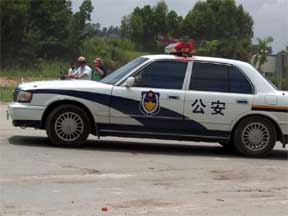
The netizen's car happened to be right behind the police car at this
intersection.
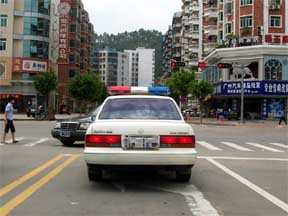
Yes, but so what? You are going to have to take a closer look at the license
plate. Oh, you can't see it because it is wrapped up with a piece of
newspaper! Gee, if the police should see a car like this, they would
stop it for sure. Oh, wait, this is a police car ...

Where did the car go? It ended up at a restaurant whereupon one police
officer and two women in civilian clothes came out of the car and went in.
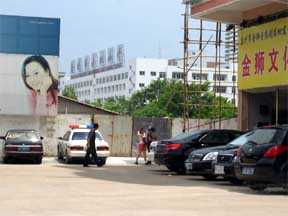
[046] The
Blogger Who Committed Suicide (11/11/2006) (Apple
Daily) On this day, the front page story on Apple Daily was
the suicide of a 22-year-old Hong Kong Univeristy of Science and Technology graduate and Hutchison
Global Communications trainee account executive. The person known as
Felix jumped down 22 flights from the roof of his apartment building.
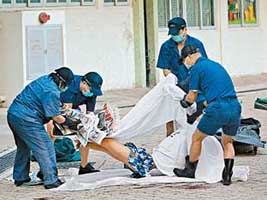
What is the news value in the story that propelled it to the front
page? One, he had a good education and he should have a bright
future. Two, he was under job pressure to produce more sales at
work. Three, he just quit his job three days ago. He attempted
suicide three days ago from the same spot, but was persuaded to come
down. None of these factors may be enough for the front page.
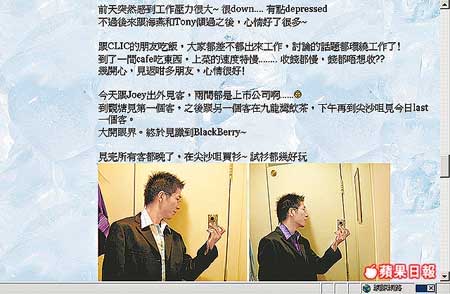
(Apple
Daily) The clincher was that Felix kept a personal blog.
This allows a voyeuristic peek into his state of mind. Actually, the
blog was uninformative because it was not totally apparent from the
published contents that he was suicidal.
Example: "On the day before yesteday, I suddenly felt the pressure at
work. I was down. I was a bit depressed. But then I
chatted with Haiyan and Tony and then I felt a lot better. I had
dinner with Clic's friends. We all have jobs so we talked about our
work. We went to eat at a cafe. The food came slowly ... they
even took a long time to settle the bill. Maybe they don't need the
income? But I was happy to see so many friends. I felt
good! Today, I went with Joey to meet clients. Both companies
are listed on the stock market. I went to Kwon Tong to meet the first
client; then I had tea with another client in Kowloon Bay; in the afternoon,
I met the last client in Tsimshatsui. I finally saw a
Blackberry. After meeting all the clients, I bought clothes in
Tsimshatsui. It was fun trying on clothes."
[045] The Nancheng Television Program Hostess (11/10/2006) 28-year-old Gao Lu (

[044] Television
Patrol Squad (11/10/2006) (Sing
Tao) Several hundred directors and producers from television
stations around China are gathered in Chengdu (Sichuan) to attend a work
conference about how to eliminate vulgarities from television. The
event is organized by the State Administration of Radio, Films and
Television.
The target hereare the entertainment and talk shows as well as narrative
documentaries. Presently, the local documentaries are a blend of
social news and televised drama with the participation of local citizens as
actors. Recently, for the sake of getting higher ratings, the
television stations will bring up sensationalistic topics such as sex,
adultery, eroticism, violence, and so on.
A SARFT official confirmed that during the work conference, teams of
undercover investigators have been sent out all over China. These
teams do not contact any local counterparts. When they arrive, their
job is to stay inside their hotel rooms and watch the local programs.
If they find any irregular programming, they will take a heavy-handed
approach to rectify.
What kind of job is this to sit in a hotel room and watch television all
day? Well, actually, this happens in the United States. A friend
of mine used to work at an advertising agency and her job was to watch
daytime television to make sure that the programs were family-friendly.
If she marked a program as unsuitable, the advertising agency will withdraw
all advertising. Oh, yes, since tens of millions of dollars were
involved, that job was ripe for corruption. My friend got lots of
party invitations (which her boss did not get), and pay up for the
sub-minimum-wages that she was making. When she 'banned' a
program, a producer may file a petition with her boss against her.
[043] Anything For A Bite (11/10/2006) (
[042] The
Official AIDS Survey (11/10/2006) (Southern
Weekend) This an 'official' survey in the sense that it was
administered to about 3,000 Chinese Communist Party cadres being trained at
the Communist Party Schools. These cadres work at the city and county
levels, and all of them are university graduates.
Here are some highlights:
- Fewer than 40% know that an AIDS vaccine does not exist yet
- 30% believe that AIDS patients should be segregated from the general
healthy population
- if a subordinate is infected by AIDS, 50% will "keep the information
confidential and permit the subordinate to continue working"; the rest
chose "fire the subordinate," "publicize the condition"
or "don't know what to do."
- with respect to their personal AIDS prevention behavior, 70% "will
have sexual intercourse with only one partner," 50% "will avoid
extramarital relations as much as possible," 30% "will use a
condom during sexual intercourse."
According to Chengdu Business News, the Sichuan provincial Communist Party
School held AIDS training classes and conducted a "press
conference." At the press conference, an "American
reporter" raised a question that shook up all the attendees:
"Since your city claimed to have no cases of AIDS, then how come the
rumor in society is that your mayor has been infected with AIDS
..." Oh, this was only a simulation exercise in which a deputy
county party secretary pretended that he was an American reporter. The
point of the exercise was to challenge the cadres about how to respond
publicly when their claims are challenged.
[041] The Election of Margaret Chan (11/09/2006) (SCMP) Hong Kong's former director of health Margaret Chan Fung Fu-chun made history yesterday when she was nominated World Health Organisation director-general in a resounding victory that saw her lead all the way in four rounds of voting. Proposed by China, which provided strong support throughout her campaign, Dr Chan picked up 24 votes in the last round, against 10 for Mexico's Julio Frenk, two days after emerging at the top of a shortlist of five. Dr Chan's nomination was supported by the US, it was revealed yesterday. Kuwait's Kazem Behbehani, Spain's Elena Salgado and Japan's Shigeru Omi were eliminated in earlier rounds.
Did the US really support Chan? Well, that depends on which newspaper you read. For illustration, here are two different accounts (and they are different) about the 'secret' balloting.
(Apple Daily) In the first round, it was China 10, Japan 9, Mexico 6, Spain 5, Kuwait 4. So Kuwait dropped out. Of the four Middle East votes that supported Kuwait, 3 went to Mexico and 1 to China. Another vote for Spain now went to China.
In the second round, it was China 11, Mexico 10, Japan 9 and Spain 4. So Spain dropped out. All European votes for Spain then went to China and this proved critical.
In the third round, it was China 15, Mexico 10 and Japan 9. So Japan dropped out. All the 9 Asian votes and 7 African votes went to China.
In the fourth and last round, it was China 24 and Mexico 10. China won. The Europeans played a key role. Mexico's principal support came from Latin America and the Middle East. The reason why the Europeans went for China was that they felt competitive against Mexico's supporter -- the United States.(Ming Pao) In the first round, China got 10 votes. One rumor was that these 10 votes consist of China's own vote plus 9 African votes because China had just forgiven debts totaling US$10 billion to a number of African countries. That is incorrect, because the African countries had informed China that they were committed to Japan. So China got those votes from the Asian countries such as Thailand.
In the second round, China got Bahrain's vote. In the third round, Spain's supporters had to chose among China, Mexico and the US-backed Japan. The Europeans did not want to support US-Japan and Mexico, so China held on to the lead into the next round.
In the fourth and last round, the direction of the 9 votes for Japan was critical. Mexico would win with those 9 votes. At this juncture, the 9 US-Japan votes went to China. China 24, Mexico 10. China wins.
[040] Sharp Daily (11/09/2006) (Sharp Daily) Sharp Daily is the sister newspaper of Apple Daily and it is distributed free in Taipei. It is considered lighter fare and designed to reach young adults who are sick of 'color'-politics. But that does not mean that it is free of politics. But this is the extent of the analysis:
The President's son-in-law Chao Chien-ming and four others are standing on trial for alleged insider trader in the case of the Taiwan Tradiing Corporation. Arguments were heard yesterdat at the district court in Taipei. Chao Chien-ming was chewing gum in the courtroom and the chief judge ordered: "There is no eating in the courtroom." So Chao quickly spit out the gum into his hand.
When Chao Chien-ming was bailed out, his "45 degree head tilt" was criticized as a sign of an arrogant attitude. Previously, he was shaking his leg in court and that was criticized as contempt of court. Then yesterday he was pointed out for chewing gum.
[039]
Xaná (11/09/2006) (Youth Reference via Wenxue
City) At the 24th Annual International Car Show in São Paulo,
Brazil, all the major auto manufacturers were present to exhibit their
products. For the first time, there were Chinese autos there.
The representative was Chongqing's Chang'an company which showed its brand
Chana. This immediately became the talk of all of Brazil.
Why? Because "Chana" sounds like "Xaná" in
Brazilian Portuguese, and Xaná is a term for the female vulva.
Companies which plan to go international ought to check out the possible
local meanings of their brand names. A well-known example was General
Motor's popular Nova car in the United States. In Spanish
"Nova" is parsed into "No va" which says that it
does not run.
Okay, so what is the list of synonyms for "vulva" in Brazilian
Portuguese? Well, you asked for it (via Brazzil):
70-cavalos, áfrica (reference to pubic hair shape), a-mais-pedida, abigail, abocanha-caralho, abraçando-meu-pica-chu, abre-te-césamo, abridor-de-caralho, abrigo-do-bombril, acari-roxo, achô, aconxego-da-piroca, acrobata, aeroporto, aeroporto-de-quibe, aeroporto-de-rolinha, afoga-ganso, afogador, afogador-de-ganso, agasalho-de-pica, agasalho-de-xonga, agasalho-do-joystick, agridoce, aguada, agüenta-toco, aiai, alegria, alegria-ilimitada, aletéia, aliança, alina, alisa-pau, alisa-pica, almofada, almofada-furada, almofadinha-do-prazer, alpargata, alçapão, alçapão-da-felicidade, amante-de-grosso, amansa-cobra, amansa-corno, amansa-macho, amansa-pica, ameba-cabeluda, amiga, amiguinha, amolecedora-de-pau-duro, amortecedor-de-ovo, ana, andressa, anel-da-frente, anel-de-couro, anfitriã, angiova, animal-sangrento, aninha, ana-júlia, apartheid, apertada, apertadinha, apito, apoio-de-cabeça, apontador, aposentos privativos, apresuntada, aputnani, aquela-que-matou-o-guarda, aquela-que-me-endurece, aquilo, aquilo-que-esfola-a-cabeça, arambá, aranha, aranha-fogosa, araponga, arapuca-de-caçar-pinto, arapuca-de-pegar-pinto, arca, arca-conana, ardida, área-de-lazer, areia-movediça, argola, ariranha, armadilha, armadilha-de-cobra, aro, arraia-preta, arranca-toco, arreganhada, arriadora-de-caralho, arrochada (tight), arrombada, arrombadinha, assassina-de-palhaço, assento, astrid, atoleiro, aveludada, azeiteira, b-profunda, baba-rola, babaca, babadeira-do-caralho, babadora, babau, babenta, babona, bacalhau, bacalhau-amigo, bacalhau-assado, bacalhau-mijado, bacalhoada, bacorinha, bacorinho, bacurimba, bacurinha, bacurix, bainha, bainha-de-homem, baitola, baixinha, baladeira, balaio-de-milho, balceira, balseira, banco-de-esperma, banguela, banguela-cabeluda, banguelona, barata, baratinha, barba-cerrada, barba-da-vó, barba-do-bin-laden, barbada, barbiana, barbie, barbuceta, barbuda, barbudinha, barranco-do-morro, barroca (ó), barroca-do-amor, barroxa, bastiana, bate-palma, batedeira, bau-bau, baú, baú-da-felicidade, bebas, beco, beiço, beiçola, beiçolinha, beiçuda, beiçudinha, beju-taiado, bela, belbas, bem-usada, berbela, berbelha, berbigão, bereba, berenice, berimboga, besouro, besteirinha, besugo, beubas, bezona, bi-canal, biba, bibelô-do-papai, bibica, bibil, bibinha, bibirito, bichana, bichinho, bicho-preto, bicho-peludo, bichochota, bichota, bicuda, bife, big-mac, bigaia, bigode, bigodinho, bijóia, bilica, bilongueira, bimba, bimba-grande, bimbinha, bin-laden, birda, bironguina, birosca, birsa, biscaveia, biscoito, bisegre, bisteca, bitiquita, bixana, bixota, bixoxota, biziu, boca-cabeluda, boca-da-loba, boca-da-vovó, boca-de-baixo, boca-de-bicho, boca-de-cabelo, boca-de-encrenca, boca-de-jacaré, boca-de-pele, boca-de-pêlo, boca-de-sacola, boca-de-sapo, boca-de-vampiro, boca-de-veludo, boca-do-corpo, boca-do-enéas, boca-do-inferno, boca-do-jô, boca-do-lula, boca-do-mato, boca-do-mundo, boca-em-convulsão, boca-em-pé, boca-funda, boca-loca, boca-melosa, boca-mucha, boca-peluda, boca-preta, boca-que-baba, boca-quente, boca-sem-dente, boca-sem-dentes, boca-vertical, bocal, boceta, bochechuda, bocuda, bocão, bocó-de-pêlo, boeta, boga, bolacha, bolacha-recheada, bolachuda, bolceta, bolsa-de-valores, bom-bril, bom-que-só, bombril, boneca, boné, boquinha-bonita, boquinha-molhada, borboleta, borboletinha, borburinha, borceta, borrachuda, bota-mangueira, bote, box, bozó, boçanha, braguilha, brasa, braseiro, brasão, braçadeira, braúna, breba, brecha, brecheca, bregueço, brigite (shaved), brinquedinho, brioco, brisda, broca, bronheira, bruculha, bubuca, bubuça, buceta, buceta-de-nóis-tudo, bucetanha, bucetera, bucetilde, bucetinha, bucetinéia, bucetão, bucetão-nervoso, bucetéia, bucetófolis, buceuta, bucha, buchana, buchechuda, buchinha, bucicleide, bucinha, bucleta, bucéfala, budega, buetz, bufante, bulcinéia, buque, buquê, buraco, buraco-cabeludo, buraco-cego, buraco-da-minhoca, buraco-de-avestruz, buraco-de-mandioca, buraco-de-minhoca, buraco-do-siri, buraco-fundo, buraco-liso, buraco-molhado, buraco-negro, buraco-quente, buraco-turbinhado, buraquinho-de-donut, buraquinho-do-amor, buraquinho-doce, buraquinho-inflamado, burzigarga, busanfa, busgreta, bussanha, bustenga, butchaca, butico, buzio, buziu, buça, buçanga, buçanha, buçara, buçarra, bozinha (ó), búzio, cabacinha, cabacinho, cabaça, cabaço, cabeleira, cabeluda, cacetódromo, cachanga, cachimbo, cachorro, cachuleta, caetana, cafeteira, cafofo-particular, caiaia, caixa-de-moleques, caixa-de-pandora, caixa-econômica, caixinha, caixinha-de-ouro, caixinha-de-pêlo, caixinha-de-segredos, caiçara, cajada, caju, cajuda, calígola, camarão, campinho, campinho-onde-a-galera-bate-a-bola, campo-alagado, canal-do-trabalhador, canarinha, caneco, caneco-de-couro, canoa, canoinha, cantaroladora, cantinho-do-prazer, capa-do-facão, capacitor-de-fluxo, capão, capô, capô-de-fusca, capô-de-ka, cara-de-sapo, cara-do-tadeu, cara-preta, caraio-invertido, caramujo, caranguejeira, caranguejo, carequinha, carlota, carlotinha, carne-crua, carne-de-chavas, carne-mijada, carnuda, carolzinha, carrinho-de-cachorro-quente, carteira, cartola, casa-da-porra, casa-de-festas, casa-do-artista, casa-do-caralho, casa-do-periquito, cascata, cascata-dourada, casco-de-veadinho, casco-de-veado, casinha, casinha-de-cachorro, casinha-de-pau, casinha-de-pica, casinha-do-amor, castanha, castelo-do-amor, catarina, catedral-do-amor, catilanga, catrana, caverna, caverna-da-serpente, caverna-do-amor, caverna-escura, caverna-melada, caverna-peluda, caverna-profunda, cavernosa, cavidade-cavernosa, cavidade-escorregal, cavidade-mucosa, caçapa, cebola-quente, ceceta, celeste, cemitério-de-espermatozóides, cemitério-do-cacete, ceta, cetinha, chabonga, chalana, chamelague, chamuscada, chana, chanha, chanisco, chapelaria, charanga, charuto-de-pelo, chassi-de-borboleta, chatinha, chavasca, chavascum-vulvaris-cabeloidea, chaveirinho, chaveirinho-de-cabelo, checheca, chechênia, cheira-caralho, cheiro-de-bacalhau, cheirosa, cheirosinha, cherekin, cherereca, cheroka, chibiu, chica, chincha, chincha , chincho, chineluda, chinin, chinês-caolho, chiquita, chiquitita, chiranha, chiri, chiruba, chixa, chixola, chocho, chochota, chorona, chota, chuarana, chubrega, chuchela, chuchukinha, chulapa, chuleta, chuleta-salgada, chupa-cabras, chupa-chupa, chupa-chups, chupa-cobras, chupa-pica, cicinha, cissinha, cobiçada, cocota, cocozinho, cocó, cofrinho-de-esperma, coisa, coisa-boa, coisinha, coitada, coletiva, colméia, colméia-que-dá-melzinho, comadre, come-pinto, come-todos, comedora, comedora-de-pica, comissão-de-frente, cona, conana, conas, conassa, conaça, conão, concha, conchita, concliz, concriz, conejito, conejo, confronga, conha, conho, conhuda, contra-filé, copa, copinho-de-esperma, copo-de-fazer-milkshake, copo-de-leite, corajosa, coração, coração-de-mãe, corinho, corte-de-navalha, corte-profundo, coruja, cosita, cotota, couve-flor, cova, cova-de-quiabo, cíntiacova-do-defunto, coçadeira, cratera-oculta, cremosa, crespa, crespo, criança, crica, cris, crisinha, crista-de-galo, croca, cu-da-frente, cu-fofinho, cu-larguinho, cu-peludo, cuca, cuia-pra-chá-de-pau-barbado, culpada, cumbuca-de-pobre, cunicha, cunilinga, cururu, cuscuz, cyzinha, danada, danada-de-boa, daniboy, daniela, darcyzinha, dedal, dedicada, delícia-salgada, demais-de-bão, depósito-de-esperma, depósito-de-porra, desbeiçada, descabaçada, descabela-palhaço, descabelada, descascador-de-espiga, descendo-a-ribanceira, desdentada, desejada, desempregada, desgraça-de-macho, despenteada, destroncadora-de-pica, dia-e-noite-no-lambe-lambe, dida, dindinha, dirce, disco, disputada, distinta, dita-cuja, docinho, doidinha, dona-anja, dorinha, duda, el-bigodón, ela, elazinha, elenilda, emengarda, emília, encaracolada, encharcada, encrenca, engata-meu-bem, engate-de-pinto, engenho, engenho-dágua, engole-cobra, engole-espada, engole-pau, engole-quiabo, engole-quibe, engolidora, engolidora-de-espada, engorda-conta, engraçadinha, enroladora-de-croquete, ensopadinha, entra-e-sai, entre-pernas, entrefolhos, envelope-peludo, enxu, enxuga-cabecinha, enéas, erro-de-projeto-(área-de-lazer-próxima-ao-esgoto), esburacada, escolinha-do-careca, esconde-bago, esconde-cobra, esconde-vara, esconde-varas, esconderijo, escondidinha, escorregador-de-rola, escova, escova-da-maria, escovão, escátula, esfiha, esfiha-de-pêlo, esfola-pinto, esfoladora-da-cabeça-do-caralho, esfrega-esfrega, esmaga-pau, esmeril-de-rola, espanta-viado, esperançosa, esponja-de-aço, esporradeira, estacionamento-free, estopa, estranha, estrelinha, eu-quero-é-lazer, eu-tô-maluco, expremedor-de-pica, extinta, fadinha, fagulheiro, faminta, fanico, fatal, faz-me-rir, febra, fedegosa, federal, fedida, fedidinha, fedorenta, fedorenta-do-caralho, feiosa, feiticeira, fenda, ferida, ferida-exposta, ferramenta-de-puta, festa, fica, fidel-castro, fidel-castro (hairy), fifilda, figa, figurinha, filhinha, filé, finca-o-charuto, fiofó, fiu-fiu, flambinha, flavia, flor, flor de maracujá, flor-da-mulher, floresta-amazônica, floresta-negra, floricultura-ambulante, florzinha, fodedoura, foderosa, fofa , fofa, fofíssima, fogosa, fogueira, fonte, fonte-da-vida, fonte-de-ouro, formigueiro, fornalha, forno, frajola, franga, frente, fruta, frutinha, fruto-do-meu-esparro, fruto-especial, fruto-proibido, frítola, fudedor-da-frente, fulana, fundo, furadinha, furico, furingo, furna, furo, fuzilada, fábrica-de-fazer-boneco, fábrica-de-fazer-menino, fábrica-de-goma, fábrica-de-neném, fábrica-de-requeijão, gaiola, galinhineiro, gambá, gamela, ganha-pão, ganha-pão (among prostitutes), garage-a-bites, garagem, garagem-da-frente, garagem-de-piroca, garagem-de-trator, garagem-do-cacete, garagem-do-caralho, garagem-pública, garajinha, garganta-profunda, gaveta, gengiva, gereca, gerimpoca, gerlândia, gertrudes, gigina, gijoka, ginásio, gislene, glosa, goelão, gol, goleira, gomo-de-mexirica, gorbatchov, gorda, gordinha, gorduchinha, gorfadora, gorgonzola, gostosa, gostosinha, gozadinha, graciosa, gramado, grand-canyon, grandes-lábios, grelhada, grelho, grelhuda, grelinho, grelo, greta, greta-do-prazer, greta-garbo, grilo, grogrota, grota, grudenta, gruta, gruta-babadeira, gruta-da-mata-funda, gruta-da-siririca, gruta-do-amor, gruta-do-prazer, gruta-melosa, grutinha, guarda-pau, guardião-do-pau, güelão, guilhermita, guilhotina-de-caralho, gulosa, guloseima, gulosinha, hamba, hopi-hari-do-vizinho, house-of-love, iaiá, ilha-negra, ilustrador, ímã-do-mundo, impregnada, inchu, inferno, ingrata, inha, inhanha, isqueiro, jaca, jadê, jane,-habitat-preferido-do-tarzan, jarra-de-porra, jennifer, joaninha, jogo-rolaentrando, joinha, josefa, josé, judiada, jurupoca, jóia, karininha, katiúscia, katze-(em-alemão), kito, kombosa, kona, korêandu, küsschen, lacraia, laguinho, lalinha, lambedeira, lambedouro, lambisgóia, lance, landinha, lanho, larga, larousse, lasca, lasca-de-cabelo, lascada, lascadinha, lascado, lascão, lasgo, lasguinho, laurinha, lazinho, leandrinha, ledinha, leiteria-de-amor, leitinho-das-crianças, leka, leleca, levanta-astral, levanta-defunto, lilica, lilizinha, lilly, limpa-canudo, limpa-dedos, lindinha, lixa-dedo, lizinha, loba, lobona, loca, lodo-pecaminoso, lolita, loló, loré, lugarzinho-do-prazer, lugarzinho-pra-eu-gozar, luinha, lualuinha, lulu, luluca, luna-park, luva-de-pica, luvinha, luz-no-fim-do-mundo, lábios-de-fêmea, lâmpada-mágica, léia, língua de vaca, língua-de-vaca, macaca, macaquinha, machadada, machucada, madre, mágica, majestade, mal-agradecida, mal-lavada, malandrinha, maleta-de-cego, mama-áfrica, mamãe-eu-quero, mamãe-eu-quero-mamar, mancu, manga-larga, manicure, mantegueira, manteigueira, mapa-múndi, mapoa (among gays), maravilha, margarida, maria-caqui, maria-eugênia, maria-francisca, maria-goreti, mariana, marieta, mariposa, marisco, marisco-da-barra, marisco-de-barra, marisco-de-forquilha, marisco-lambe-lambe, maristela, marmota, maroquinha, marota, marreca, marvada, massa-folhada, mata, mata-atlântica, mata-fechada, mata-homem, mata-homen, mata-palhaço, mata-pica, mata-pinto, mata-seca, mata-virgem, matadora-de-me-nega-te-pega, matagal, maçã, maçã-do-amor, maysinha, mc-lanche-feliz, mealheiro, medidor-de-língua, medusa-entrepernas, meia, meiga, meio, meio-e-meios, meio-de-vida, mela-pinto, meladinha, melequenta, melhor-da-mulher, menina, menininha, meninona, menstruada, mentinha, metamorfose, metedeira, metedor, metelona, metida, meu-bibelô, meu-nome-é-enéas, meu-vinho-meu-queijo, mexilhão, microfone-cabeludo, mictório, migué, mijadeira, mijadeiro, mijador, mijador-de-feto, milagrosa, milinha, mina, mina-de-gozo, mina-de-ouro, mina-de-porra, minha-branquela, mirella, miséria, mixuruca, mocó-de-pêlo, moente, moita, molhada, molhadinha, mona, monte-de-vênus, morada-temporária, moranguinho, morceguinho, mortadela, mosca, motor-fundido, muchacha, mudinha, muqueca-de-pelo, mussalangra, muxibenta, muxibinha, mynha, máquina-de-esfolar-pica, máquina-de-fazer-menino, mãe-da-vida, naninha, nascedouro, navaginas, navalhada, negocim, negócio-certo, nervosa, nhaca, nhanha, nhaça, nhonha, nica, nika, nikita, ninho-de-cobra, ninho-de-piroca, ninho-de-rola, ninho-do-amor, nokia, novagina, noviça-rebelde, nuggets, não-conta-pra-ninguém, nêspera, o-que-japonês-vê-mas-não-alcança, o-trem-querendo, oco, olha (ô), olha-o-rapa!, olho-cego, olho-d'água, olho-de-thundera, olho-mocho-de-camões, ordenhadeira-de-piroca, osama, ostra, ouriço, pachacha, pachada, pachade, pachecha, pachocho, pachucha, pacote, pacotão, palha-de-aço, palhacinho, palhaça, pamonha, pamonha-de-sal, panela-rachada, panocha, pantuá-carnudo, papa-benga, papa-duro, papa-ovo, papa-pau, papa-pica, papa-tudo, papica, papoula, papuda, paquita, paradinha, parafuseta, paranho, pardala, parmesão, parque-de-diversões, parratcha, parreca, partes, passa-cartão, passada, passarinha, pastel, pastel de cabelo, pastel-de-cabelo, pastel-de-carne, pastel-de-carne-mijada, pastel-de-foca, pastel-de-pêlo, pastel-quatro-queijos, pataca, patameco, paxaxa, paxona, paxuxa, paz-do-passarinho, paçoquinha, países-baixos, pecaminosa, pechereca, pedeguéba, peixaria, pelada, peladinha, pelancuda, pelego-furado, pelestroika, peloza, pelozinha, pelucinha, peluda, peluda-do-pai, peludinha, peludona, pelão-doidão, pelúcia, pemba, pencha, penteadeira, pentelhuda, penxa, pepeca, pepeco, pepequinha, pepita, pequenininha, perdigueira, peregrina, perereca, perereca-suntuosa, pererecão, pererinha, perestróika, pericletes, perigosa, periquita, periquita-d'oro, periquita-devassa, periquitinha, periquito, perseguida, perseguidora, peru-no-ponto, peruca-de-pinto, perversa, pesseguinha, peteca, petecão, petequinha, petúnia, pexereca, peçonhenta, pib (for gross internal product), pica-pau, picanha, pichel, pichita, pichoca, pichéu, picirica, picéu, picó, pida, pililio, pilão, pimba, pimenta-do-reino, pimpa, pimpinha, pindamonhangaba, pinguelitas, pinguelo, pinguinhonha, pintassilgo, pinto-invertido, pintódromo, pipa, pipi, pipita, pipiu (child's), pipoca, pirica, pirimpola, piriquita, piriquita-de-ouro, piririca, piscinão-de-ramos, piscinão-do-povo, piscuila, pisirica, pista-de-via-dupla, pistoleira, pit-stop, pit-stop-de-caralho, pita, pitchorra, pitica, pitinha-d'ouro, pitio, pito, pitrica, pituxinha, pitéu, pitó, pixana, pixel, pixerreca, pixilanga, pixirica, pixoca, pixota, pixéu, planta-carnívora, playcenter-peludo, playground, playground-de-esperma, ploncha, plug, pocaroxa, poderosa, poita, polaca, pom-pom, pomba, pomba-rola, pombinha, popica, popoadora, popoca, popola, popota, popotinha, poqrita, por-trás-da-moita, porca-do-parafuso, porontchesca, pororoca, porta-charutos, porta-da-esperança, porta-da-frente, porta-da-vida, porta-de-entrada, porta-do-mundo, porta-pau, porta-pica, porta-porra, porteira, porteira-do-caralho, porteira-do-inferno, porteira-do-mundo, porteira-do-prazer, potranca, pousada-de-caralhos, poço-de-esperma, poço-de-gozo, poço-do-fedor-eterno, poço-do-meu-elevador, poço-dos-desejos, poço-raso, poço-sem-fundo, poção, prazerosa, precheca, prechereca, preluda, prendas, prendedor-de-língua, preta, prexeca, prexela, prexeta, prexexa, prexexeca, priquita, priquito, prissiguida, prochaca, procurada, profana, professora-do-meu-caralho, proibida, protetora-de-pinto, provadora-de-salame, purupupuca, pururuca, pussy, puxuroca, puça-de-pica, pássara, pássaro, pátria-amada, pão, pão-com-mortadela, pão-crioulo, pão-de-cachorro-quente, pão-de-queijo, pão-de-queijo-com-cabelo, pão-de-trigo, pãozinho, pé-da-barriga-lascada, pé-de-barriga, pé-de-boi, pé-de-buceteiro, qualhada, qualhadeira, quase-lá, quebra-pinto, queijinho, quentinha, queridinha-do-papai, quibane, quica, quilha, quiquirinha, quiquiriquinha, quirica, quita, r$-50-(squenta-pau for cock warner), racha, rachada, rachadum, rachadura, rachadura-peluda, rachazón, racho, , rainha-dos-membros, raja, rala-pau, rala-pica, ralinha, rapadura, rapariga, rasgada, rasgadinha, raspadinha, rastafari, rata, raul-seixas, rebucetéia, receptora, receptora-de-amor, receptáculo-de-esperma, recheio-de-sonho, redonda, reganhada-do-golias, rego, rego-de-mijar, riteca, ritinha, rivinha, rocambole, rocinhas, rodete, rola, rolinha, rolódromo, romária, romã, rorocão, roroquinha, rosa, rosinha, rosquinha, roçadora, rua-sem-saída, rulinha, rêgo-de-mijar, rô, rôsinha, saca-rola, sacha, saco-de-pão, salgadinha, samburá, sandona-da-orgia, sanduíche-de-macho, sanguessuga, sapo, sapão, sararucu-de-pau, saromba, sashimi-mijado, saída-de-filho-da-puta, segredinho, segredo, segunda-língua, segura-peão, selva, sem-ela-eu-não-vivo, sem-ela-não-precisaríamos-de-mulher, sem-lacre, senaita, sendo moer, senta-o-pau, serra-pelada, seta-do-prazer, seção-lazer, seção-privê, shan-gri-lá, sharon, shawasca, sheila, shiranha, shirley, shnozer, sininho, sino-de-igreja, siri, sirica, siriema, sirigaita, sisterna-de-porra, smile, smurfete, snéka, soca-coco, soca-rola, soca-rolha, sofredora, sofrida, sombrancelha-dupla, some-vara, sonho-de-travesti, soquete-cavalar, sorca, sorvete-quente, sovaco-da-perna, spazolla, spazollona, strudel, suada, suadinha, suga-rola, sugadora-de-pinto, supimpa, suprema, sururu, suvaco-de-coxa, suvaco-do-sul, tabaca, tabaco, tabacuda, tabacão, tabaqueira, tacho, taioba, taião, talha-leite, talho, talhão, talibã, tambarerê, tampão, tandera, tapioca, tareco, taroque, tarracho-pau, tarraqueta, tarólis, tatinha, tatu, taturana, taz, tchaca, tchakinha, tchan, tcheca, tchecoslováquia, tchola, tchurranas, tchutchuquinha, tchutchura, teca, telescópio-de-feto, temperada, tempero-de-bigode, tentação, tentação-do-caralho, tentação-do-diabo, teresa, teresa-batista, tereza, terracha, terreno-suado, tesoura, tesouro-de-pirata, testa, testa-alta, testa-larga, testinha-cabeluda, testuda, testão, testão-envergado, tetéia, thequinha, tia, tia-beth, ticha, tichim, tiché, tieta, tigela-com-pêlos, tilidinha, tintim, tira-prova-de-homem, titi, titia-beiçuda, titita, tititinha, tobogã-de-espermatozóide, toca, toca-da-moita, toca-de-cobra, toca-do-coelho, toca-do-palhaço, toca-dos-gatos, toca-dos-pintos, toco-de-amarrar-pica, toioba, tomada, tonha, topa, topetuda, torneadora-de-pinguelo, torta, totonha, totosa, totó, touceira, trave, travesseirinho, trem-que-pula, trenzim-mais-delicadim, trepanzeira, trinca, trincada, triângulo, triângulo-da-bermuda, troca-óleo, truta, tubo-de-conexão, tudo-de-bom, tufinho, tulhufa, tega (ê), túnel-do-amor, túnel-do-prazer, ubuê, ui-ui, urna, ursa, ursinho-de-pelúcia, vadjaina, vagina, vaginaldo, vagineuda, valeta, valeta-de-corrimento, vandinha, vantajosa, vargina, vaso, vaso dianteiro, velcro, vem-que-eu-tô-querendo, venta, vergonhas, viadinha, viela-funda, vira-casaca, virgem-se-o-caralho-for-fresco, virgina, vitaminada, vitrine, vizinha-do-cu, viúva-negra, voracenta, vulva, vão, vão-pro-caralho, xabasca, xamanga, xamangueta, xamituscanosa, xana, xanahana, xanarreta, xandanga, xaneta, xanha, xaninha, xanivalda, xaná, xapoca, xavasca, xaxá, xeba, xeca, xena, xenga, xenonhão, xequeprana, xerea, xereba, xereca, xerecas, xereia, xerelete, xerenga, xerereca, xeretam, xeronga, xerécla, xeréia, xerém, xeréu, xerósa, xexeca, xexelenta, xexeta, xexéu, xexênia, xiba, xibio, xibireca, xibiu, xiboquinha, xibreca, xibóca, xicória, xilindró, ximbica, ximbiu, xinforínfola, xinim, xinim, xinxa, xinxim, xirana, xiranha, xiranhã, xiri, xiricas, xirinha, xiruba, xita, xixi, xixim, xixita, xixoquinha, xixóca, xoboita, xoiola, xola, xolozinha, xonga, xonha, xopana, xoroca, xorosa, xota, xotinha, xotão, xoxa, xoxoca, xoxonha, xoxota, xoxotaço, xoxotinha, xoxotão, xucruta, xulapa, xuleta, xulipa, xumbrega, xunaninha, xuranha, xuranhã, xureta, xurita, xuxa, xuxela, xuxinha, zacabiba, zazinha, zeladora-da-casa-do-caralho, zeladoria-de-caralho, zenaide, zenaita, zequinha, zeza, zezinha, zinga, zoinho, zoiúda, zoraide.
[038]
Ticketing Hell (11/09/2006) Hell in China usually
refers to traveling by train during the Chinese New Year. This is
known as the largest migration of humanity in the history of the world as
100 million plus people try to go places.
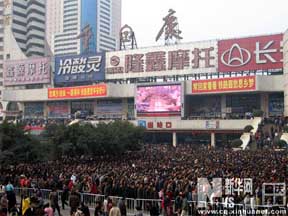


(MOP)
This may be a shock to foreign visitors. However, there is truth in
advertising as shown in this sign at a Dongguan long-distance bus(?)
depot. So maybe they meant to say "Ticketing Hall" but
subconsciously they might recognize that "Ticketing Hell" is more
suitable.
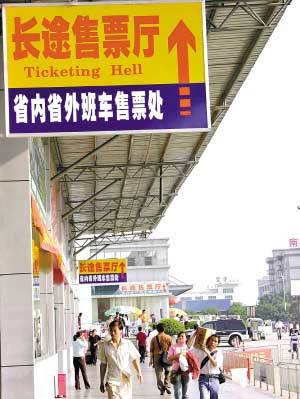
[037] How To Over-Interpret (11/09/2006) (Next Weekly) The problem with getting the flow of history is that things happen every day. Most of these things are not earth-shaking by themselves, but collectively they may represent a huge sea change. So how do you find the anchor points at which such changes can be identified in Hong Kong? On this day, the exercise concerns the lists for funeral committee membership. Six years ago, Chinese People's Political Consultative Committee Vice-chairman An Zijie (
[036] There Is No Silver Buried At This Spot (11/08/2006) (Southern Metropolis Daily) A classical Chinese story is about the man who buried 300 taels of silver at a spot; then he got worried and so he posted a sign: "There is no 300 taels of silver buried at this spot (
[035] This
Diamond Ring (11/08/2006) (United
Daily News; United
Daily News) In the matter of the state secret fund, a diamond
ring played a key role in the decision of the prosecutor Eric Chen.
The diamond ring was purchased by the First Lady Wu Shu-chen on June 13,
2005 at the Tiffany store in Chongshan, Taipei and cost NT$1,327,500.
The ring size was custom-fitted for the First Lady. The receipt was
submitted and then Wu was reimbursed.
On the first interview with the President, the prosecutor Eric Chen asked:
"Did members of the First Family used any state secret funds to
purchase clothing or jewelry for themselves?" The president said:
"No. If something was purchased, then it was used as a
gift. The members of the First Family will not use the funds on
themselves."
On the interview with Wu Shu-chen, the prosecutor asked: "Has President
Chen Shui-bian ever used state secret funds to purchase jewelry and clothing
for you?" She replied: "No."
On the second interview, Eric Chen asked the President: "In the
receipts submitted to seek reimbursement from the state secret funds, there
were some receipts for the First Lady's purchase of diamond ring, clothes,
sunglasses, shoes and so on. How do explain that?" The
President said: "There are two situations. The first situation is
that my wife bought them for herself, and these would be gifts from me to
her. That should be a relatively small amount. The other
situation is that my wife bought them as gifts for foreign guests, or for
occasions such as weddings or funerals."
(China
Times; China
Times) This led to the crazy events yesterday about that
diamond ring. Once the diamond ring was considered a gift from the
President to his wife, then a follow-up question was why was it not declared
as part of the First Family's assets, as required by law? In the
morning yesterday, the President's Office made the statement that Wu
Shu-chen gave the ring to her mother. As such, it was not part of the
First Family's assets and that was why there was no declaration.
Yesterday, Accounting and Statistics Director-General Hsu Jan-yau faced the
Legislature during the day on this subject. There is some unintentional
hilarity in the evasive responses:
Q: Can you use state secret funds to buy a diamond ring for your wife?
A: There are no diamond rings in my home.
Q: Can you use state secret funds to buy a refrigerator for your wife?
A: We buy our own refrigerators.
Q: What about scarves?
A: I don't think my wife uses scarves.
Q: What about clothes?
A: Not allowed (to use state secret funds)
Q: Can you use state secret funds to buy clothing for your mother-in-law?
A: My mother-in-law has passed away.
Q: What should state funds be used for?
A: For state matters.
Q: Therefore buying a diamond ring for Wu Shu-chen or her mother should not
be allowed, because what has that got to do with state matters? Is my
deduction correct?
A: I can agree.
Q: Is buying a diamond ring for your wife a state matter?
A: It should not be.
Q: Can you use state funds to buy a present for your mother-in-law?
A: I don't think that it is allowed.
So there you have it -- it was wrong for the President to use state secret
funds to buy a diamond ring for his mother-in-law. So now the morning
statement from the President's Office is a legal liability. Late in the evening, the President's Office sent out a SMS to the media to
say that the earlier statement about the diamond ring being a gift the First
Lady's mother was "in the process of being verified."
Postscript: The President's Office has decided that since the matter
is now in the legal process, no further comments will be made. That
may be the right thing to do after the huge explosion in the mainstream
media and especially at the Internet forums.
(Apple
Daily) Chronology: The Changing Story of The Diamond Ring
August 7: Bian was interviewed by Eric Chen and denied that the First
Family used state secret fund to buy clothes and jewelry
October 27: Bian was re-interviewed by Eric Chen and admitted that Wu
used Tiffany receipt to get reimbused from state secret fund, which was a
gift from Bian to Wu
November 7 (11:00) Presidential Office said that NT$1.32 million
diamond ring was paid for by the President himself and he obtained the
receipt. Then the diamond was given to Wu's mother as a present
November 7 (12:30) Presidential Office Public Affairs Officer
director David Lee repeated that no state secret fund went into private
pockets; everything was spend on secret diplomatic missions and public
matters.
November 7 (15:00) David Lee said that Wu represented Taiwan to
attend the conference of the league of free political parties in Europe and
the ring was purchased for her. When she came back, it was given to
her mother.
November 7 (17:00) The media pointed out the conference took place in
2001 whereas the receipt was dated September 2005. David Lee was at
a loss for words and promised to investigate
November 7 (18:00) David Lee replied that the story of the
diamond ring has reverted to the one in the morning -- the President bought it
to give to his mother-in-law.
November 7 (22:55) The Presidential Office issued a SMS to the
media to say that "the disposition of the diamond ring needs to be
verified."
November 8 (11:20) Presidential Office deputy Secretary-General
Liu Shih-fang said that the matter is in the legal
process and there no further comments will be made.
[034] Three
Generations (11/08/2006) In her Hong Kong University talk,
Lung Ying-tai spoke about her typical strategy when she meets a Hong Kong
person. She would ask: Tell me about the three generations of your
ancestors (your father, grandfather and great-grandfather). Thus, she
found out interesting historical details about Hong Kong history, as when
someone's ancestor was a Shandong policeman recruited in the 1920's because
he was tall, strong and handsome. Indeed, there was an entire Shandong
police squadron which kept watch in the Victoria Peak area of Hong Kong.
Lung Ying-tai said that she attempted to explain the attitude of Hong Kong
people towards Chen Shui-bian and Taiwan independence. That attitude
is almost universally abhorrence (as indicated by the Hong Kong University
Public Opinion Programme's polls). She used this illustration: In
Taiwan, about 13% of the population came originally from mainland China and
they resent being ostracized by Chen Shui-bian and the people in the Taiwan
independence movement. In Hong Kong, you should imagine that almost
everybody came from mainland China (and there is no such thing as a truly
indigenous Hong Kong person). So how could they possibly like Chen Shui-bian?
In my case, the three generations of ancestors are somewhat in the public
record (Roots - Part 1,
Part
2
[033] Lung
Ying-tai's My Hong Kong Notebook (11/07/2006) On this evening,
Lung Ying-tai gave a speech to a standing-room-only crowd at the Hong Kong
University library. The occasion was the introduction of her
collection of essays about Hong Kong, titled My Hong Kong Notebook.
I was there. The event was divided into three parts. The first
part consists of an 8-minute video that was prepared by RTHK for broadcast
sometime next year, so that this excerpt was a preview. My review:
"very high production value." The second part consists of
readings from Lung Ying-tai's actual working notebook (which is not the same
as the polished essays in the new book). The contents include her
notes on all the strange and unusual things that she came across during her
stay in Hong Kong (for example, where did the name Rednaxela Terrace come
from? (answer: somebody transcribed the name Alexander from right to
left!)). She has the habit of observing these matters and then racing
off to research them.
The third part was interactive with the moderator and the audience.
There was a lot of discussion about identification (with Taiwan, Hong Kong,
mainland China, Macau, 'Nanyang', etc). To my mind, those distinctions
are just word games, for I personally will answer "I am a citizen of
the world" to those kinds of questions. When asked why she was
interested in Hong Kong, she said simply that her world is the
Chinese-language world. When she decided to leave her job in Taipei in
2003, she chose to come to Hong Kong University because it was
unconscionable for someone whose interest is in the Chinese-language world
not know Hong Kong. So she came here and she kept her notebooks
about all the strange and unusual things that was Hong Kong -- this was an
integral part of the Chinese-language world and yet so unlike Taiwan or
mainland China. By the way, she promises that she will try to learn
Cantonese.
This meeting was focused on Hong Kong and the theme of culture.
Therefore, there would only be just a few side jokes about Freezing Point,
Chen Shui-bian and other politically sensitive matters. When asked
where she could chose to stay for the rest of her life, she said, "Oh,
I would like to live in Beijing or Shanghai for a year, but I cannot stay
there too long because the country is a dictatorial state. I could
stay in Vancouver (British Columbia), because it is often rated as the
best in the world in terms of living conditions. However, that would
be impossible for someone who wants to engage with her environment and the
whole Chinese-language world -- it would be so wrong! That leaves Hong
Kong and Taipei. If I have to choose, I guess it will be Taipei.
After all, Chen Shui-bian cannot be around forever, eh?" That
comment drew the loudest applause of the evening.
That leads to this news report in ETToday.

(in translation) "Although this event was the publication of a new book
and the talk was supposed to be about culture and not politics, Lung
Ying-tai can see the situation in Taiwan and she could not help opening fire
from Hong Kong. She said that Taiwan democracy was doing nicely until
President Chen ruined everything. She said that the Taiwan people
managed to transition from the authoritarian era to the democratic era, like
changing from a tank to a new car with an open hood. Unfortunately, they elected Chen Shui-bian who drove the car straight into a
wall. Lung Ying-tai determined that Peking has nothing against the
democratic system in Taiwan, so the waves of anti-Bian activates does not
frighten them. She even thinks that the democratically lagging Hong
Kong can learn from the democratic system in Taiwan. Lung Ying-tai
said that Chen Shui-bian is a negative educational example and the people of
Hong Kong can study it carefully and derive lessons and meaning.
Whereas Lung Ying-tai used to express her discontent with words, it was rare
that she launches an attack from the frontline. This shows how
disappointed she is with politics in Taiwan."
With due respect, this report has nothing to do with the event that I
attended on this evening. I swear that I heard nothing of the sort.
[032] How Does A PR Company Handle Its Own PR? (11/07/2006) In the televised speech of President Chen Shui-bian ( (
[031] Taiwan
By The Numbers (11/07/2006) (China
Times) (707 adults interviewed on the evening of November 6
after President Chen Shui-bian delivered his televised address. A
random sample was drawn from the Taiwan residential telephone directory, and
then the last two digits of the selected numbers were randomized)
Q1. Do you believe that the President's family was involved in
embezzlement/corruption?
Yes 52%; No 14%.
Q2. Do you believe that the prosecutor Eric Chen handled the case fairly?
Yes 51%; No 13%.
Q3. Do you believe that President Chen should resign immediately or wait
until after the trial?
Immediately 46%; after the trial 34%
Q4. Should President Chen go on leave while awaiting trial?
Yes 44%; No 34%
Q5. Overall, how would you rate the President's job performance?
Satisfactory 23%; unsatisfactory 45%
(United Daily
News) (900 adults interviewed on the evening of November 6,
with 279 refusals. A random sample was drawn from the Taiwan
residential telephone directory, and then the last two digits of the
selected numbers were randomized.)
Q1. Chen Shui-bian's job performance as President.
Satisfied 19%; dissatisfied 65%; no opinion 15%
Q2. Did President Chen tell the truth in his "report to the
people"?
Yes 13%; No 55%; no opinion 31%
Q3. Do you believe President Chen's assertion that "NT$14.8 million
went to secret diplomatic missions and not into personal pocket"?
Yes 17%; No 63%; no opinion 19%
Q4. Can you accept that President Chen lied in order to protect
diplomatic secrets?
Yes 21%; No 60%; no opinion 17%
Q5. Should President Chen quit?
Immediately 48%; only if found guilty found after first trial 27%; no
11%; no opinion 13%
Q6. Why did President Chen offer "resignation if found guilty after
first trial"?
Respect for law 27%; delay resignation 55%; no opinion 16%
Q7. Do you support the opposition proposing recall?
Yes 48%; No 33%; no opinion 18%
Q8. Should the Democratic Progressive Party "abandon Bian and save
the party"?
Yes 54%; No 21%; no opinion 24%
(TVBS)
(957 persons interviewed on the evening of November 6, 2006. A random sample was drawn from the Taiwan
residential telephone directory, and then the last four digits of the
selected numbers were randomized.)
Q1. Overall satisfaction with President Chen Shui-bian
Satisfied 12%; dissatisfied 66%; no opinion 23%
Q2. Did you watch President Chen's televised press conference on the state
affairs fund?
Yes 61%; No 39%
Q3. Overall, were you satisfied with President Chen's speech? (base:
those watched it on TV)
Satisfied 20%; dissatisfied 71%; no opinion 10%
Q4. Did you think that President Chen explained the state affairs fund
clearly?
Yes 14%; No 77%; no opinion 10%
Q5. Overall, do you think President Chen's speech?
Yes 59%; No 20%; no opinion 20%
Q6. President Chen said that he did not embezzle money and that he
will be proven right in history. Do you believe that he is clear?
Yes 18%; No 63%; no opinion 19%
[030] Taiwan
By The Numbers (11/06/2006) (TVBS)
(919 persons age 20 or over interviewed on the evening of November 3 after
the announcement of the indictment of the First Lady Wu Shu-chen. A
random sample was drawn from the Taiwan residential telephone directory, and
then the last four digits of the selected numbers were randomized)
Q1. Do you believe that President Chen Shui-bian should quit?
Yes 62%; No 15%; No opinion 23%
[Yes by party affiliation: KMT 91%; PFP 95%; DPP 36%; TSU 29%; independents
50%]
Q2. Concerning whether President Chen Shui-bian should quit or not, what
is the best option in your opinion?
(1) President Chen should resign on his own: 52%
(2) The Democratic Progressive Party should support a recall motion at the
Legislature: 13%
(3) The "Red Army" should go into the streets to bring down Bian:
1%
(4) President Chen should complete his term: 21%
(5) No opinion: 13%
[029] Will Bloggers Give Up? (11/06/2006) (Apple Daily (HK))
知 日 部 屋 has more than 5,000 visitors per day. He believes that Internet speech should be monitored by the blogger and government interference is uncalled for. Concerning the police reaction about Internet speech, he said: "I am displeased. I feel that the entire Internet culture on discourse is being smeared!"[in translation]
"If I post on the Internet to ask people to lay siege to the Legislative Council on July 1st and someone informs the police, will the police come and arrest me?" The blogger at Atheist's Babel Lau Ching pointed out that whereas Internet speech never used to run into the law, nowadays one can step on landmines anytime. "If you write something on the Internet, then it is evidence in black-and-white. The citizens must be very careful about what they write on the Internet."
... A small number of mischief makers have caused popular blogger Benjamin Ng Wai-ming to be pensive. Ng's blog
Benjamin Ng is an associate professor of the Department of Japanese Studies at the Chinese University of Hong Kong [blogger's note: actually, he is a full professor], where he teaches "Introduction to Popular Culture in Japan." His blog advocates "It is better to know Japan than just to adore or hate it" (
哈 日 反 日 不 如 知 日). Since much of this blog carries positive introductions to Japanese culture, he has often been denounced by anti-Japanese netizens and he has even been threatened with "Kill your entire family!" He said that he thought about calling the police but in the end he only deleted that comment and the information about his family on the blog. "I don't want to resort to the law, because freedom of speech on the Internet is so precious.""The Internet has its own culture, and the government should stay out it." Benjamin Ng used the publishing copyrights as example. He criticized the government for leaning towards protecting those who own the copyrights and therefore ignoring the fact it was the commonly shared culture that enabled the Internet to grow so rapidly. He stressed: "If there should come a time that when a blog is sued for copyright infringement every time that it uses an image or music piece, then I shall close down my blog."
To appreciate the last sentence, you only have to glance through Ng's blog, which uses images extensively. It is impossible to discuss Japanese culture with pure text.
[028] Why Did You Apologize? (11/06/2006) (Southern Metropolis Daily) By Wang Shichuan. At the end of a television show on November 3, Taiwan artiste Meng Guangmei took a deep bow and apologized. What were her crimes?
1. She laughed at mainlanders for not closing the restroom doors
2. She disclosed that she "basically gets paid nothing" when she hosts programs on CCTV
3. She said "The Nanjing massacre was a historical incident" and "The Sino-Japanese love-hate relationship will never be resolved"The commentator wonders if there are "crimes":
1. Anyone who has been to rural villages or even small county cities know that not only do people not close their restroom doors, but most of the time there are no doors to close
2. Why hasn't CCTV told us about the fortunes that they pay their program hosts? That should make it clear that Meng was lying!
3. Meng did not deny the importance of the Nanjing massacre. She only pointed out the fact that the Nanjing massacre is a deep scar that will always stand between China and Japan.Such being the case, then why did tens of thousands of Chinese netizens feel scorned, insulted and slighted? Simply put, this is the sub-conscious Ah Q spirit. When Bai Yang's The Ugly Chinese first appeared, people were shocked and depressed, but even more people were hopping back. More than 20 years later, the criticisms by Bai Yang about the "filthiness," "disorderliness" and "noisiness" of the Chinese people are still valid.
Regrettably, Meng Guangmei retreated this time. The basic significance of this storm is the question: Can we tolerate the "honest words" from an artiste? Do we provide enough space for an artiste to say "honest words"?
Relevant Link: Meng Guangmei and Toiletgate: The latest Chinese Internet swarm Jeremy Goldkorn, Danwei
[027] No
Banging Today (11/06/2006) (Apple
Daily) The following photograph was taken by netizen 'rcc00073'
at a HSBC branch in Hung Hom, Kowloon, Hong Kong.
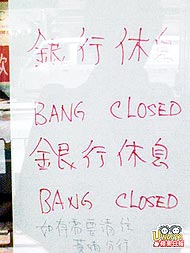
[026] Taiwan
By The Numbers (11/06/2006) (China
Times) (706 adults interviewed on the evening of November
5. An initial sample of telephone numbers were randomly drawn from the
Taipei city telephone directory and then the last two digits of the
telephone numbers were randomized) At issue is the Taipei city mayoral
election, and this poll measures the effect of the indictment of the
President's wife Wu Shu-chen.
In May, Hau Lung-bin (KMT) had 54% support. In mid-June, it became
39%. In mid-October, it dropped to a low of 36%. In late
October, it came back up to 42%. On November 5, Hau has 47% support.
In May, Frank Hsieh (DPP) had 11%. In mid-June, it became 18%.
In late October, it increased to 20%. On November 5, Hsieh has 18%.
James Soong (IND) has 8% support on November 5. It has not
significantly changed over the course of time. Similarly, Li Ao (IND)
is stuck at around 3% while Clara Chou (TSU) is stuck as around 2%.
[025] Follow
The Money (11/06/2006) Once upon a time, in a parking garage
in Washington DC, the source known as "Deep Source" told
Washington Post reporters Carl Bernstein and Bob Woodard to "follow the
money." Overseas Chinese dissident Wang
Xizhe is asking the same question.
Wang's issue is with the indictment against President Chen Shui-bian's wife
Wu Shu-chen. There were six cases offered in which the state secret
funds were used. Of these, the prosecutor Eric Chen determined two to
be authentic, one to be "purely fictional" (namely, the case of
Mister A) and three others not to be pertinent to the matter at all.
Of the two authentic cases, one was for the American public relations
company which threatened to go to work for the Chinese Communists unless
their terms were met. The other authentic case was US$200,000 paid to
overseas Chinese democratic movements.
This got Wang Xizhi riled up. He wants to know which overseas
democratic activists have been on the take from Chen Shui-bian. He
wrote: "
[024] Mister
A (11/05/2006) The matter of the case of Mister A (see Chen
Shui-bian, Mister A and Mister B) is the most
solid part of the case against First Lady Wu Shu-chen and a bunch of
relatives, friends and government officials. In brief, the President
along with the indicted persons engaged in a conspiracy to present to the
prosecutor the story of a Mister A who worked on secret diplomatic
missions. Details such as receipts and payments were concocted after
the investigation began. The physical evidence then showed that Mister
A could not done it (namely, he was physically absent from Taiwan on all
fourteen occasions when the others claimed that they personally took receipts from him or
handed him the money in Taipei). Apart from President Chen
(who is immune from criminal charges as sitting president) and his wife, the
other conspirators have all confessed. The relevant charges are
perjury and falsifying documents.
So what did the President have to say about Mister A in his televised
address of November 5? (
我不是戀棧職位,不必等到三審定讞,只要司法在一審判決貪污有罪,我立即下台一鞠躬! ("I do not want to cling on to the job. We do not have to wait until the final appeal. If found guilty on the corruption charge on the initial trial, I will take a bow and resign!"). Please note that the charges against Wu Shu-chen are (1) corruption/embezzlement; (2) perjury; (3) falsification of documents. The proof on the perjury and falsification of documents seemed incontrovertible in the case of Mister A and a conviction seems inevitable. So the President just took them out of the equation in his speech tonight. He promised to quit only if found guilty on the corruption charge! Even if he committed perjury and falsified documents, they were justifiable, irrelevant and/or inconsequential. Very deft, indeed.... What about the Mister A that people care about? I am genuinely concerned for his life and family property right now. Originally, I told the prosecutor that there are many secrets that I cannot talk about. There are many things that I cannot talk about upon pain of death. As the prosecutor said, some things cannot be talked about even from the grave, because they are so secret. I cannot talk about many things due to the national interests. Even if someone steals the money from us during the diplomatic process, we cannot say anything. That is why diplomacy is so difficult. What can we do? We have a "bad neighbor" over there and such are "my intentions and considerations."
... Some people have said that I must apologize on the matter of the secret diplomatic work of Mister A, no matter whether it was a well-intended or ill-intended lie. But if the lie was well-intended to cover up secret diplomacy, then it is understandable. But let us consider the legal principle of "conflict of obligations." I must consider the national interests foremost, and therefore I was inconsistent and contradictory. This led to misunderstanding by the prosecutor, or it affected the course of justice and the progress of the judicial investigation. I am willing to apologize for that.
In order to conceal the secret diplomatic work and protect the national interests, I dared not tell the prosecutor about certain things that only a small number of colleagues at the National Security Agency know with respect to who said what to whom. I had the best of intentions and I was doing my best. The treatment that I am receiving today and my personal hardship cannot be understood by you. But it does not matter because you chose me as your president and I will endure even greater hardship and grievances.
... I do not want to cling onto the job. We do not have to wait until the final appeal. If found guilty on the corruption charge on the initial trial, I will take a bow and resign!
Listening to the television pundits right now, there are two points that came out strongly with respect to Mister A. First, there is a rumor being floated that Mister A is in mainland China and under the control of the Chinese government. Therefore, he had to send in the fax to deny any involvement in the secret diplomacy, intelligence gathering or receiving payment. But the prosecutor's case is made on the basis of the physical evidence (namely, the dates on the receipts and payment vouchers compared to his entry/exit records to/from Taiwan). The fax is supportive but extraneous. The obvious point is that if Mister A is in big trouble, then who is responsible for putting him into this position? Who asked him to play this role out of personal loyalty? That would be the president himself. At a minimum, the President should have declared categorically Mister A had done none of the things that he and his subordinates presented to the prosecutor, as a principle of personal loyalty. Instead, Mister A is left hanging out there, because President Chen Shui-bian cannot and will not directly admit that he was part of a conspiracy to commit perjury. As a reminder, perjury carries a maximum penlaty of 5 years in prison.
Second, the last translated paragraph is
[023] Horse
Fart Newspaper (11/05/2006) (Ming
Pao) On the morning after the news of the indictment of the
president's wife for embezzlement and falsifying documents, most of the
newspapers printed special sections. At the various convenient stores,
the newspapers were sold out quickly. At 10am, when the reporter went
into a convenience store, the newspaper rack was empty. The salesperson
said that most people were buying several newspapers at the same time.
Certain retail outlets asked the newspapers to print extra copies.
Preliminary estimates are that the circulation was thrice the usual volume.
(ETToday via Yahoo!
News) While almost all of the newspapers in Taiwan carried the
story of the indictments, there was one exception: Youth Daily (published by
the Taiwan military) did not have a single word on the case. When
asked about why this important case was missing, the chief editor said that
this newspaper only reports on the bright side of society and they will not
publish anything that may have political associations or otherwise affect
neutrality. Some legislators are calling this a "horse fart
newspaper (
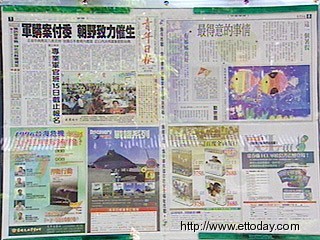
[022] Taiwan
By The Numbers (11/05/2006) (China
Times) (703 adults living in Kaohsiung interviewed on the
evening of November 4, 2006. A random sample was initially selected
from the Kaohsiung telephone directory, and then the last two digits of the
selected numbers are randomized)
In late June, Chen Chu (DPP) had a support level of 24%; in mid-October
after the waning of the anti-Bian demonstrations, her support level rose to
31%. After the indictment of Bian's wife, her support level fell to
23%.
In late June, Huang Jun-yin (KMT) had a support level of 35%; in mid-October
after the waning of the anti-Bian demonstrations, his support level was 37%
with little growth. After the indictment of Bian's wife, his support
level rose to 46%.
Meanwhile, Lo Chih-ming (TSU) continued to hold at
around 3% support level.
The accompanying analysis suggests that Chen Chu is now losing the
independents on account of her pro-Bian position. The Bian issue will
not go away soon.
[021] Mistakes Were Made (11/05/2006) (Address Before a Joint Session of Congress on the State of the Union, President Ronald Reagan, January 27th, 1987) The subject was the Iran-Contra scandal:
But though we've made much progress, I have one major regret: I took a risk with regard to our action in Iran. It did not work, and for that I assume full responsibility. The goals were worthy. I do not believe it was wrong to try to establish contacts with a country of strategic importance or to try to save lives. And certainly it was not wrong to try to secure freedom for our citizens held in barbaric captivity. But we did not achieve what we wished, and serious mistakes were made in trying to do so. We will get to the bottom of this, and I will take whatever action is called for. But in debating the past, we must not deny ourselves the successes of the future. Let it never be said of this generation of Americans that we became so obsessed with failure that we refused to take risks that could further the cause of peace and freedom in the world. Much is at stake here, and the Nation and the world are watching to see if we go forward together in the national interest or if we let partisanship weaken us. And let there be no mistake about American policy: We will not sit idly by if our interests or our friends in the Middle East are threatened, nor will we yield to terrorist blackmail.
The above speech was immortalized because it was made in the passive tense and refused to identify the responsible person(s). Serious mistakes were made, but by whom? Compare this to President Chen Shui-bian's statement in the interview with Financial Times before the prosecutor's office issued the multiple indictments:
Nothing of this seemed to touch Mr Chen. Dodging a question on what damage the string of scandals under his government had done to Taiwans democracy and his political authority, he instead said he and his family had been treated unfairly because of what he called Taiwans excessive press freedom and a lack of responsible reporting.
Only when pondering his own historic legacy did Mr Chen admit some mistakes may have been made. Even if my family members have made some mistakes, we all have to undergo legal scrutiny, Mr Chen said. Sometimes I feel ashamed and feel this is a loss of face. But isnt this also to be cherished as a sign of Taiwans democracy and rule of law? Thus personal liabilities become everyones assets.At this point, it is proper to consider what the family members actually did. Here is the list from the indictment:
(United Daily News) Among the receipts submitted for the state secret fund, the prosecutor discovered purchases of clothing and jewelry (such as diamond rings). Bian insisted that his family members did not purchase these items for themselves; even if they purchased the items, these were gifts for other people. When the prosecutor showed that the diamond ring was customized for the First Lady, Bian changed his tune and said: "I used the state secret fund to buy a gift for her." The prosecutor stated: "Although the state secret fund does not have any regulations against buying gifts for the First Lady, it ought to fall within reasonable bounds. Otherwise, the President can give the entire NT$50 million budget to his family.
(United Daily News) In Wu Shu-chen's part, there were 29 receipts totaling to more than NT$14.9 million on gifts and luxury items, including a Tiffany diamond ring costing more than NT$1 million (partially paid for with a SOGO gift voucher), a diamond ring worth NT$320,000 from Cartier, a scarf worth more than NT$100,000, a sweater worth NT$60-70,000, a pair of sunglasses worthy NT$17,000 and other gold jewelry. Neither Bian nor his wife could explain to whom these 'gifts' were offered.
(United Daily News; United Daily News) Among the receipts for reimbursement from the state secret fund, there were items in which Chen Hsin-yu (the president's daughter), Chen Chih-chung (the president's son) and Chao Chien-ming (the president's son-in-law) made purchases of baby products and gift purchases and dined at restaurants. Among Chen Hsin-yu's items were a NT$44,500 purchase of Disney English-language product and two purchases of NT$38,556 and NT$11,388 of Burberry products. Chao Chien-ming bought a telephone and a NT$10,000+ goose-feather blanket. Chen Chih-chung had NT$2,488 for law textbooks and NT$11,592 for imported female clothes purchased at SOGO. The total sum amounted to NT$340,000 plus. In all cases, they claimed that they did so at the behest of the President. However, they were unable to say whom the gifts were for and whom they dined with. In the indictment, it was pointed out that one cannot purchase gifts for others without knowing their gender, age, position and preferences. Also, at a meal, it was impossible not to know the names of the other parties -- some of the meals involved only two persons, and it would be difficult to have a meal with one other person without knowing his/her names. In the second interview with the prosecutor, the president claimed that he asked his family members to entertain certain people, but he was unable to name anyone. Also, the receipts included purchases of cashmere scarves worth NT$60,000 or 70,000 as gifts, but the President and his wife could not name any of the recipients.
(United Daily News) Given all of the above, the prosecutor nevertheless decided not to indict Chen Hsin-yu, Chen Chi-chung and Chao Chien-ming on the grounds that there was no proof that they personally profited. "It may be that their receipts were used by others. and they did not speak the truth in order to protect their family members." But will the three be charged with perjury? The prosecutor said: "We have not decided." When the reporters pressed on: "But when they testified, they must know that they were lying." The prosecutor said that there was no proof of perjury as such. On behalf of the three, he begged the media to "spare them." To be more precise, the prosecutor said that just because he does not believe them is not the same as they had lied, because there is no proof that they profited. So that was why they have not yet been indicted for perjury.
[020] Newspaper
Readership in Taiwan (11/05/2006) (Liberty
Times) According to AC Nielsen's Media Index report for the
third quarter of 2006, here are the newspaper readership figures among
persons 12-65:
- Liberty Times: 16.3% (2.81 million persons)
- Apple Daily: 13.5% (2.33 million persons)
- United Daily News: 9.6% (1.65 million persons)
- China Times: 8.7% (1.49 million persons)
Technical Note: These figures are based upon the global industry
standard "Yesterday reading question." This begins with a
question such as, "Have you read or looked into any copy of XXX during
the past 7 days (or 30 days or 3 months)?" If yes, then the next
question is: "When was the last time before today that you read or
looked into any issue of XXX?" The answers are classified as
"Yesterday" or "Before yesterday." Anyone who said
"Yesterday" is then classified as a "reader" and counted
in the above readership figures. The reason that readership today
cannot be considered is that it depends on the time of the interview: If I
interviewed you at noon, you still have a chance to read the newspaper
afterwards. So the standard is about "yesterday
readership." The important thing to note is that this is a
readership study and not a circulation study. It does not matter how
many copies were printed, because the study will only count the number of
people who read it. Some newspaper will get more/less readers per copy
than others.
Disclosure: The ACNielsen Media Index is a member of the global
TGI services, which is offered by KMR. There are about 50 TGI services
from around the world. The ESWN blogger is the Chief Technical
Officer of KMR. However, the blogger has no involvement with the
Taiwan Media Index.
[019] An Astonishing Essay For General Enjoyment (11/05/2006) (New Century Net) The Political Tendencies of American Netizens and Their Favorite Websites. By Huang Zhongwang (
[in translation]
Today, a new market research report about Internet media was released. According to NetRatings, 36.6% percent of adult Internet users are supporters of the Republican Party, 30.8% are supporters of the Democratic Party and another 17.3% are Independent.
In recent years, political websites are becoming increasing important in elections. The candidates need the political opinions on the Internet to maintain their image.
The research showed that the most popular website for Republican Internet users was RushLimbaugh.com which was viewed by 84.8% of the people; the number two and three websites are NewsMax.com and BillO'Reilly.com, which are visited by 65.4% of the Republic Internet users. The number four and five websites are respectively DrudgeReport and SaltLakeTribune, used by 59.0% and 57.9% of the Republic Internet users.
For the Democratic Internet users, the top three most popular websites are BlackAmericaWeb.com, AOLBlackVoice and BET.com (Black Entertainment Television), being watched frequently by 79.9%, 64.8% and 58.6%.
The data for the Democratic Internet users do not even pass the laugh test, because these are all websites for black people. Personally, I think that this is a cruel joke that the NCN editors did not catch.
[018] A Postscript to the Chizhou Incident (11/05/2006) To understand this item, you should first review an old post The Chizhou Incident dated June 25, 2005. Then there is this update from Xinmin Wanbao via Wenxue City:
[in translation]
Anhui province deputy governor He Xinxu was placed under "double regulations" for corruption. His downfall was connected to his mistress Xiaohe. On June 17, 2005, He Xinhua was appointed the deputy governor in Anhui province in charge of the major departments of Political Law and National Security while still being the Chizhou City party secretary. On June 25, 2005, He Xinxu was traveling with Xiaohe to the Jiuhua Mountain resort area to celebrate his promotion. While The boss was mad because he was interrupted in the middle of his business and threw a fit. He then turned off his telephone. His dereliction of duty was one of the reasons that led to his eventual dismissal.
[017] You May Be Poor, But You Must Still Have News Value (11/04/2006) (Xici Hutong)
[in translation]
An impoverished student was accept by a university, but he could not afford the tuition fees. His parents were trying to borrow money, but no one was willing to lend money to them . Finally, the naive father went to the media and hoped that they can help. He was received by a reporter.
The reporter asked: "Which university was your son accepted by?"
The father said: "Xian. The third group ..."
The reporter said to himself: "It would be better if it were Peking University or Tsinghua University ..."
The reporter then asked: "Is there anything special about your son? For example, was he physically handicapped? Did he have an accident ...?"
The father said: "My son is nothing special. He is healthy and obedient."
The reporter said to himself: "It would be better if your son were special."
The reporter then asked: "Then are you both healthy?"
The father said: "We are both healthy."
The reporter said to himself: "It would be better if one of you have some special physical problem."
Then the reporter asked the final question: "Is your son the first university student from the village?"
The father said: "No. Three were admitted last year."
After listening to all this, the reporter signed and said: "I cannot help you. I don't think any reporter can help you."
The father asked: "Why?"
The reporter said: "Because you have no news value."
The father said: "I don't understand."
The reporter said: "You may be poor, but you must still have news value."
[016] Bloggers Abroad Open Windows to the World (11/04/2006) (Washington Post) By Delphine Schrank and Jason Ukman. November 3, 2006.
China
http://www.zonaeuropa.com/
On his site EastSouthWestNorth, blogger Roland Soong of Hong Kong aggregates vast amounts of material from Chinese news media and posts it quickly. Although the stories he picks up can seem narrow in theme -- and sometimes bizarre -- they speak volumes about today's China.
[015] Taiwan
By The Numbers (11/04/2006) (Era
TV) (835 persons age 20 or older interviewed on the evening of
November 3, using the telephone directory as base to draw a random sample
and then randomizing the last two digits of the telephone numbers).
Here are the main questions:
Q1. The prosecutor announced that First Lady Wu Shu-chen will be charged
with corruption and falsifying documents. Do you believe that
President Chen Shui-bian should resign on his own?
Yes: 62%; No: 14%; Don't know/no opinion: 24%
Q3. If President Chen Shui-bian does not resign on his own should
the Legislature have a third vote on the recall of the president?
Yes: 56%; No: 27%; Don't know/no opinion: 27%
Q6. Do you believe that the Democratic Progressive Party central
should immediately expel Chen Shui-bian from the party?
Yes: 55%; No: 20%; Don't know/no opinion: 25%
(TVBS)
(919 persons age 20 or above interviewed on the evening of November 3, using
the telephone directory as base and randomizing the last four digits of the
telephone numbers)
Q. As a result of the indictment of the First Lady, do you believe that
President Chen Shui-bian should resign?
Yes: 62%; No: 15%.
[Historical trend:
May 25 (when the president's son-in-law was detained) 47% said the president
should resign and 35% no.
July 12 (when the president's son-in-law was released on bail) 61% said
Bian should resign and 26% no.
September 11 (three days after the sit-in) 64% said he should resign and 22%
no.
September 18 (after the "siege of Taipei") 63% said Bian should
resign and 23% no.
November 23 (after the First Lady Wu Shu-Chen was indicted), 62% said the
president should resign and 15% no.]
Q: How should President Chen leave his post?
He should resign of his own accord: 52%
The Democratic Progressive Party should support the recall vote: 13%
The "Red" army should go into the streets: 1%
The President should finish his term: 21%
No opinion: 13%
(China
Times) (706 adults interviewed on the evening of November 3, using
the telephone directory as base and the randomizing the last four digits of
the telephone numbers)
Q. Are you aware of the indictments in the state funds case?
Yes: 72%; No: 28%
Q. Should President Chen Shui-bian resign after the announced
indictments?
Yes: 54%; No: 17% [among pan-greens, Yes: 30%; No 44%]
Q. Should the Democratic Progressive Party draw a line between the
President and itself?
Yes: 42%; No: 24% [among pan-greens, Yes: 32%; No: 39%]
(United Daily
News) (872 adults (with 469 refusals) interviewed on the evening of
November 3, using the telephone directory as base and randomizing the last
two digits of the telephone numbers)
Q1. The performance of President Chen Shui-bian
Satisfied 16%; dissatisfied 63%; no opinion 19%
Q2. Result of the investigation of the state secret fund?
Satisfied 57%; dissatisfied 14%; no opinion 27%
Q3. The performance of prosecutor Chen Jui-jen
Satisfied 61%; dissatisfied 6%; no opinion 31%
Q4. Should President Chen Shui-bian resign?
Yes 60%; No 21%; no opinion 17%
Q5. Do you support the opposition pushing for another recall?
Yes 50%; No 32%; no opinion 17%
Q6. Do you support the opposition pushing for a no-confidence vote on
the cabinet?
Yes: 37%; No 36%; no opinion 25%
Q7. Do you support the people going into the streets to demand the
resignation of the president?
Yes 40%; No 46%; no opinion 12%
[014]
What Next? (11/04/2006) In Three
Shifts: The Story of a Cleaning Woman in Hong Kong (via Next Weekly
magazine), the detailed description of what a Hong Kong cleaning woman does
on a 12-hour-per-day routine 365-days-a-year caused outrage as to why minimum
wage legislation has not been passed yet (see, for example, Global
Voices Online).
Rationally speaking in the position of an outsourced cleaning company which
employs 13 women to clean 10 buildings at HK$10 per hour, what would they do
if there is minimum wage legislation at HK$30 per hour? Please be
mindful that they had a ironclad contract to perform cleaning for a fixed
sum of money. The economically rational decision would be to dismiss
something like 8 of the workers and make the remaining most productive
workers do all of the work. So how could this legislation do any
favors for the 8 dismissed workers? That was the substance of the
argument of Sung Hon Sang in Comment
200610#015.
Now each of those buildings have several hundreds of occupants. If you
so much as ask each of them to pay HK$30 extra per month to pay for
additional salaries for the cleaners (by describing the present
circumstances of the cleaners as in the Next Weekly article), there should
not even be a blink. I cannot and will not believe that people can be
so cold-hearted, and HK$30 is the price of a standard roast-pork-and-rice
lunch box (or two) or half the price of a movie ticket. And this
additional income (for example, HK$12,000 = HK$30 x 400 occupants assuming
10 occupants per floor in a 40-floor building) should be enough to cover the
wage increase to HK$30/hour.
The problem here is therefore a procedural one. If the minimum wage
legislation is enacted immediately, then the least productive workers will
be laid off. This outcome does not help those people who needs the
most help. There had better be a full package that protects against
that outcome.
[013] Positive Spin (11/04/2006) (Southern Metropolis Daily) In the matter (see Permalink) of the image of Japanese porn actress Minori Aoi's image being used as nurse in a Suzhou poster about the World Healthy Cities Alliance Conference, here are some comments from Chinese blogger
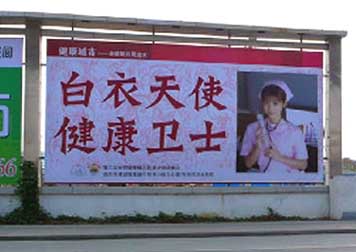
汉奸)." On our Internet, we do not lack talented people![in translation]
1. Media have become freer as a result. Newspapers and television all showed the original poster of the Japanese porn actress. With the Internet probing the edges, the mainstream media have now followed the lead. What can we do? Eyeballs are the forces of production.

2. Officials have the lofty spirit of internationalism. A netizen said: "You may not have seen this actress, but then have you even seen such a big needle? You take one look and you know that it is not meant for an injection!" This is clearly an unprofessional opinion, because an intravenous injection is obviously that big. Therefore we did not doubt the professional quality of the health officials. Instead we should praise their spirit of internationalism.
3. Anything that was not discovered must be rational. The reporters asked, "If this is an adult video actress, then the poster must have violated the copyrights on her personal image?" A person-in-charge said: "If no one asked about this, then there is no violation of copyrights. Besides, most people won't be able to recognized who this is." This fantastic logic of reasoning is the best interpretation of our piracy industry.
4. People have unlimited imagination. After this affair became public, there were many discussion topics that you don't whether to laugh or cry about. Apart from the connection between porn actresses and nurses, the main one is naturally the never-ending nationalistic chauvinism, with people suspecting that the ad producer was a "Chinese traitor (
5. The government is becoming much more efficient. From the time the local television station reported this item through the news forums wondering whether Mr. Mao will be "fixed" by his wife through the finish of the World Healthy Cities Alliance Conference to the ultimate removal of the poster, it only took one week. This is a miracle. We request that the relevant department apply for a Guinness World Record for the quickest response by a government department in China.
[012] Media Coverage in Taiwan (11/3/2006) On this day, the big news in Taiwan is obviously the indictments in the national secret funds case. As an avid news reader, this is what I found at the principal sources. The political overtones are less interesting than business know-how in the Internet age.
(Reuters) Government prosecutors will file corruption charges against Taiwan's first lady, Wu Shu-chen, along with other officials in the government of President Chen Shui-bian, the high court prosecutor said on Friday. The high court will charge Chen's wife with corruption, faking evidence and faking documents in the case, involving the misuse of more than T$14.8 million ($448,500) the prosecutor's office said in a statement. Wu has previously denied any wrongdoing. Others that the prosecutor plans to file charges against include Ma Yong-cheng, a former close aide to Chen, according to the statement. The filing of charges stems from a case involving Chen and those around him, and their possible under-documented use of funds from a special state affairs budget.
At the online edition of China Times, this was plastered all over the front page with lengthy stories covering the indictments (including a full document in PDF format for downloading), background, investigation and reactions. Comment 200611#010 was summarized from China Times.
At the online edition of United Daily News, this was also plastered all over the front page as well.
Apple Daily has a website that does not get updated during the day (that is to say, the news reports are static for the entire day). On this historical day, Apple Daily published an extra printed edition as well as updated the website to include several long stories. In addition, the indictment documents were also downloadable.
Liberty Times also has a website that does not get updated during the day. Thus, one cannot find nothing about this development on the website. Instead, the top story was about the threat against the manager of the La New Bears baseball team.
So which of these newspapers 'get' the new media landscape?
[011]
Mister A (11/3/2006) (TVBS)
In the item underneath, the Taiwan national secret funds case contains a reference
to six secret diplomatic missions, of which the prosecutor determined one
case to be false.
That particular case is the Southern Route Project. At the time, the
Presidential Office's former bureau chief Tseng Tien-tsu, the First Lady's
friend Lee Bi-chun, Presidential Office manager Lin Te-hsu and Presidential
Office treasurer Chen Cheng-hwei all indicated that NT$6 million had been
spent for the project. When President Chen Shui-bian was interviewed
the first time, he referred to a certain Mister A as the Southern Route
Project's asset. When President Chen Shui-bian was interviewed the
second time, he wrote down the name of Mister A as Taiwan businessman Kung
Chin-yuan.
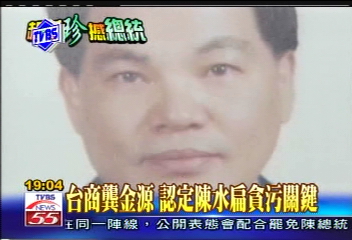
Subsequently, the investigators summoned Kung Chin-yuan six times for
questioning, but he declined to appear. Finally, Kung Chin-yuan sent
in a fax from overseas to state that "I and my wife have never received
any national secret fees and we have never done anything such as carrying out
the Southern Route Project or collecting intelligence in mainland
China."
With the new information, the prosecutor summoned the four defendants
again. He spoke first to Tseng Tien-tsu and told him about Kung's
statement. At that point, Tseng admitted to falsifying evidence.
Subsequently, Lee Bi-chun, Lin Te-shu and Chen Cheng-hwei all confessed
after realizing that others had confessed.
(China
Times) The investigators said that each of the receipts was
checked from its birthday (the time when it was printed) to its death (when
it entered the Presidential Office). For Mister A, there were 52
receipts, all of which were issued in Taipei at a
time when Mr. A was out of the country according to entry/exit
information. This was evidence that this overseas diplomatic project
was fictional.
[010]
The National Secret Funds Breakthrough (11/3/2006) (China
Times) Five persons were indicted in Taiwan for abuse of national
secret funds: President Chen Shui-bian, his wife Wu Shu-chen, former
President's Deputy Secretary-General Ma Yong-cheng, Presidential Office Manager Lin Te-hsu
and Presidential Office treasurer Chen Cheng-hwei. The latter four will
be prosecuted. But President Chen Shui-bian has immunity given that he is the
current President, so he will be prosecuted once his term expires in 2008
for abuse of funds and falsifying evidence. Two other persons (the
Presidential Office's former bureau Tseng Tien-tsu and the First Lady's
friend Lee Bi-chun) were indicted, but their prosecution have been deferred
for two years pending good behavior.
According to the prosecutor, President Chen Shui-bian was interviewed on
August 7 and October 27 while Wu Shu-chen was interviewed on August 7.
Concerning President Chen Shui-bian's claim that the money was spent on six
secret diplomatic missions, the investigators determined that two missions
existed, one did not exist (concerning a Mr. A) and the other three were
irrelevant to the case of the national secret funds.
Concerning the portion of the indictment about Wu Shu-cheng, it was determined that she
claimed NT$14,800,408 from the national secret funds using the receipts from other people. Lin Te-hsu
and Chen Cheng-wei assisted her to falsify the documentation.
In order to reduce the amount of receipts accounted for by Wu Shu-cheng, it
was claimed falsely to the investigators that NT$9 million had been used for
a Mr A who was working on a secret diplomatic mission on behalf of the
president, and another NT$3.2 million was used in another secret diplomatic
mission ordered by President Chen.
On October 31, the evidence was shown to the accomplices and they admitted
that they had forged the evidence. At that point, the prosecutor
decided that the investigation was concluded and therefore issued the
indictments today. The time of the announcement was 3pm on a Friday,
after the stock market closed at 1:30pm.
In the entire case, a total of NT$26,758,452 in receipts were provided by Wu
Shu-chen to claim money from the national secret funds. Apart from
the money paid to the US public relations company as well as the department
store gift vouchers used to claim for money given to overseas democratic
organizations totaling NT$19,500,055, the rest of the money went to Wu
Shu-chen, who will be charged with abuse of state funds. Wu Chen-yu,
Ma Yong-cheng and Lin Te-hsu were indicted with forgery of documents.
Lin Te-hsu and Chen Cheng-hwei were indicted for forgery of evidence.
President Chen Shui-bian would have been indicted for abuse of state funds
and falsifying evidence except that he has immunity under the constitution.
Relevant Link: The Complete Indictment
(in Chinese); plus Excel spreadsheet of
the receipts.
[009] Fluid
Dynamics (11/02/2006) Fluid moves smoothly and adapts its
shape and velocity in accordance with the environment. November 1 was
the first day that the new regulations about banning certain health-related
advertisements (about male potency products, sexually transmitted diseases,
etc) in newspapers. Beijing
News reviewed the contents of several local newspapers on Day One.
No, those health-related ads did not disappear altogether. Instead,
the advertisers/newspapers are playing word games. Instead of the
former "Professional painless abortion (

[008] Next
Media Boss Apologizes About Gillian Chung Photos (11/02/2006)
In August, Next Media's EasyFinder magazine published some sneak photographs
of entertainer Gillian Chung changing her clothes backstage. A
total of 2,621 complaints were received against the magazine.
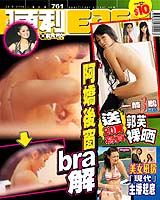
(Ming Pao;
Ming Pao)
On a cable television show, Next Media boss Jimmy Lai was asked about the
incident. Previously, he had said nothing and it was even rumored that
he was unrepentant. On the show, he apologized for the incident to the
people who are affected. As the chairman of his company, he said that
this may be the time to evaluate what they are doing. The issue is not
solely procedural, but the general practice of news gathering today.
His organization needs to consider whether it wants to maintain its style of
being "sensationalistic, acerbic, even despicable" (
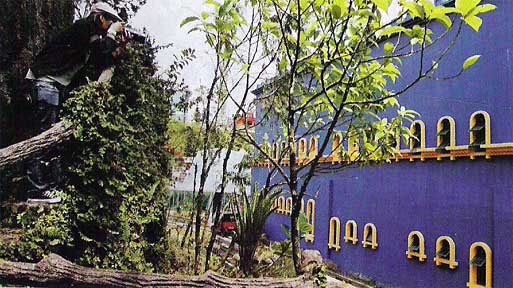

[007] Mass
Panic in Yancheng (11/02/2006) (Xian Wanbao via Sohu.com;
Ming Pao)
A citizen claimed that on the morning of October 25, two male elementary
school students were kidnapped by four strangers in front of the
school. Later, the two kidnapped students re-appeared in front of the
school lying unconscious on the ground. Their eyes were covered by
bandage and they had 2,000 RMB in their pockets. Their cornea had been
removed. This was sufficient to cause a total mass panic as parents
watched anxiously over their children all day.
According to the police, there has been no report of any such
incident. According to medical experts, the cornea transplants are
very delicate operations and those skills do not exist in Yancheng.
The public security bureau is investigating where the rumor came from.
Oh, is this the usual bored Internet forum visitor again? No, it was
the local newspaper Kuai Bao (
[006] Taiwan
By The Numbers (11/02/2006) (China
Times/The Journalist) This is a somewhat unusual opinion
poll. The target universe is the 85 legislators from the Democratic
Progressive Party. Of these, 15 could not be reached. Of the 70
that were contacted, 21 declined to participate. Thus, the following
opinion results are based upon 49 DPP legislators.
Q1: If the investigative report about the national security funds shows
that President Chen Shui-bian was involved in corruption, does he have to
quit?
- Yes (33)
- No (10)
- Other (6) (e.g. he needs to stop exercising presidential power
immediately)
Q2. If Chen Shui-bian was involved in corruption but refuses to quit,
what do you think should be done?
- Recall vote (12)
- Censure vote (3)
- He should know when to stay or leave (14)
- Other (20) [7 said "DPP will take appropriate action"; 4 said
"I've never thought about this" or "This will never
happen")
Q3. If Bian passes but his wife Wu Shu-chen is prosecuted, then does Bian
have to quit?
- Yes (13)
- No (14)
- Other (22) (8 said they have to consider factors such as "Did the
president know beforehand?" "Did the president approve?"
"What are the charges?" "Did Wu Shu-jen took the money for
personal expenses?" and so on; 4 said that they will respect Bian's
personal decision; 3 refused to imagine that it was possible for Wu to be
prosecuted and Bian not to be).
More quotes:
"If Wu Shu-chen was really involved, then Chen Shui-bian must
quit. Husband and wife are together in it! I don't believe it
can be separated so cleanly. We are not like the KMT. We demand
the highest moral standard from the president."
"We only know the First Lady's health is not good, and so her thinking
process may be different from ordinary people. Since the constitution
does not spell out that the president should quit because of what his wife
did, we do not have to use the highest moral standard to judge the
president."
"Sometimes the husband does not know what the wife does."
"Why can't we trust the man? He said so himself that he did not
do it."
"Nothing will happen to the president, or else I would quit politics a
long time ago."
"From the beginning, the fairness of the investigators has been
suspect. With the media hyping, the sentence has been pronounced
before the trial. Even if the report comes out, its content cannot be
trusted."
"Being indicted is not the same as being guilty. The judicial
process needs to go through the three stages (initial trial, first appeal
and final appeal). Only then does the DPP have to decide on the
question of whether Chen Shui-bian needs to quit."
"If the president is held accountable for the national security fund,
then how come Ma Ying-jeou was not held accountable for the special
fund? The outside world cannot have double standards for the
opposition and the President."
[005] October
2006 Website
Statistics (11/02/2006) For the month of October 2006, the total
website statistics were:
- 3,899,916 hits (including htm, jpg, gif, wmv, xml, etc)
- 481.102 page views (htm files only)
- 442,299 unique sessions
- total time spent = 82,125 hours
On an average daily basis:
- 122,610 hits
- 15,522 page views
- 14,267 unique sessions
- 11:08 time spent per unique session
[004] Media
Worker Gets Punished (11/01/2006) (Ming
Pao) Previously, it was reported an Indonesian national named Yuyun Triyuliarti
was arrested in the Hong Kong's Queen Mary Hospital Intensive Care Unit
wearing a surgical mask and a hidden pinhole camera to take photographs of
entertainment celebrity Lydia Shum (see Comment
200610#028).

In court yesterday, the defendant has pleaded guilty. The magistrate
determined that the defendant had obviously planned the action carefully,
and therefore sentenced her to four weeks in jail.
The 'media worker' in the title refers to a 'worker' for the 'media.'
Specifically, Yuyun Triyuliarti was a domestic helper for a deputy chief
editor at EastWeek. Her employer is presently on leave but not charged
since Yuyun has not said who instructed her to act. The most obvious
speculation is that her employer instructed her to do so, and it will be
morally reprehensible that the employer gets off scott-free. That may
be a legally correct outcome, but it is morally unjust.
[003] I
Love Big Needle (11/01/2006) (Beifang Xinbao via 163.com)
The Second Annual World Healthy Cities Alliance was being held in the city
of Suzhou, October 28-30. The following poster appeared in Suzhou,
showing a smiling nurse holding a big needle. The words say:
"White=dressed guardian angel. Protector of health."
So who is this nurse? Was
this an authorized usage? Or was it intellectual property rights
violation?

It turns out that the photograph was ripped from the Japanese adult video Nurse
Go! Go! (aka I Love Big Needle) and the nurse was Japanese porn
actress Minori Aoi.

After the revelation got posted on the Internet, the poster was taken down
quickly. Here is the really astonishing part -- the reporter knew what
who the nurse was but he just intercepted people in the street. Who is
the nurse? The responses were like: "Well, she looked awfully
familiar. I know I must have seen her somewhere ..."
[002] Doctors and Prostitutes (11/01/2006) (
[in translation]
When I go out, I hate queues. When I see a long queue, I get intimidated and I would walk away unless it was unavoidable. What is unavoidable? For example, IT premiere sales, dining at Open Rice, testing the Ngong Ping 360 Cable Tram (no Internet ticket sales as yet), etc seem to require getting on queues. If you want something that is good or cheap, you will probably have to pay the price of queuing.
Actually, there are certain unique selling points (either good or cheap) about places with long queues, or else the consumers will give up because they think it is a waste of time. Management scholar David Maister believes that the longer the service time or the higher the price, the longer the customer is willing to wait. To be frank, as long as the customer thinks he is getting his money's worth, he has no problem with waiting longer.
I have tried to read Maister from another angle. If the customer has to wait longer, is it possible to raise the price (or value)? The pre-supposition is that the service must have some unique selling points.
Look at these two examples:
1. A specialist medical doctor. Specialist R has a densely packed appointment schedule every day. But he has a habit of always showing up late. R admitted frankly that he was not being lazy, but he has discovered a phenomenon. Every time that a patient is made to wait longer, there is no complaint because the doctor is thought to be delayed on account of ward tours or meetings. In addition to forgiving him, the patient takes this as evidence that the doctor is of 'high quality.' In the patient's view, longer ward tours mean that the doctor has many patients and this builds up confidence; numerous meetings means that he "must be formidable" in his professional field. Based upon the above reasons, there is every advantage in being tardy. Indeed, revenues have increased every year and R adheres to this golden rule.
2. A single-prostitute brothel. Social worker J handles cases involving sex workers. One day, she paid a surprise visit to a prostitute who worked by herself in an apartment. Since it was prime time, the customers were lined up outside the apartment and so J had to come back another day. Later, J chatted with the prostitute who said that it was misleading. Although she was busy that night, she decided to take more time in her business service and made the customers wait longer. This had the indirect effect of "advertising" and therefore she can raise the price. But J pointed out that this prostitute was pretty good looking.
This proves once more that there are no noble versus ignoble occupations. There are only smart and dumb people, and only brains matter.
This reminds me of "Threshold Models of Diversity: Chinese Restaurants, Residential Segregation and the Spiral of Silence" by Mark Granovetter and Roland Soong ( note: with the footnote "The authors are listed alphabetically" meaning that Roland Soong is considered to be the major contributor). In Clifford Clogg, ed., Sociological Methodology , pp. 69-104, 1988 (see Adobe pdf). Eighteen years later today, that article is tough to read even for its major contributor. You will have to remember that it was written in an era in which it was fashionable to talk about dynamical systems, chaos theory, fractals, self-similarity, etc. The relevant part is about the "Chinese restaurants" which was not articulated adequately in the article. Here is the notion: You visit Chinatown and you don't know which restaurant to go into (because they all look the same). What will you do? You peek through the windows -- if there is no one inside, then maybe this is a signal that the restaurant is terrible; if the queue goes around the block, then no food can possibly justify a two-hour wait; therefore, you want a restaurant that is neither too vacant nor too busy. In other words, the length of the queue or the waiting time becomes a signal for quality.
[001] Learning Democracy (11/01/2006) In reading the writings of the New Right intellectuals in China, it has always struck me how much they admired America. I have always sarcastically noted that if they want America to be the model for a new China, then they should try to copy everything. In this previous post, I noted how the United States regularly interfere in the domestic affairs of other countries. I asked: "What is this rubbish about autonomy, national sovereignty and self-determination in democratic countries then?" This week, there is even a more blatant and systematic example in the presidential election in Nicaragua on November 5 (CounterPunch):
Nicaragua is currently gearing up for its national elections on Sunday, November 5. For the last year, Nicaragua's complicated electoral panorama has been further convoluted by a string of U.S. representatives endeavoring to ward off an electoral victory by Sandinista (FSLN) leader and former president Daniel Ortega. U.S. officials have publicly censured Ortega, attempted to unify his opposition, and threatened that an Ortega win would endanger U.S. financial support. The continuous intervention, however, has failed to unite Nicaragua's divided right or significantly detract from Ortega's base. Now U.S. meddlers are flustered and desperate in the face of recent polls revealing that Ortega is within a few percentage points of clinching the presidential office.
In a last-ditch effort to undermine Ortega, U.S. Congressman Dana Rohrabacher, chairman of the House's International Relations Subcommittee on Oversight and Investigation, sent a letter on Friday, October 27, to Michael Chertoff, Secretary of Homeland Security. Rohrabacher enjoined Chertoff "to prepare in accordance with U.S. law, contingency plans to block any further money remittances from being sent to Nicaragua in the event that the FSLN enters government." The nearly half million Nicaraguans currently living in the U.S. send around $500 million each year to their family members in Nicaragua, according to Nicaraguan economist Nestor Avendaño.... Rohrabacher's letter is but one voice in a recent cacophony of U.S. meddling. Headlines of the last week have been laden with unsolicited U.S. opinions on Daniel Ortega and the sort of President Nicaraguans should want. The day after Rohrabacher sent his letter, Florida governor Jeb Bush authored a letter published in a La Prensa paid ad. Bush's letter declares that Nicaraguans must choose between a "tragic step towards the past," which he identifies as the "totalitarianism" of the Sandinistas, and "a vision towards the future." Jeb Bush's own vision for Nicaragua's future is revealed at the bottom of the ad, where the Alianza Liberal Nicaraguense party, which is running the U.S.-preferred presidential candidate Eduardo Montealegre, is named as the ad's sponsor.
Just a few pages away from Bush's ad appears an article in which Adolfo Franco, USAID's Assistant Administrator for Latin America and the Caribbean, warns that a FSLN victory next week could limit USAID support for Nicaragua, citing worries that Daniel Ortega might significantly alter Nicaragua's current economic model. USAID's admonition piggybacks on US Secretary of Commerce Carlos Gutierrez's more explicit pressure in an interview publicized one week earlier. Gutierrez threatened that an Ortega win could preclude a $230 million combined investment from three foreign companies that would generate 123,000 jobs, a $220 million aid package promised through the Millennium Challenge Account, and implementation of CAFTA in Nicaragua.
On October 29, the day after printing Jeb Bush's letter, La Prensa published an editorial by Otto Reich, former Assistant Secretary of State for Western Hemisphere Affairs, in which he accuses the FSLN of maintaining ties with terrorist groups, a claim that Reich does not attempt to substantiate. Though Reich does not currently hold a position in the U.S. government, he writes as if he does, stating, "If the Sandinistas control the government of Nicaragua, there will be strong pressure in Washington to review all aspects of the bilateral relationship, including remittances." Reich equates a Sandinista victory with "a return to a past of poverty and international isolation." Such a dismal outcome indeed seems likely if the U.S., as the party responsible for the isolation of the past, would implement Reich's thinly cloaked threat of aid and remittance cutoffs.Ironically, Reich precedes all the above statements with the disclaimer, "No one can tell [Nicaraguans] who to vote for." Jeb Bush, Adolfo Franco, and other outspoken U.S. figures have similarly acknowledged Nicaraguans' sovereign right to pick their own leaders. Unfortunately, such statements come across as meaningless niceties when subsequently contradicted with threats and admonishments against choosing a president not to the U.S.'s liking. As Nicaraguans make their way to the polls on Sunday, they must not only consider "What will this candidate do for my country if elected?" but also "What will the U.S. do to my country if this candidate is elected?" The product of relentless outside interference, this sad reality is profoundly undemocratic.
Archives